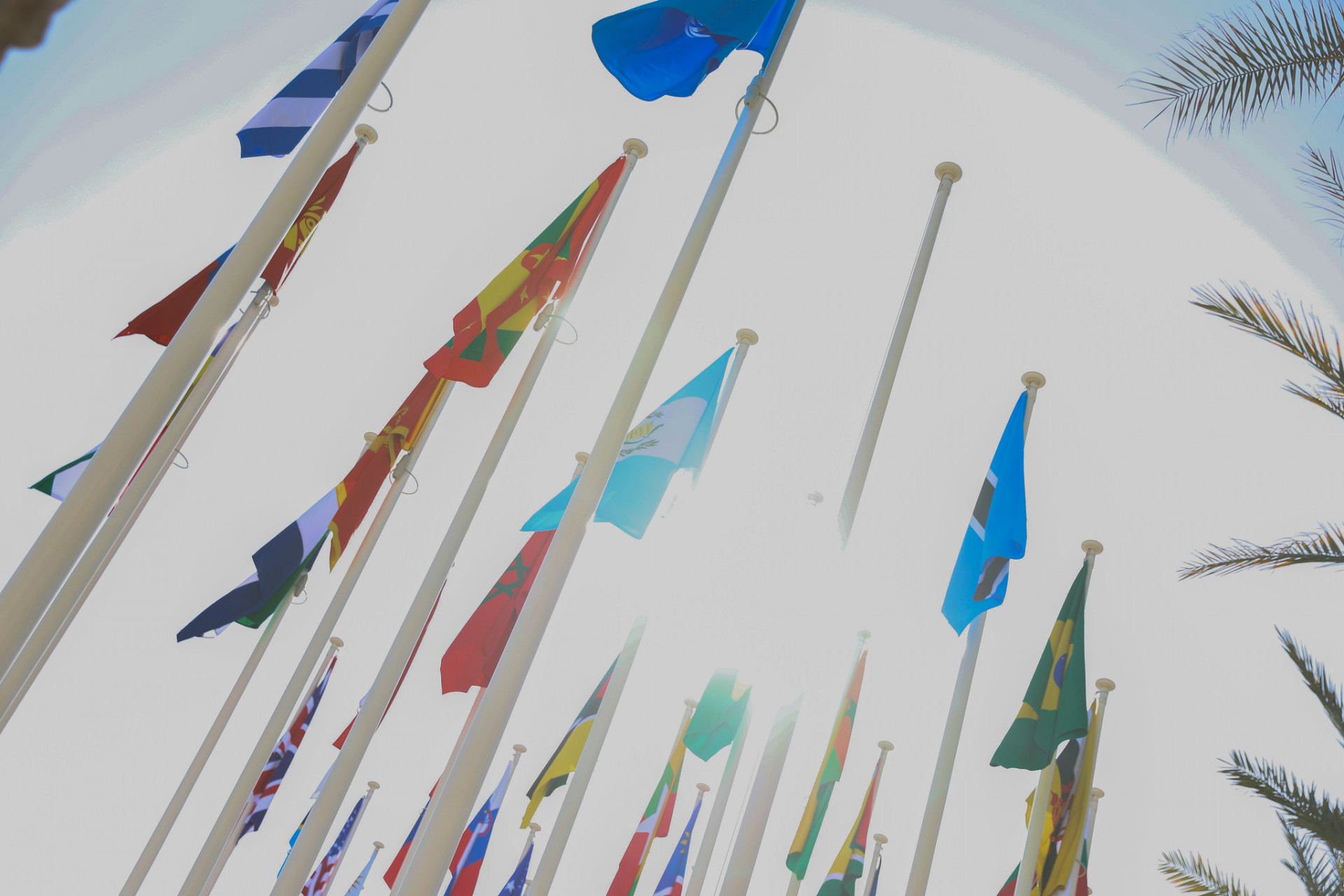
The COP28 UN Climate Change Conference in Dubai, the United Arab Emirates, was the biggest of its kind. Some 85,000 participants, including more than 150 Heads of State and Government, were among the representatives of national delegations, civil society, business, Indigenous Peoples, youth, philanthropy, and international organizations in attendance at the Conference from 30 November to 13 December 2023.
COP28 was particularly momentous as it marked the conclusion of the first ‘global stocktake’ of the world’s efforts to address climate change under the Paris Agreement. Having shown that progress was too slow across all areas of climate action – from reducing greenhouse gas emissions, to strengthening resilience to a changing climate, to getting the financial and technological support to vulnerable nations – countries responded with a decision on how to accelerate action across all areas by 2030. This includes a call on governments to speed up the transition away from fossil fuels to renewables such as wind and solar power in their next round of climate commitments.
Find out more about the significance of this crucial decision, the key highlights from COP28 that marked major steps forward in the global effort to address the climate emergency, and some of the challenges and opportunities heading into 2024 and beyond.
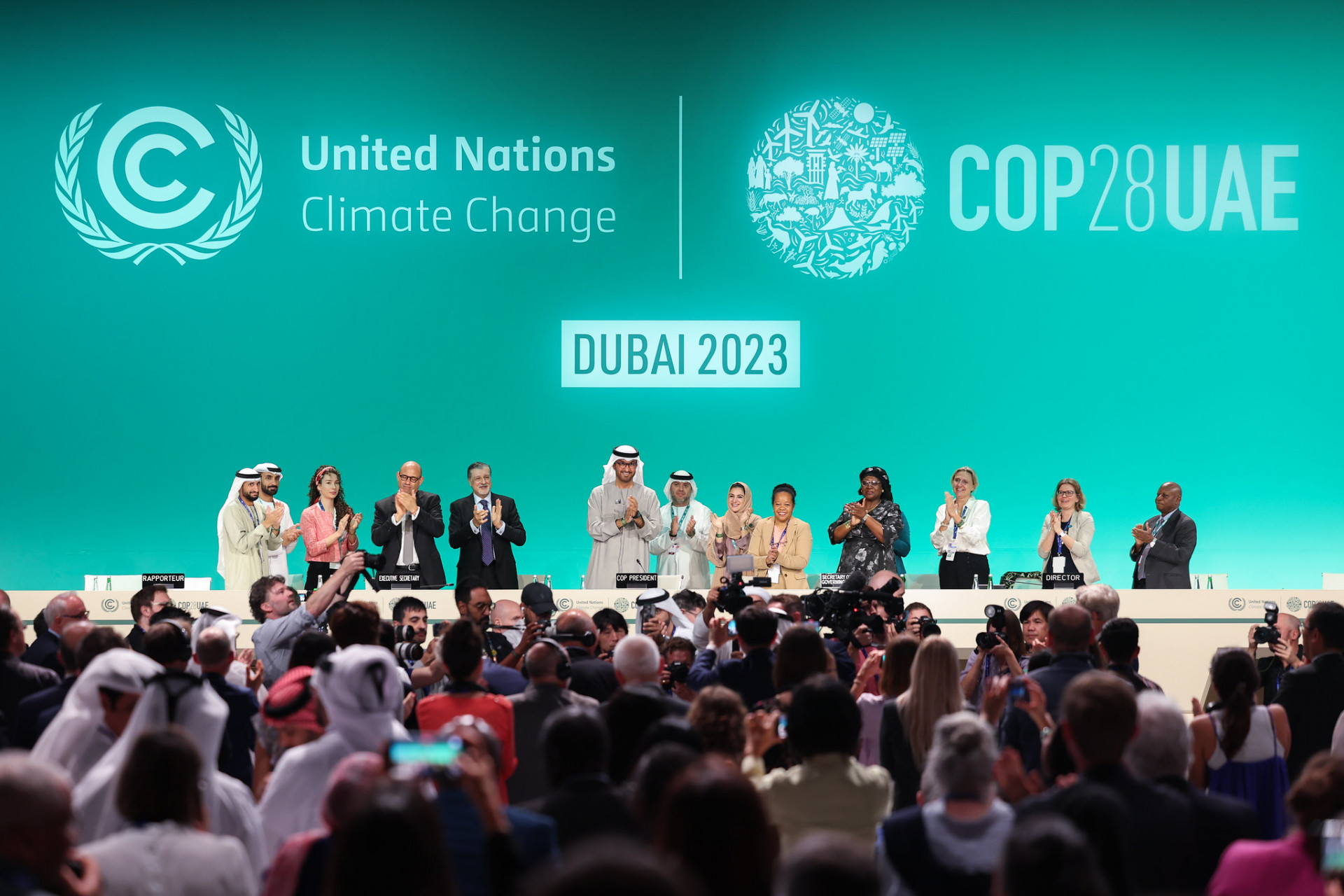
COP28 closed today with an agreement that signals the “beginning of the end” of the fossil fuel era by laying the ground for a swift, just and equitable transition, underpinned by deep emissions cuts and scaled-up finance.
In a demonstration of global solidarity, negotiators from nearly 200 Parties came together in Dubai with a decision on the world’s first ‘global stocktake’ to ratchet up climate action before the end of the decade – with the overarching aim to keep the global temperature limit of 1.5°C within reach.
“Whilst we didn’t turn the page on the fossil fuel era in Dubai, this outcome is the beginning of the end,” said UN Climate Change Executive Secretary Simon Stiell in his closing speech. “Now all governments and businesses need to turn these pledges into real-economy outcomes, without delay.”
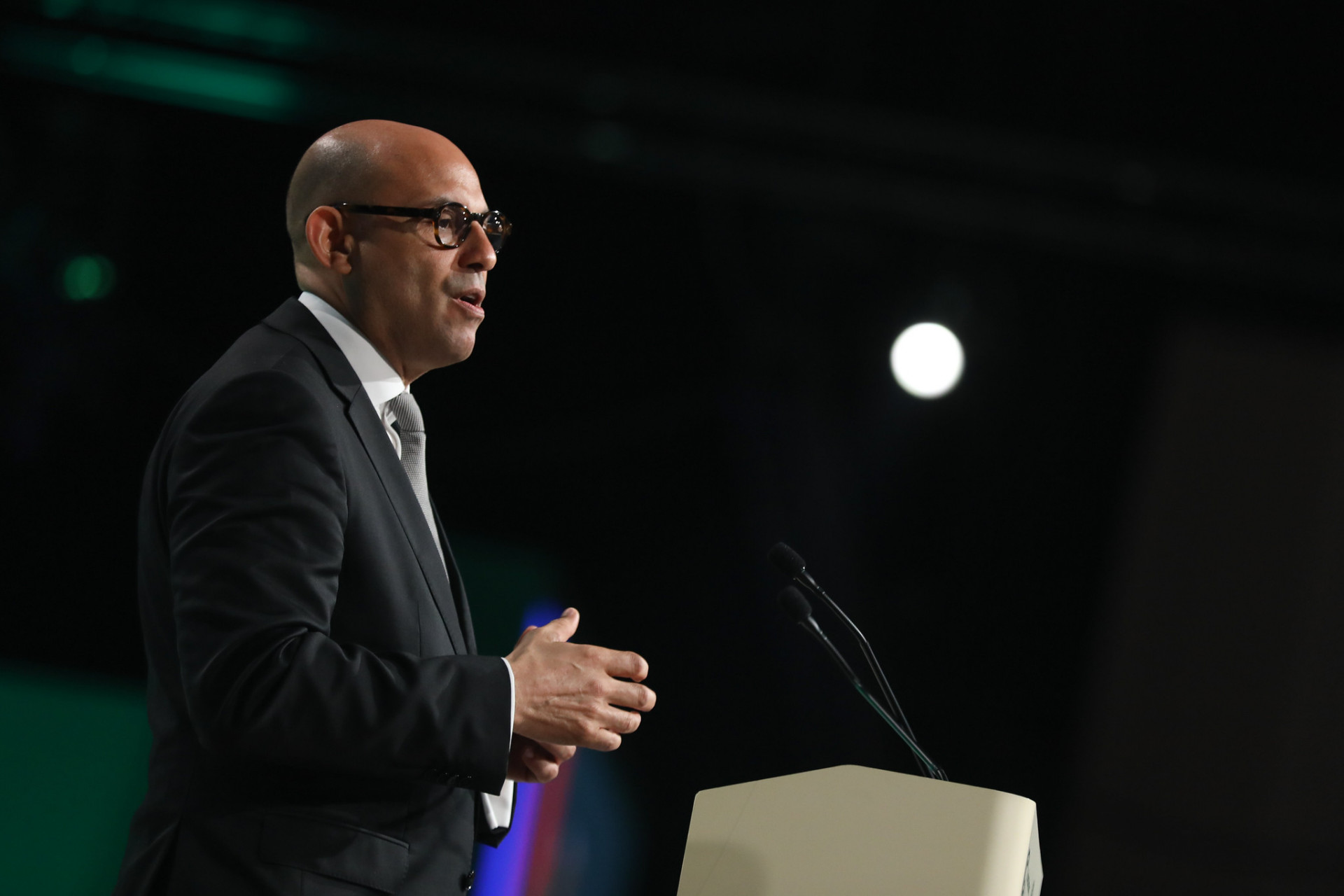
In his closing address at COP28, UN Climate Change Executive Secretary Simon Stiell lamented the lack of a clear signal to end the fossil fuel era, stating that while a complete turn of the page was not achieved in Dubai, the outcome marks "the beginning of the end" for fossil fuels.
He praised the COP28 outcome for tripling renewable energy targets, doubling energy efficiency goals, establishing a Global Goal on Adaptation framework, and operationalizing the loss and damage fund. He emphasized that these initiatives are a lifeline, not a finish line, and called on governments and businesses to immediately translate pledges into tangible actions.
Stiell stressed the need for faster progress, urging countries to submit ambitious national climate plans that are in line with a 1.5-degree pathway. He further acknowledged the crucial role of ordinary people in driving climate action, and concluded by stating that UN Climate Change remains committed to supporting every step of the journey in the race to a sustainable future.
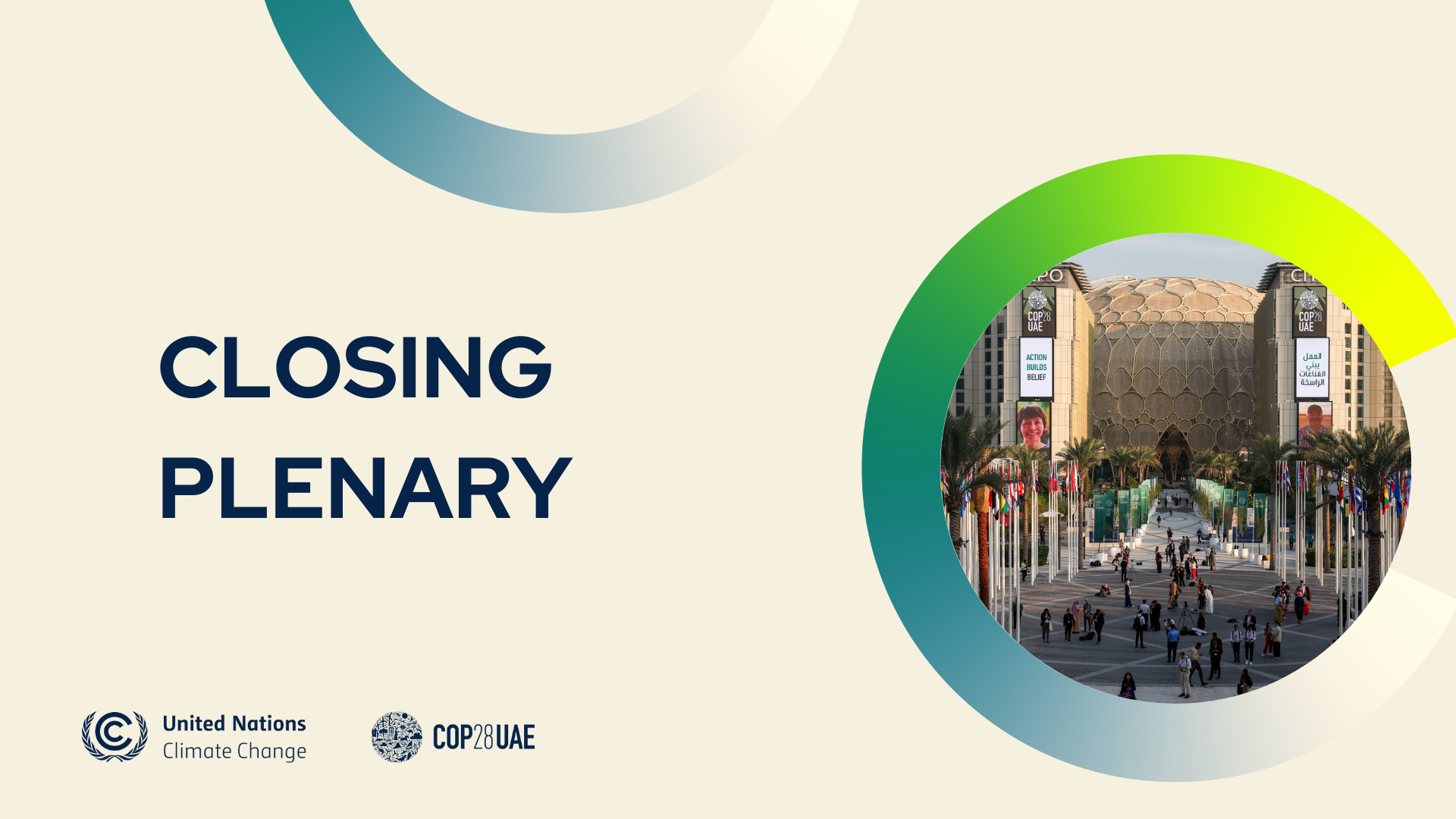
A plenary session is expected to begin at 10:30am to discuss the adoption of the COP28 flagship text.
With the clock ticking, the pressure is mounting on negotiators to reach a consensus on a final agreement.
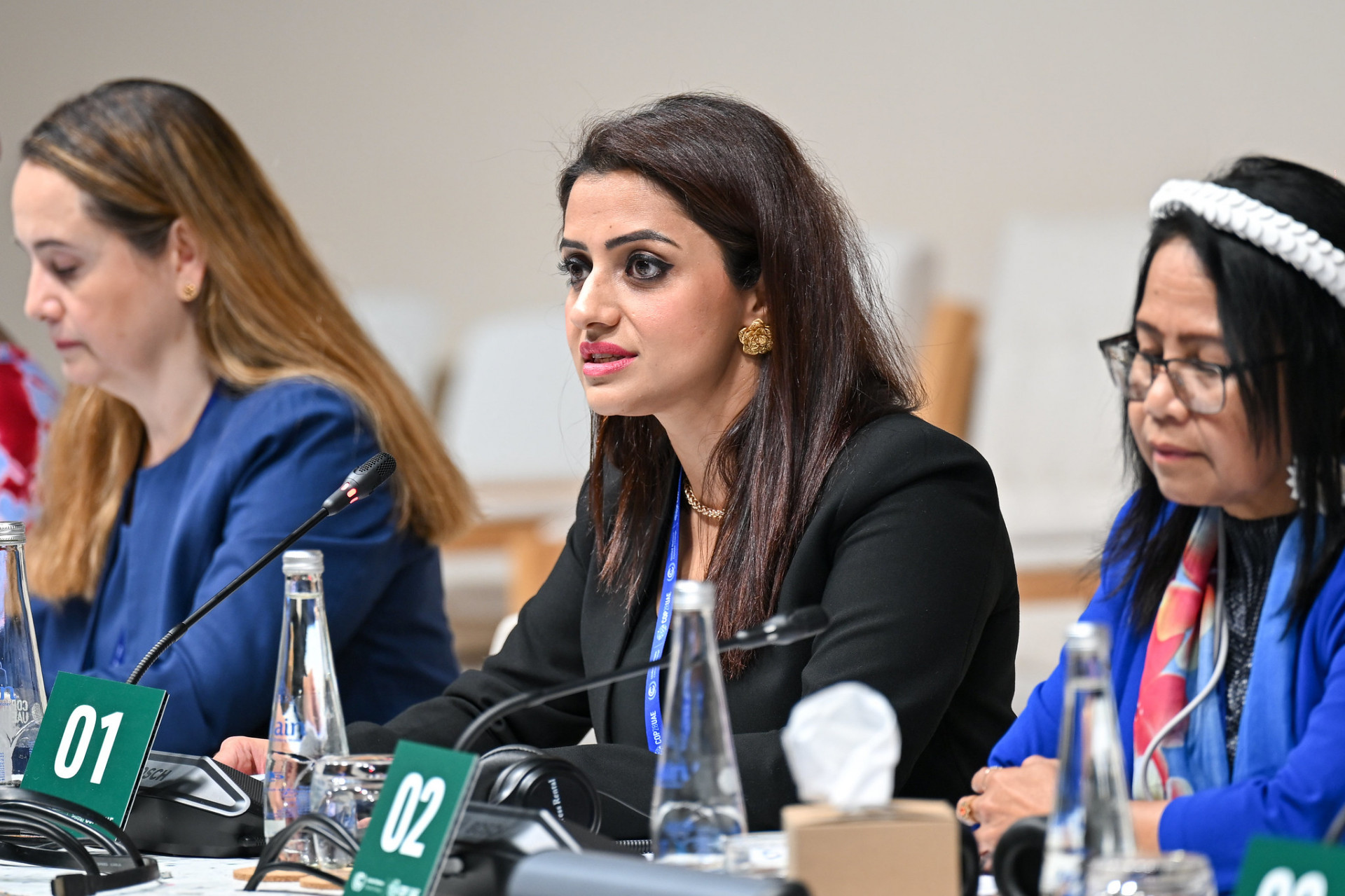
Negotiations at COP28 continue today with the hope that Parties will deliver an ambitious agreement that sets the world on a path to a more sustainable future.
For a glimpse into the past two weeks of the conference, you can explore hundreds of COP28 photos on UN Climate Change’s Flickr.
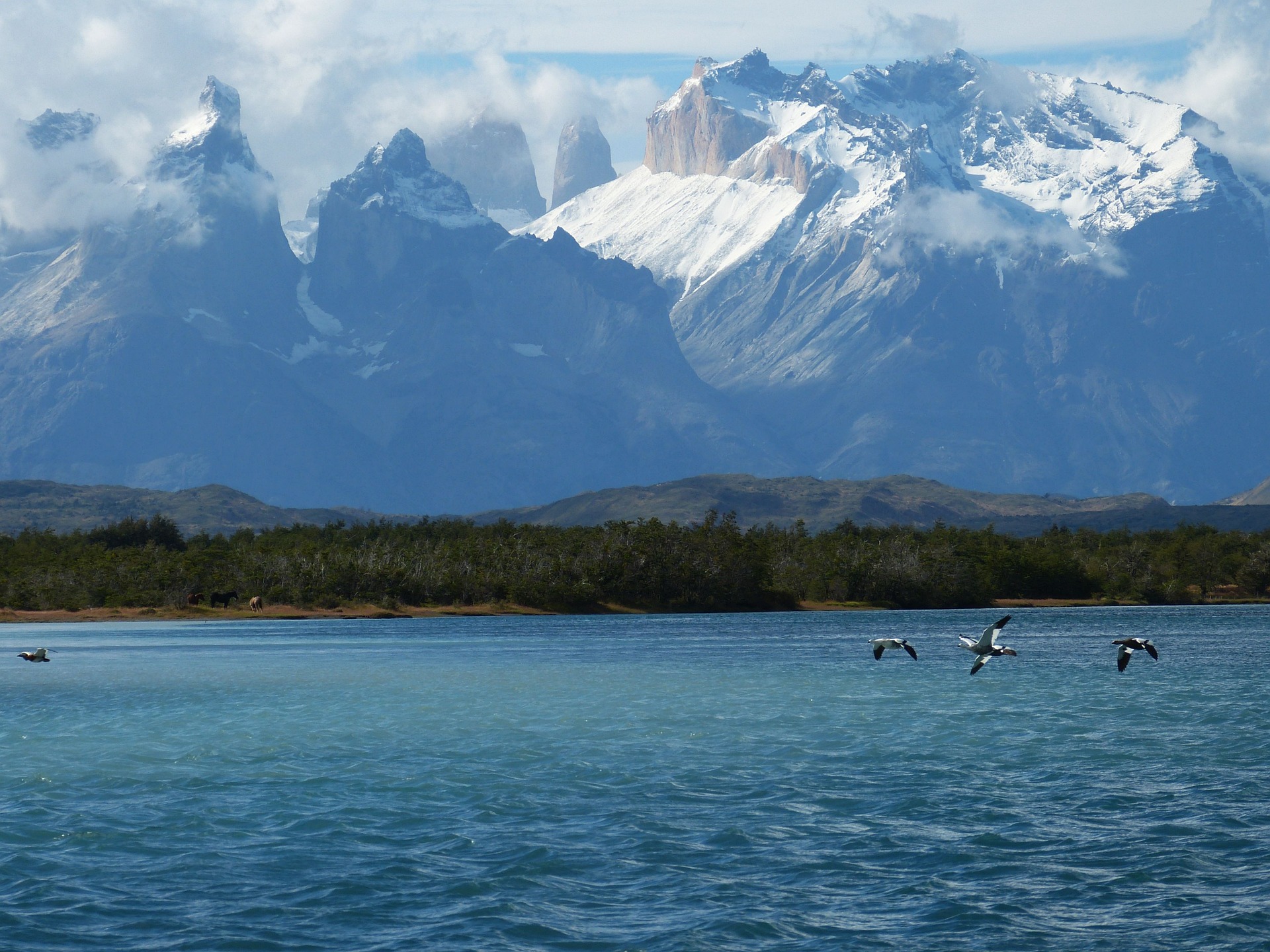
Mountains are crucial for biodiversity and support millions of livelihoods. But climate change is having alarming impacts, with glaciers disappearing and snow cover at its lowest in decades.
The 16th Focal Point Forum, held during COP28, highlighted that knowledge gaps are hindering adaptation efforts in mountains and high-latitude areas.
Participants outlined key areas for collaboration under the Nairobi Work Programme next year: evidence-based knowledge sharing, tailored solutions, strategic partnerships and financial support.
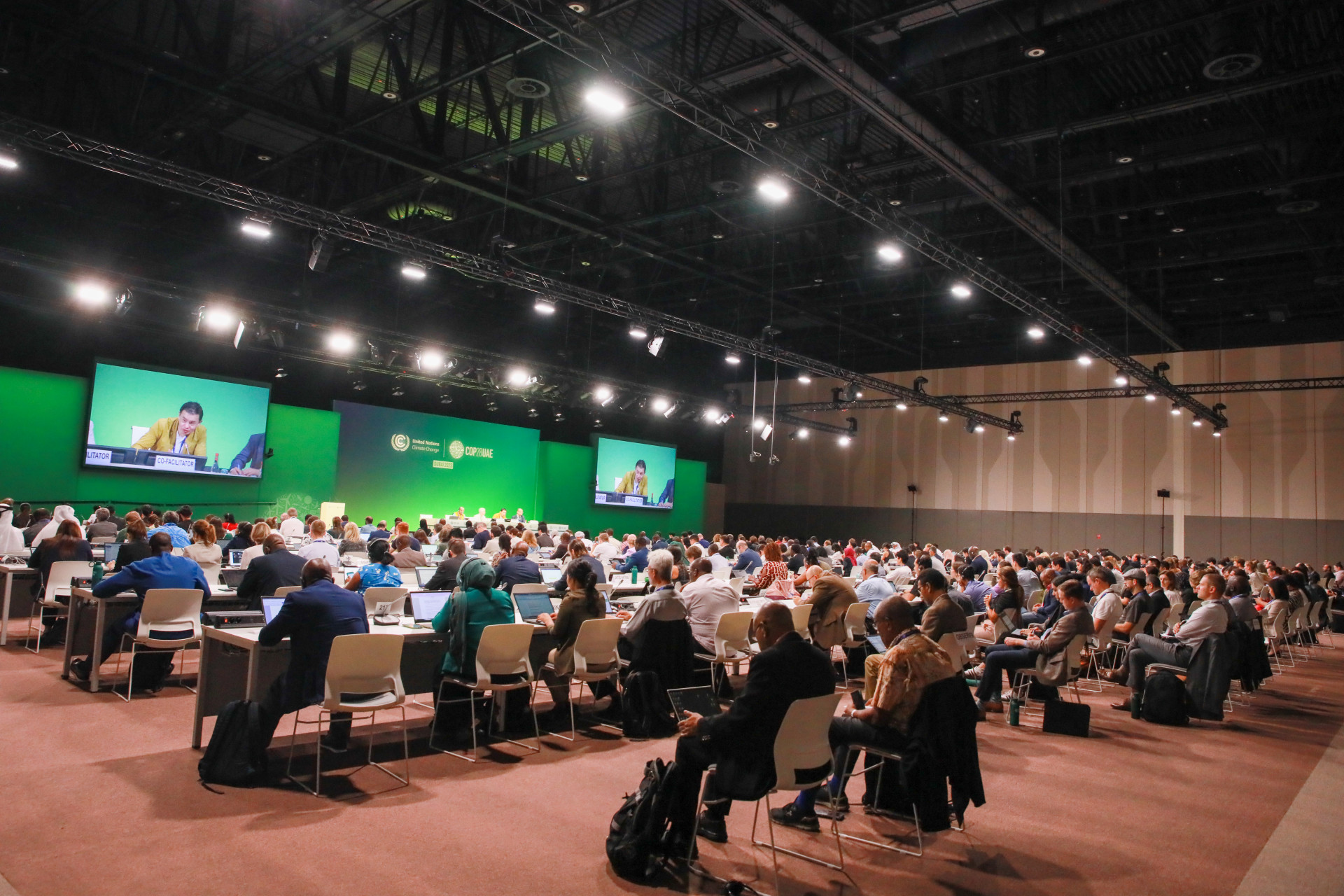
The clock is ticking on climate change. To avert its worst impacts, we need to reduce greenhouse gas emissions by 43% by 2030. But current national plans fall short, projecting a 9% increase instead.
How can developing countries, often lacking resources for a low-carbon transition, contribute? Article 6 of the Paris Agreement holds the key. It enables international cooperation to tackle climate change and unlock financial support for developing countries.
At COP28, negotiators are focusing on refining the tools of Article 6 to create a robust and transparent global carbon market, accelerate emission reductions and support developing nations in building resilience to climate change.
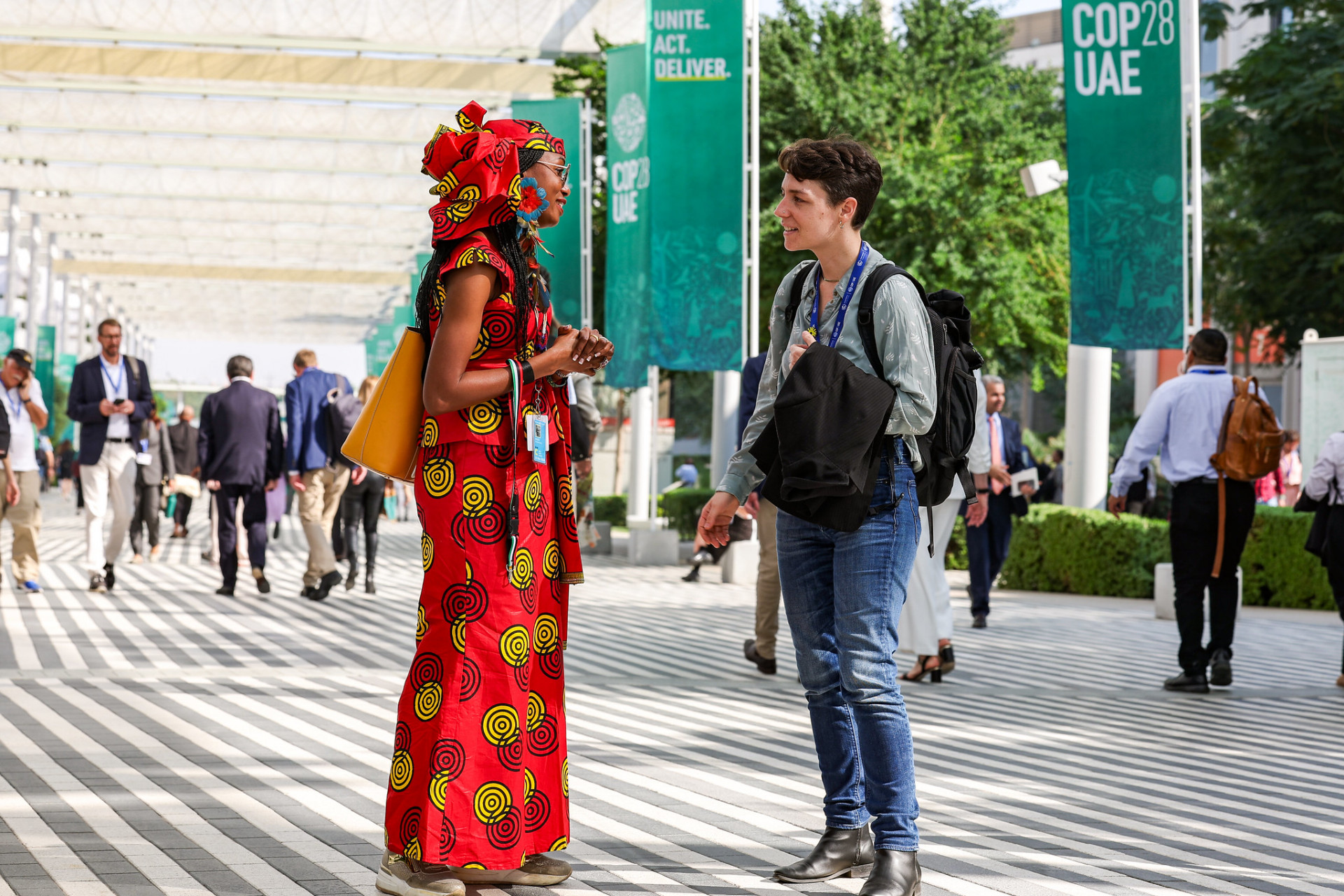
To support the conclusion of the first global stocktake at COP28, the High-Level Champions and the Marrakech Partnership have released a report called '2030 Climate Solutions: An Implementation Roadmap.'
The report contains a set of solutions, with insights from a wide range of non-Party stakeholders on measures that need to be scaled up and replicated to halve global emissions, address adaptation gaps and increase the resilience of 4 billion people by 2030.
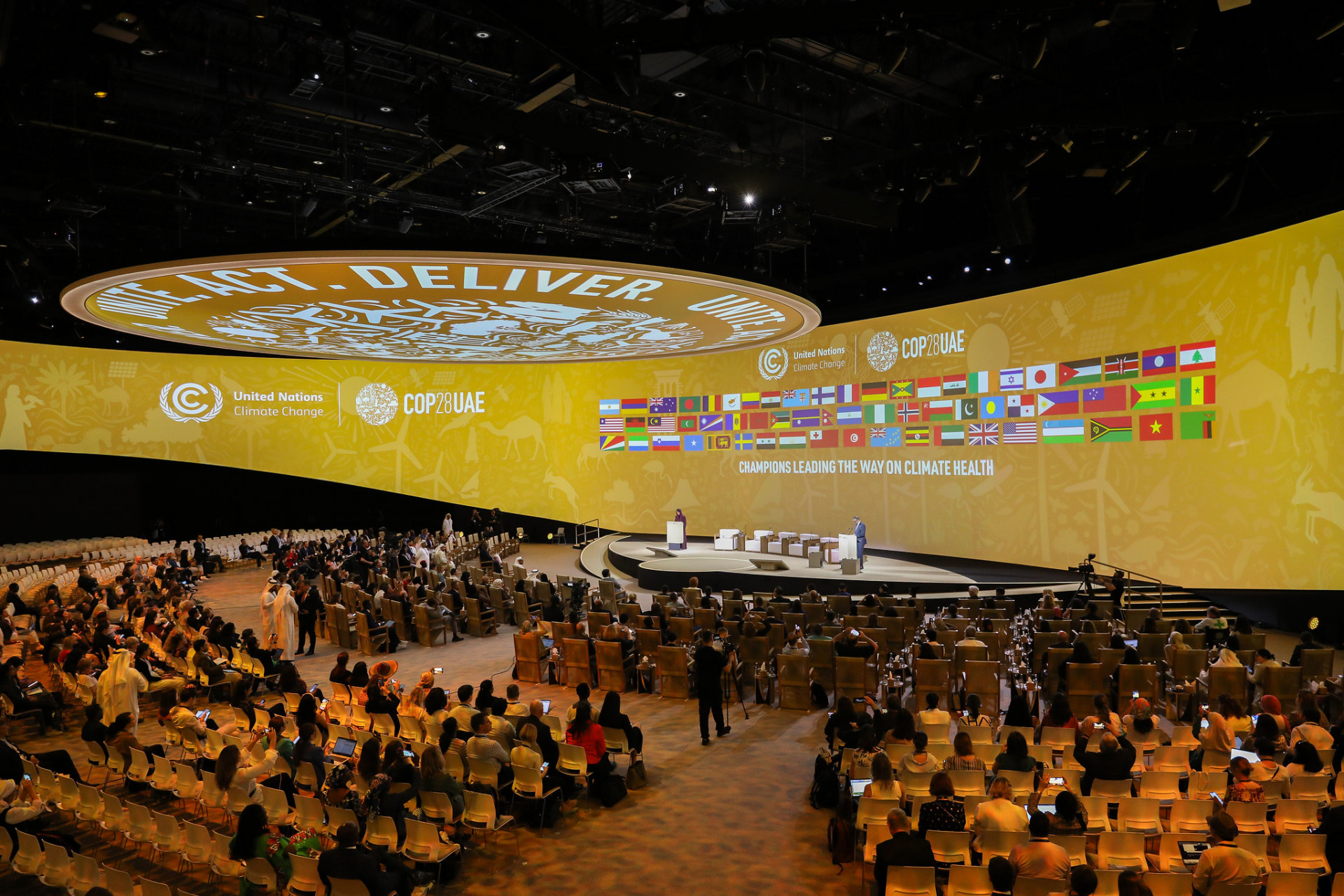
Taking place this afternoon, the closing of the Global Climate Action agenda at COP28 will mark a milestone in the global effort to address climate change. Along with being a moment to critically take stock of where the world stands in terms of meeting its Paris Agreement goals, this event will also highlight the real-economy climate solutions showcased throughout COP28.
The event will bring together the COP27 and COP28 presidencies, the High-Level Champions, and a wide range of stakeholders to underscore the importance of a shared responsibility in confronting the climate crisis. It will explore how the Global Climate Action agenda is contributing to tangible progress and what the plans look like to take stock of progress globally.
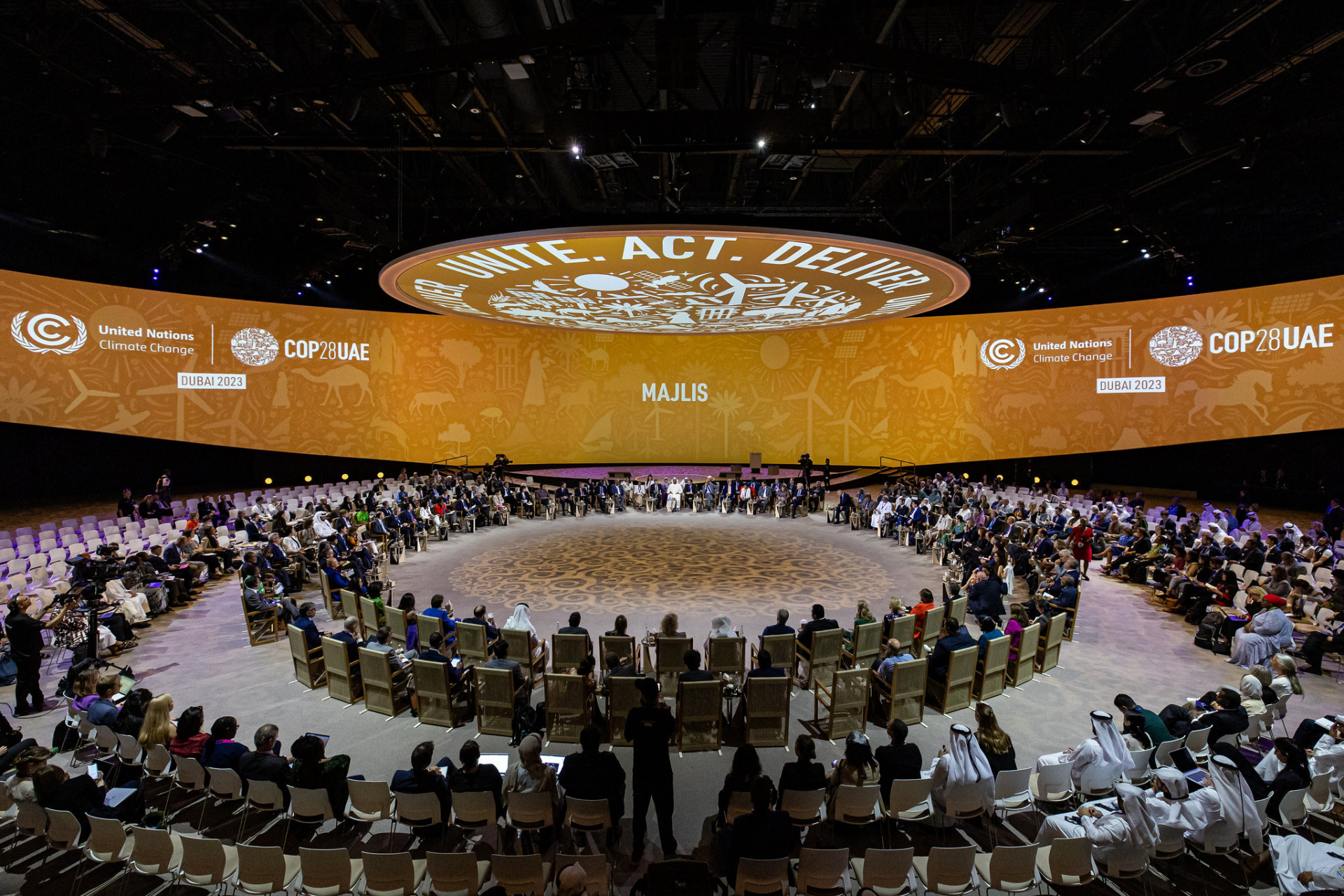
As COP28 enters the final stretch, with Parties working around-the-clock to find common ground on decisions and outcomes, the COP President has been meeting with all countries in a format called 'Majlis.'
The Majlis – an Arabic term used to refer to a council or a special gathering, typically bringing together a community of elders – is being held at COP28 in an open-ended setting at the Ministerial and Head of Delegation levels. The goal is to bring together all of the different decisions and outcomes to strike the right balance.
The Majlis began yesterday to foster "heart to heart" discussions, according to the COP President.
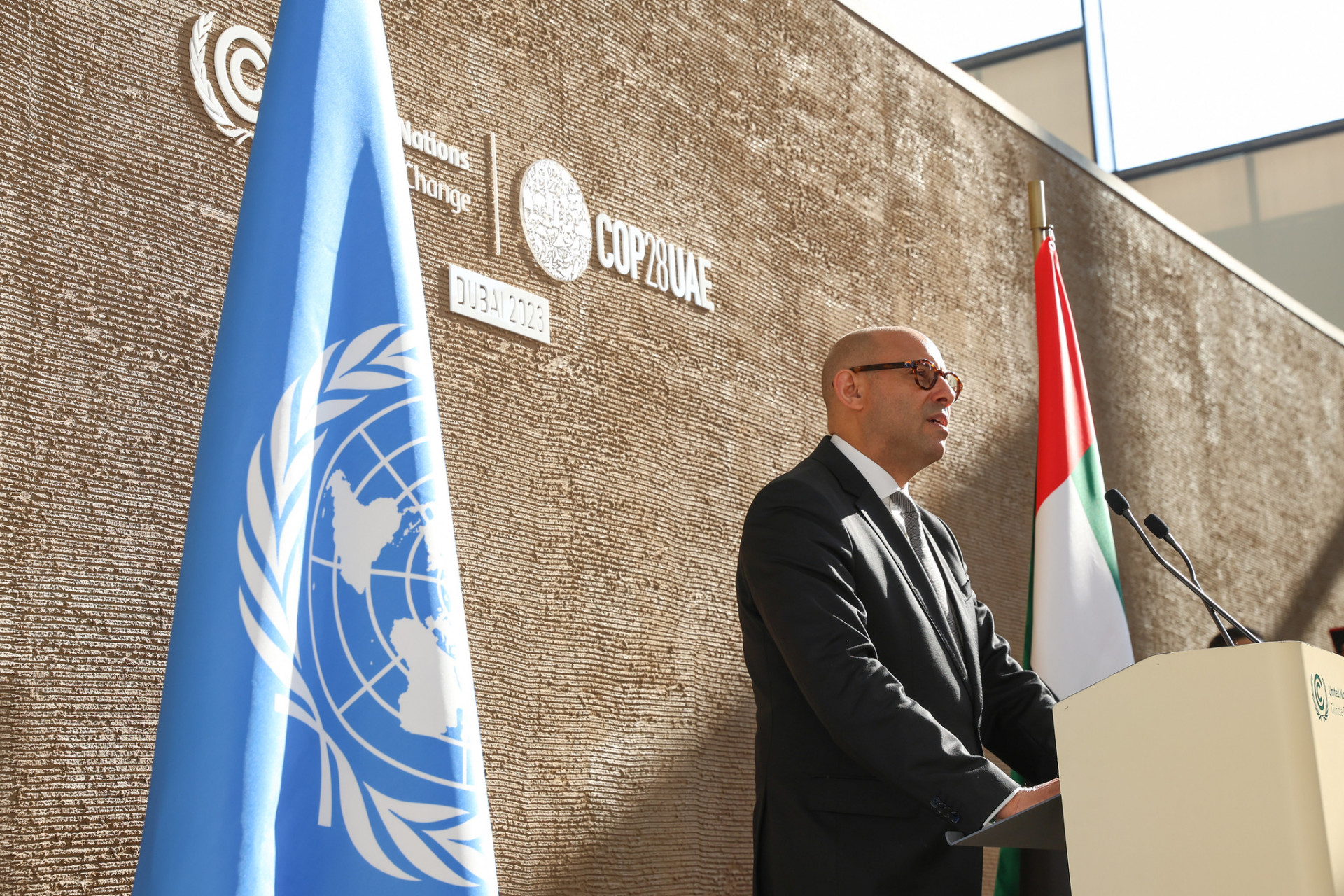
As COP28 enters the home stretch, UN Climate Change Executive Secretary made an urgent appeal this morning, calling on negotiators to deliver a "highest ambition" outcome.
"I urge negotiators to reject incrementalism," he said. "Each step back from the highest ambition will cost countless millions of lives, not in the next political or economic cycle, for future leaders to deal with, but right now, across every country."
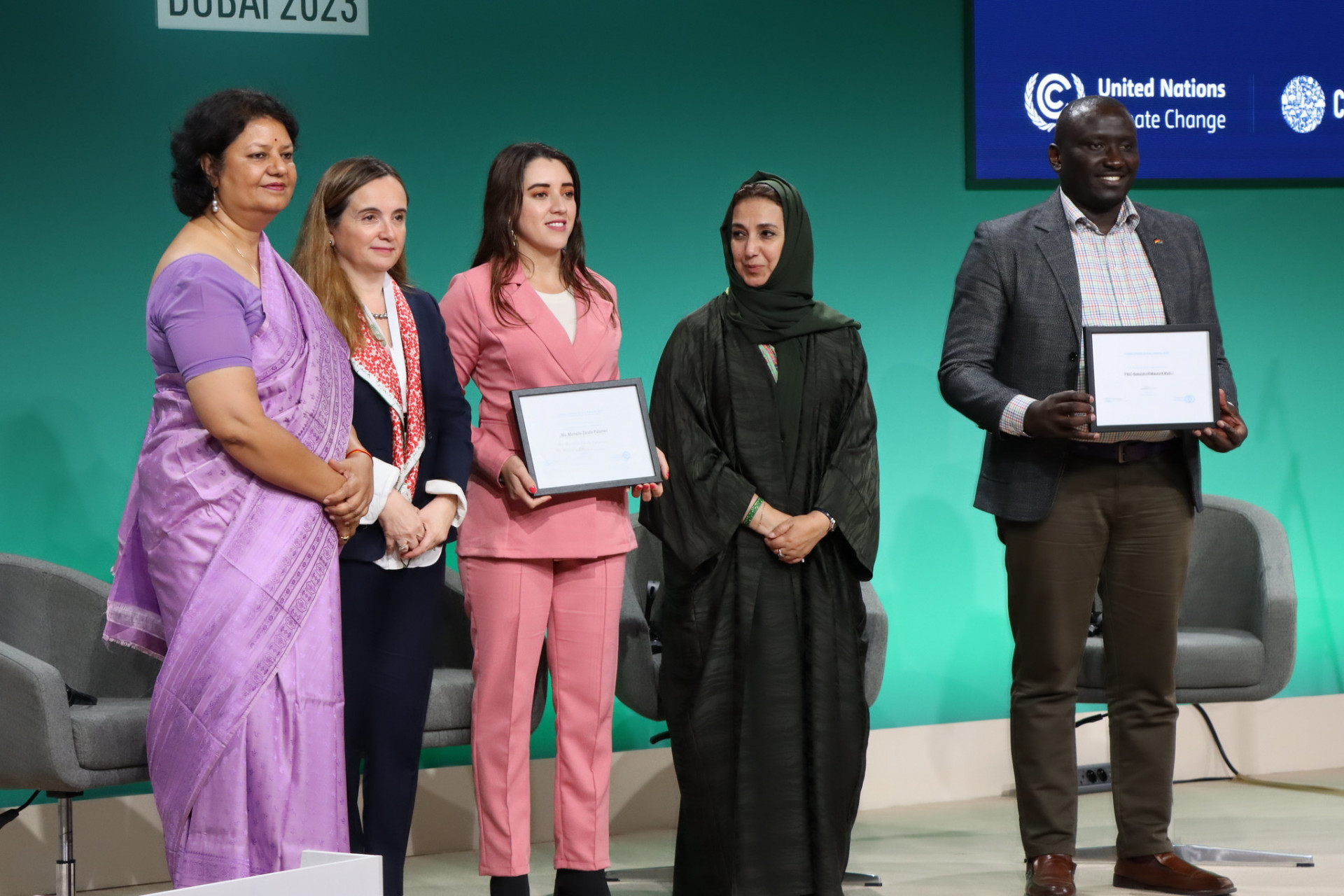
Last week, two young people were celebrated as winners of the UN Global Climate Action Awards at COP28. Michelle Zárate Palomec of Mexico and Sebastian Mwaura of Kenya were selected from hundreds of applicants from 120 countries for their outstanding efforts to make their communities more sustainable, resilient and equitable places to live.
We sat down with both of them at COP28 to learn how they're making a real difference.
-
Watch our interview with Michelle Zárate Palomec (in Spanish)
-
Watch our interview with Sebastian Mwaura (in English)
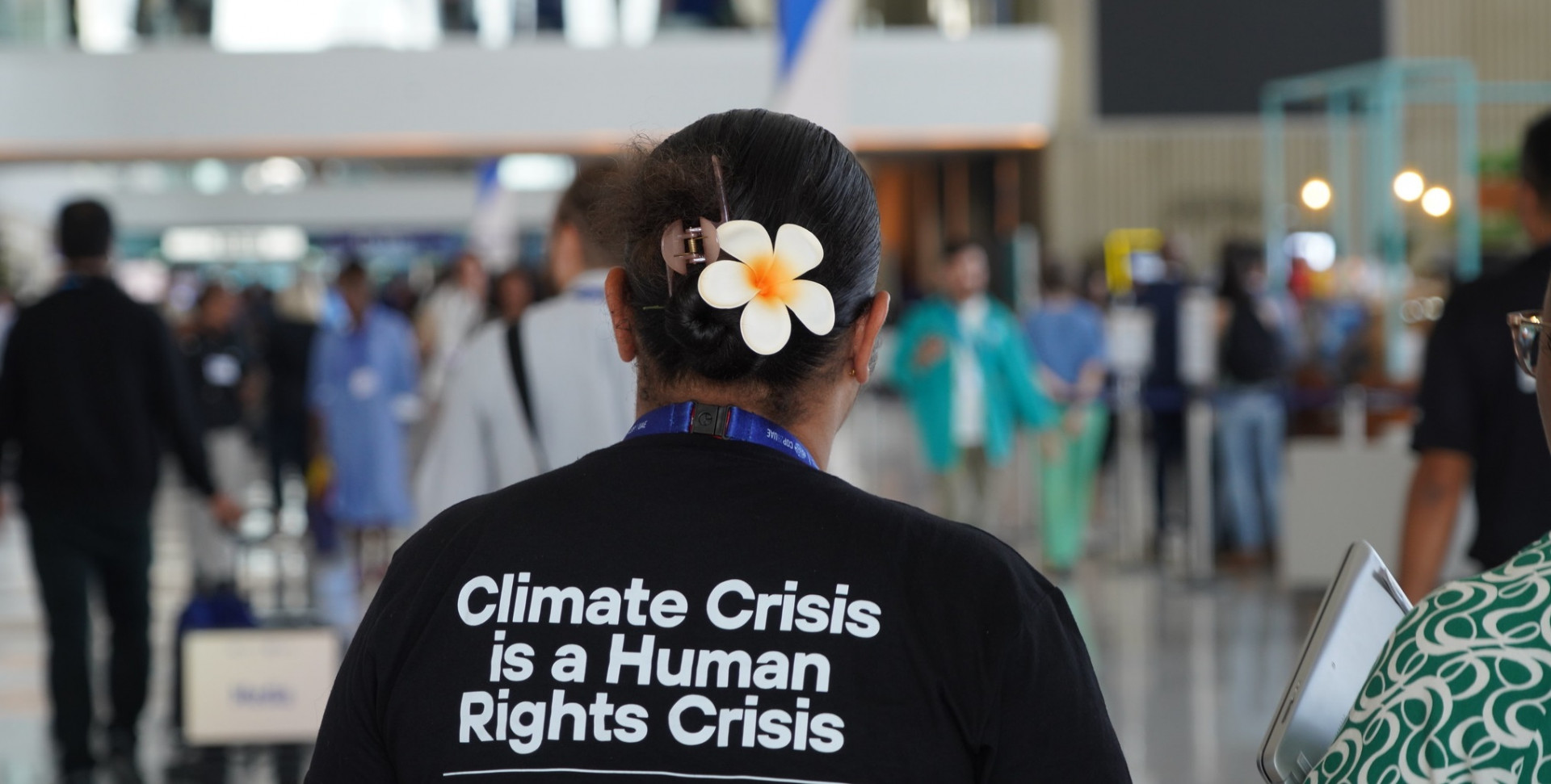
On the 75th anniversary of the Universal Declaration of Human Rights, it's important to remember that the climate crisis isn't just an environmental crisis, it's a human rights crisis too.
Rising temperatures, extreme weather events and rising sea levels threaten the very rights that underpin our dignity and well-being. The rights to food, water and sanitation, adequate housing, health, development, and even life itself are all at risk.
Rights-based climate action is essential to ensure that all climate policies and decisions are informed by and uphold human rights principles.
Civil society, Indigenous Peoples and youth, among others, have engaged in advocacy actions during COP28 with calls for climate ambition and action to be rooted in respect for human rights.
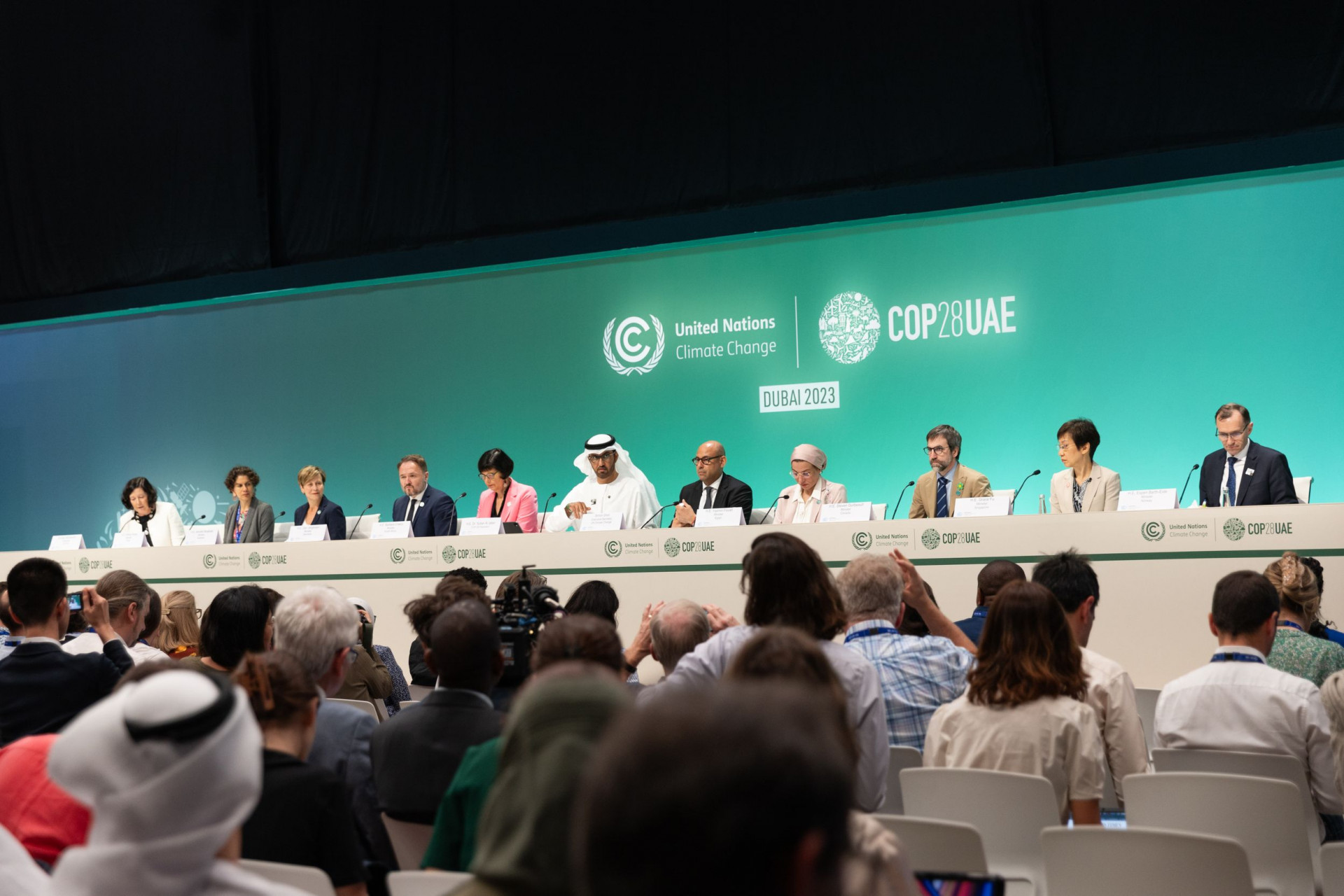
The political phase of the UN Climate Change Conference is now well underway, with round-the-clock efforts to agree on a decision text, particularly on outstanding issues, including the global stocktake, adaptation and finance.
Ministers from different regions are appointed to help push the negotiations forward.
“If we want to save lives now, and keep 1.5 within reach, the highest ambition COP outcomes must stay front and centre in these negotiations,” said UN Climate Change Executive Secretary Simon Stiell.
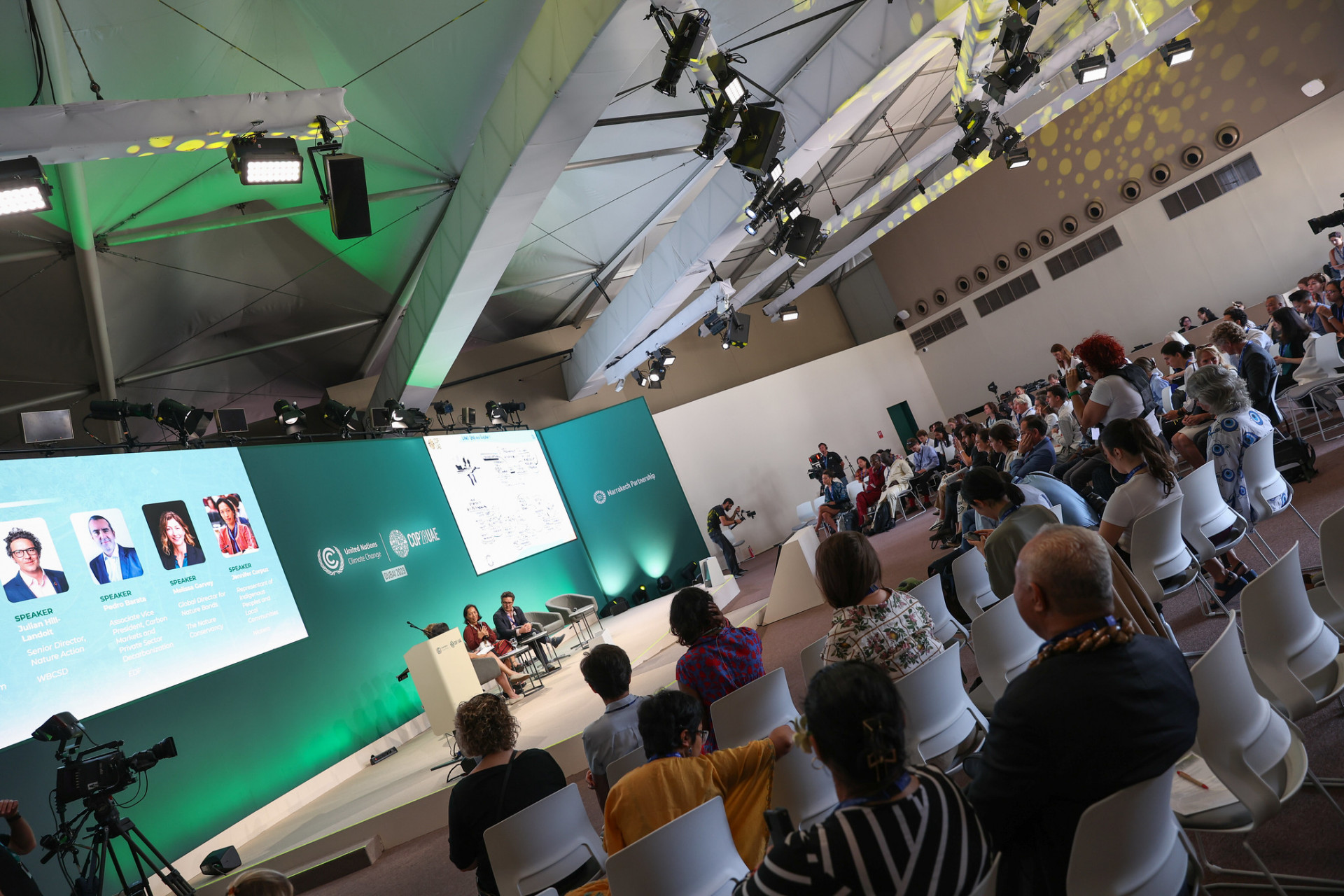
If you’re looking for a visual daily summary of COP28, we’ve got you covered with curated photography capturing the essence of the climate summit:
- Negotiation sessions and discussions as delegates strive to reach consensus on critical issues.
- Side events on a diverse range of perspectives and solutions by stakeholders from across the globe.
- Exhibits and installations raising awareness about the climate crisis.
- Protests and demonstrations by individuals raising their voices for climate action.
All photos are taken by the UN Climate Change team.
Climate change is causing increasingly erratic weather, jeopardizing food security for millions of people.
Food and Agriculture Day at COP28 focuses on the need to prioritize sustainable farming practices and invest in innovation to provide healthy food for all.
On the second day of COP28, 134 world leaders signed a historic declaration for more climate-resilient food systems and sustainable food production, underscoring the importance of food in tackling the climate crisis.
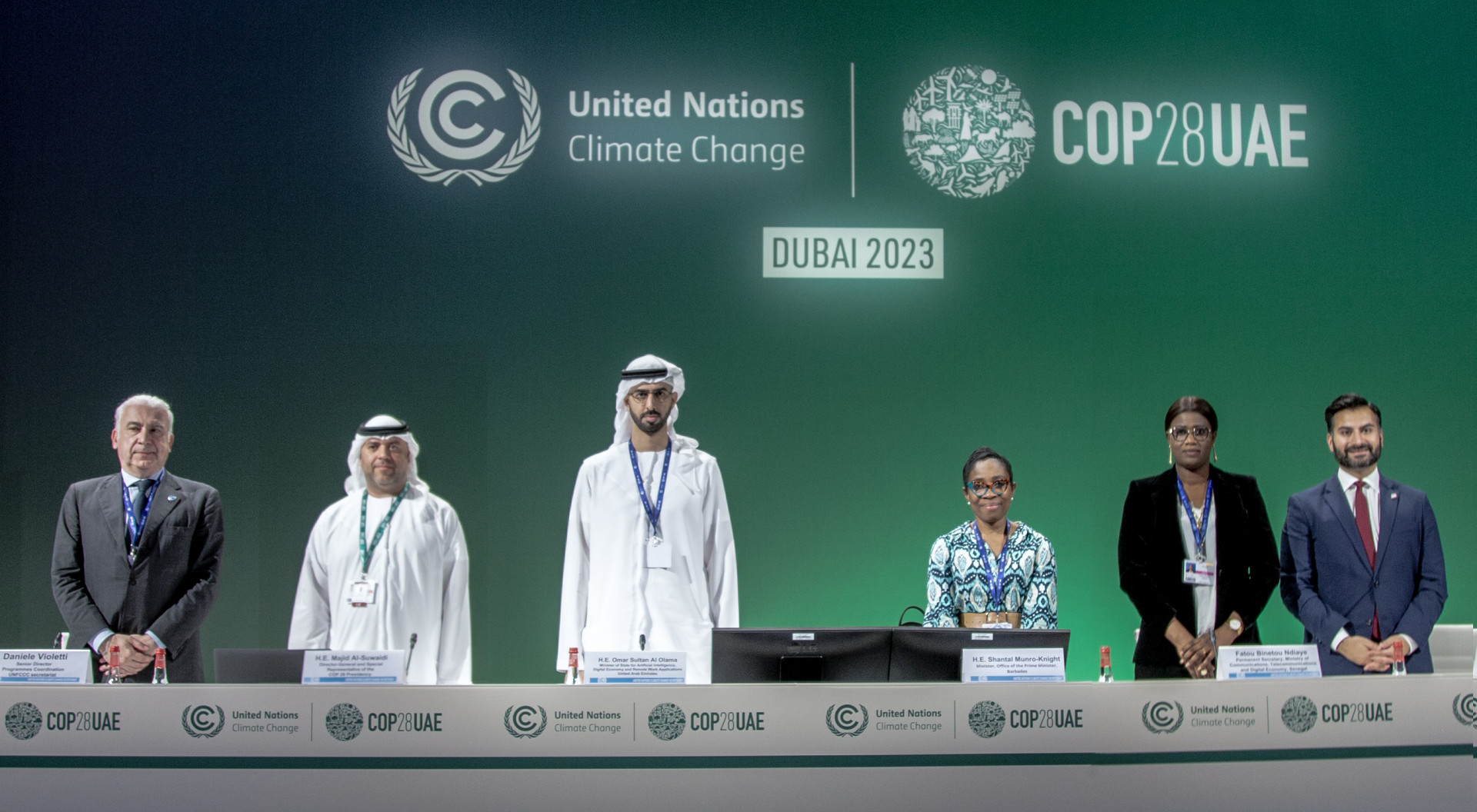
The UN Climate Change Technology Executive Committee (TEC), together with Enterprise Neurosystem, a non-profit open-source artificial intelligence (AI) community, has launched the AI Innovation Grand Challenge to identify and support the development of AI-powered solutions for climate action in developing countries.
“We are seeing increasing evidence that artificial intelligence can prove an invaluable instrument in tackling climate change. While we remain mindful of the associated challenges and risks of AI, the Innovation Grand Challenge is a promising step forward in harnessing the power of artificial intelligence and empowering innovators in developing countries,” said UN Climate Change Executive Secretary Simon Stiell.
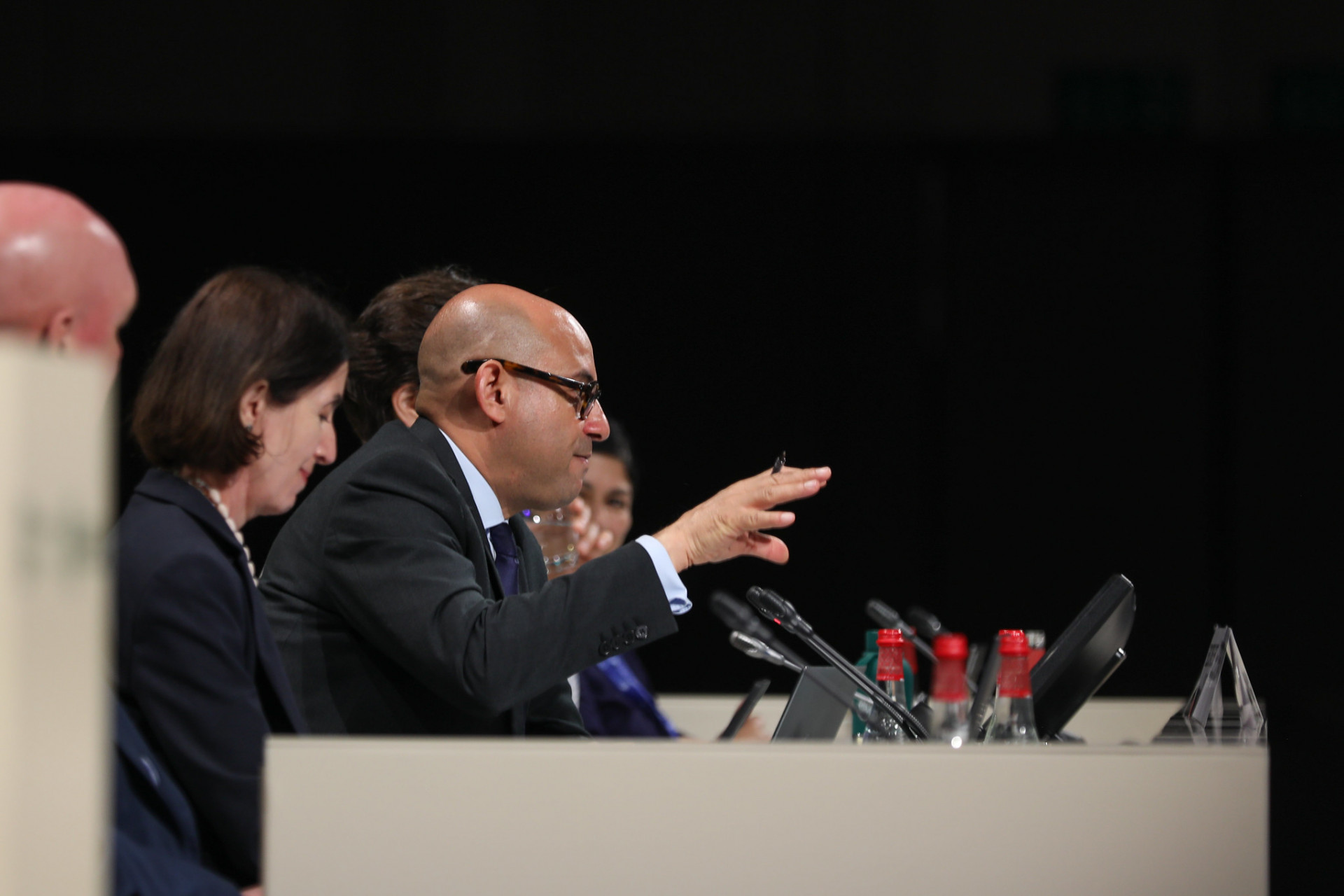
UN Climate Change Executive Secretary Simon Stiell said it's time for the COP to shift from the 'what' to the 'how' when it comes to boosting climate action by 2030.
Speaking at the High-Level Ministerial Roundtable on pre-2030 Ambition earlier today, Stiell said halving global emissions this decade is not an aspirational task; it is something we must do if we are to keep the global economy functioning, and protect billions of human lives.
Stiell said the outcome of the Global Stocktake must also start laying out the ‘how’. It must agree on the tools and solutions that Parties need right now – to accelerate their climate actions across their real economies, he said.

Healthy forests play a crucial role in mitigating climate change by acting as carbon sinks, absorbing billions of metric tonnes of CO2 annually.
Since the Warsaw Framework for REDD+ was adopted in 2013, 60 developing countries have reported activities to reduce deforestation and forest degradation covering an area of about 1.35 billion hectares – approximately 62% of forest area in developing countries. This effort has led to a significant reduction in carbon dioxide emissions, with 17 countries reporting a decrease of 11.6 billion tons.
A COP28 event today celebrates 10 Years of REDD+ and provides an overview of REDD+ development over the past decade, highlighting success stories and providing insights to raise REDD+ ambition in the coming decade. Join the event in Room 1, B6 (Blue Zone) from 13:15 to 14:45h.
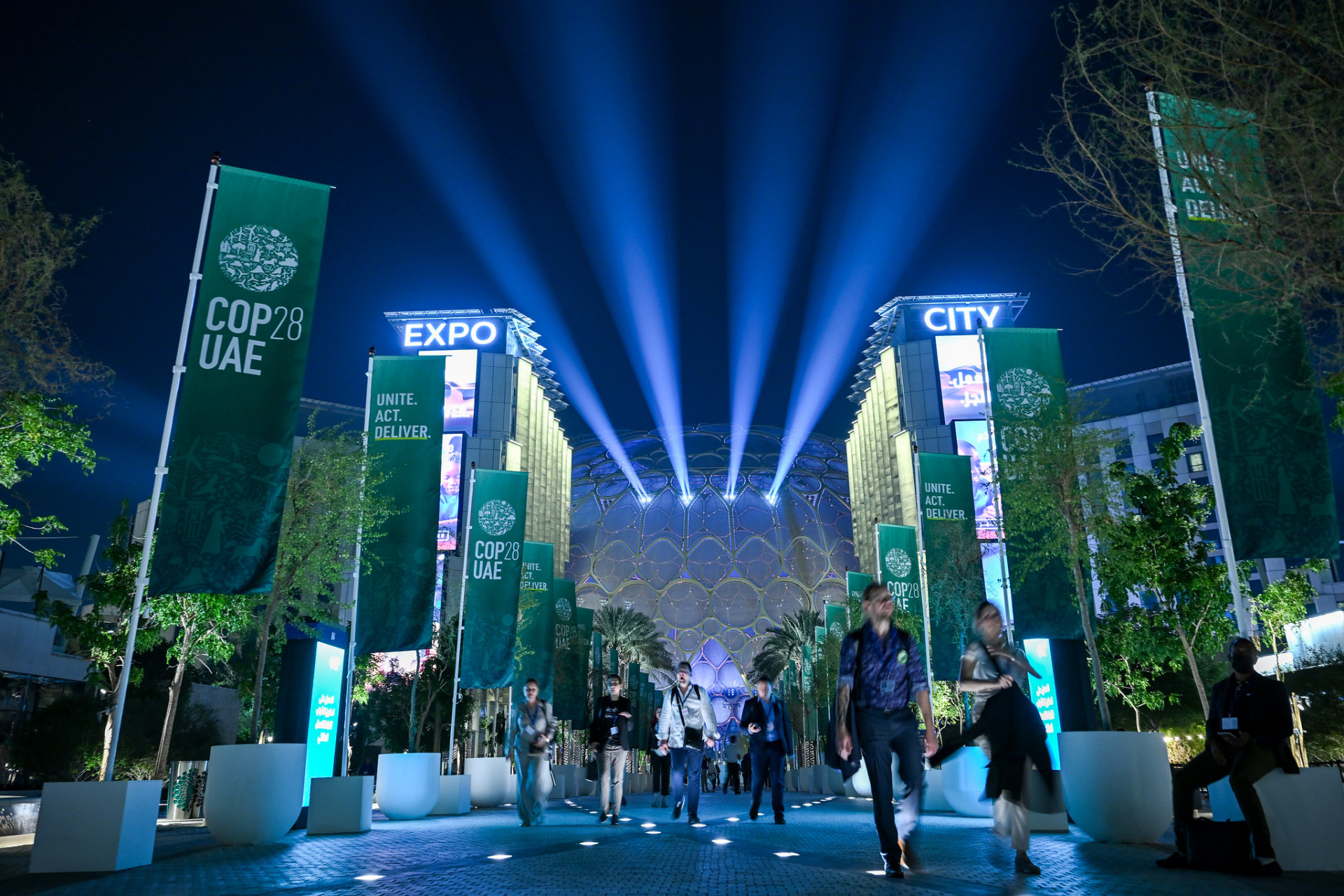
Artificial intelligence is already being used to predict climate patterns and extreme weather events, improve crop yields, reduce water usage or optimize renewable energy systems.
But how can it be harnessed to scale up climate solutions in developing countries?
Government leaders, United Nations and development cooperation agencies and business representatives convene today to discuss how AI can be used for transformational climate action in developing nations.
Join the event today in Meeting Room 1, B1 (Blue Zone), from 13:15 to 14:45h.
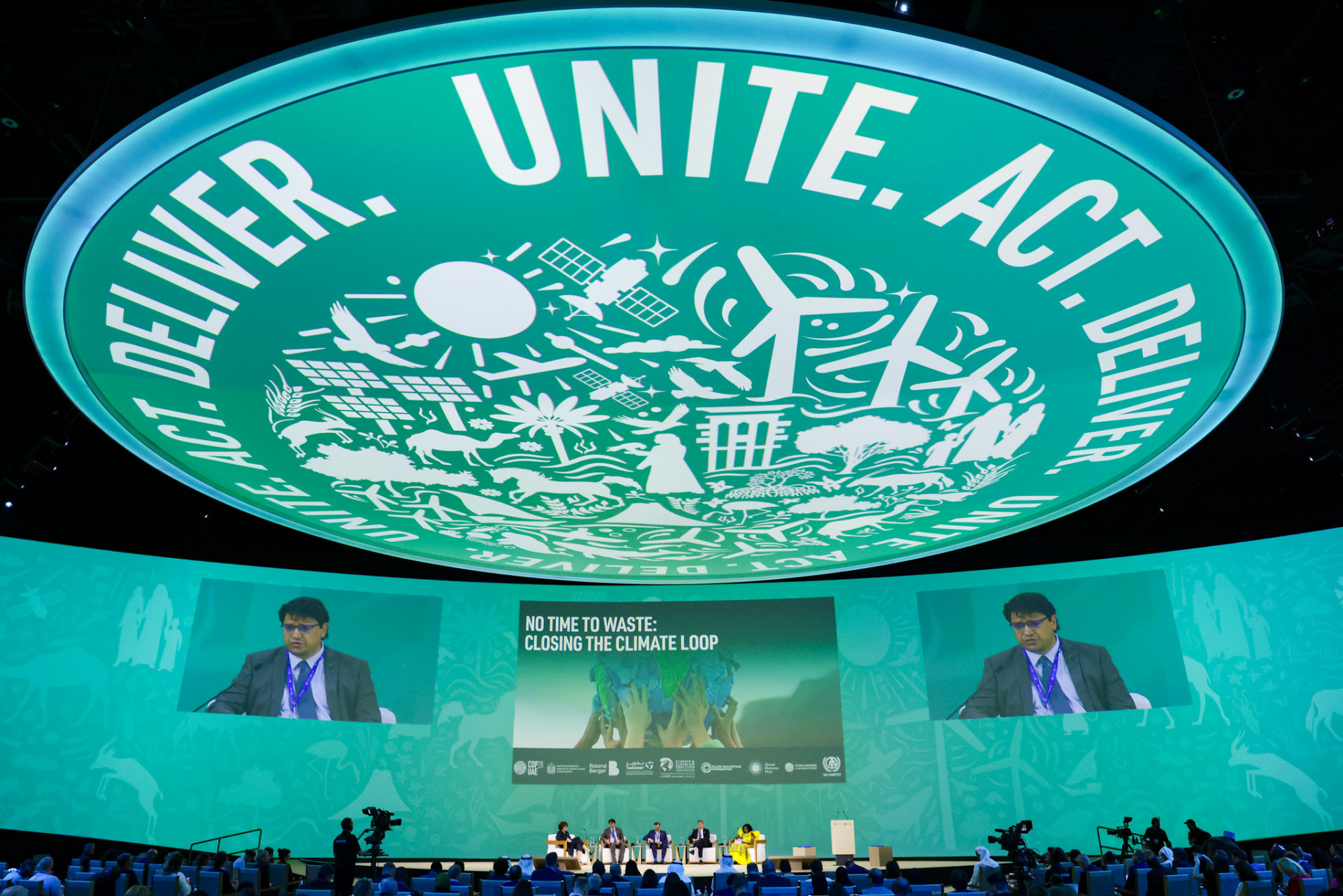
Taking place today, the high-level ministerial roundtable on pre-2030 ambition will see government ministers discuss how to unlock an ambitious outcome on mitigation at COP28. Two key questions will frame their discussions:
-
How should a COP28 mitigation outcome be framed to accelerate action to keep 1.5 alive?
-
How do we ensure that everyone has access to technology and finance to ensure the climate solutions needed to enhance ambition can be implemented?

Nature, land and the ocean provide food and water and support all life on earth. They also play a crucial role in regulating the climate.
But they are threatened by land degradation and ocean pollution.
Today, COP28 will focus on what needs to be done to ensure a future in which biodiversity thrives, land use is sustainable and oceans teem with life.

Two young people will be celebrated as winners of the UN Global Climate Action Awards at COP28 later today.
Michelle Zárate Palomec of Mexico and Sebastian Mwaura of Kenya were selected from hundreds of applicants from 120 countries for their outstanding efforts to make their communities more sustainable, resilient and equitable places to live.
The award ceremony gets underway in the Global Climate Action area, Arena 1 (Al Hur), starting at 18:00 tonight. Award-winning journalist and climate advocate Sophia Li will serve as the event’s Master of Ceremonies.
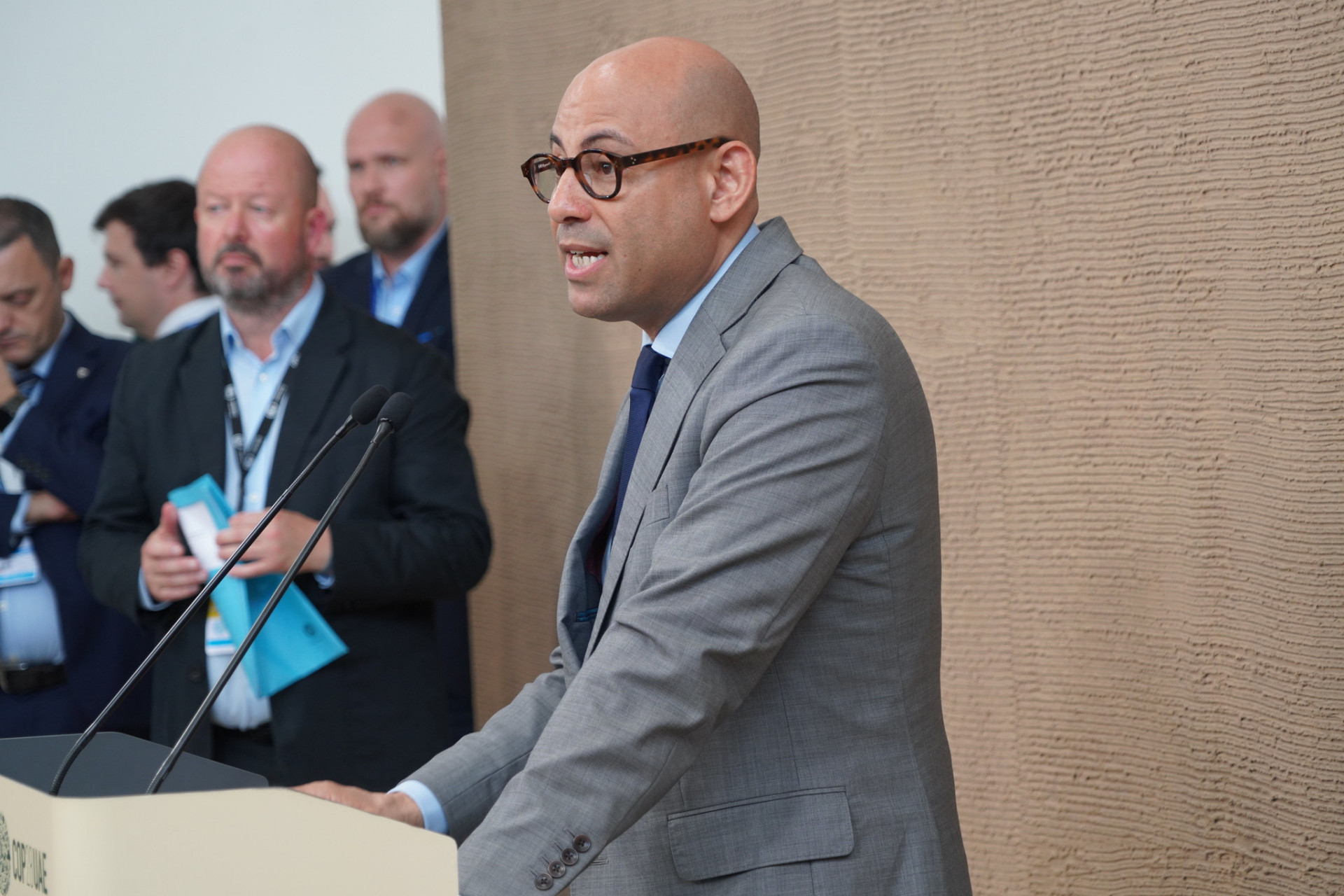
As COP28 enters the final week of negotiations, UN Climate Change Executive Secretary Simon Stiell made an impassioned plea to negotiators to keep 1.5 alive. Here is an excerpt from his statement delivered at a press conference this afternoon:
"In short, it’s go-time for governments at COP28 this week. There are low, middle and high ambition options on many issues. If we want to save lives now, and keep 1.5 within reach, the highest ambition COP outcomes must stay front and center in these negotiations."
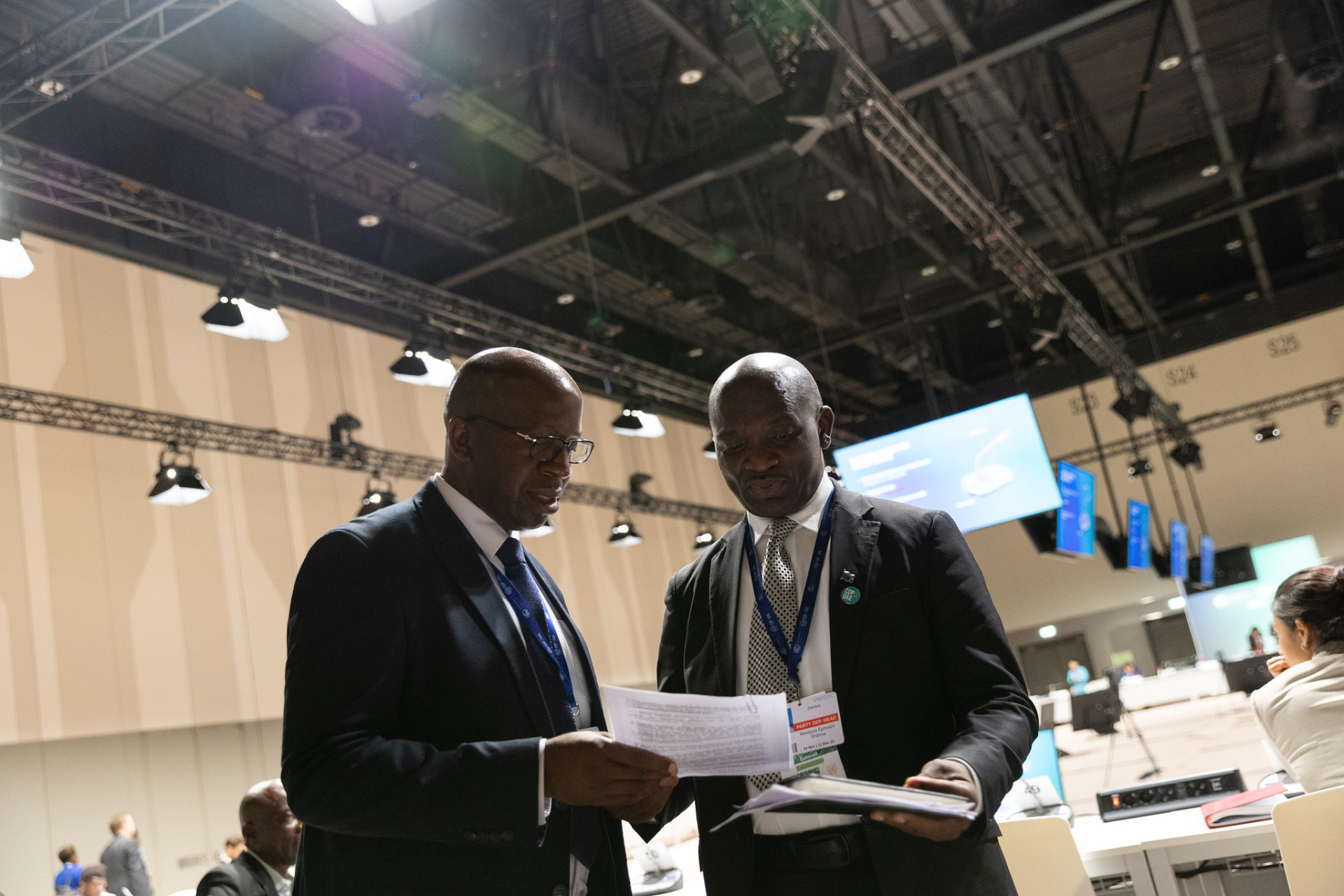
Taking place at COP28 this afternoon, the second high-level ministerial dialogue on climate finance will focus on enhancing the provision and mobilization of climate finance. It is designed to strengthen the political momentum driving negotiations on issues such as:
-
Predictability and delivery of climate finance.
-
Mobilization of climate finance from a wide variety of sources, instruments and channels.
-
Efforts to achieve a balance between adaptation and mitigation finance.
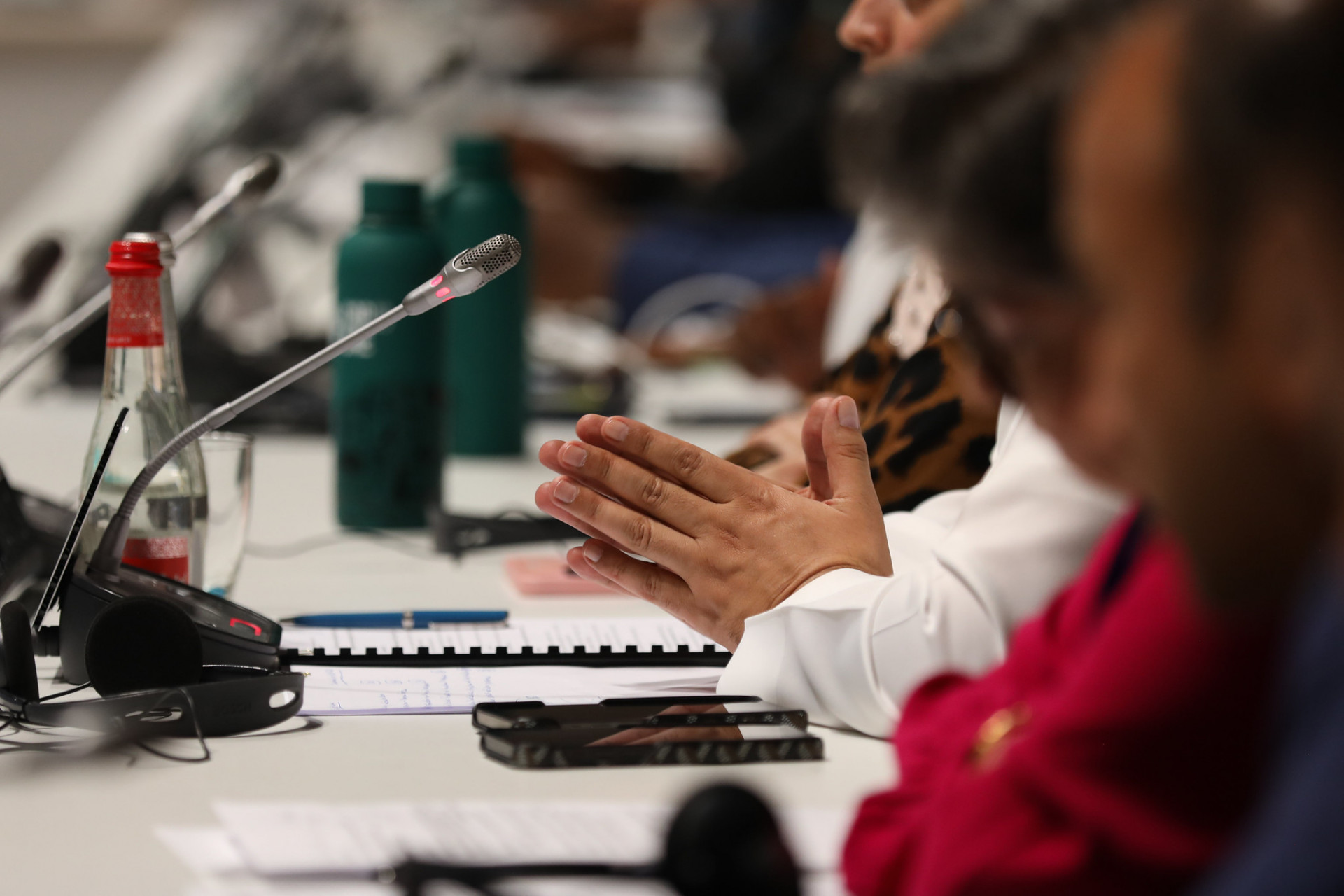
The next round of climate action plans under the Paris Agreement (known as nationally determined contributions, or ‘NDCs’) are due by 2025. This is a critical opportunity for national governments to boost ambition and accelerate climate action.
As the 2025 NDC deadline approaches, there is a need for more ambitious targets to cut emissions, more action to increase resilience, more finance, greater transparency, and faster implementation. This side event at COP28 will bring delegates together to share ideas and solutions to shape more ambitious NDCs by 2025.

Did you know that UN Climate Change has been working with sports organizations and their athletes for five years to raise awareness about the importance of climate action?
Join our special event at COP28 today to hear from champions of our Sports for Climate Action Framework. Athletes, sports organization and brands will discuss how they use sports as a tool to create awareness and drive action in a way that resonates with millions of people globally.
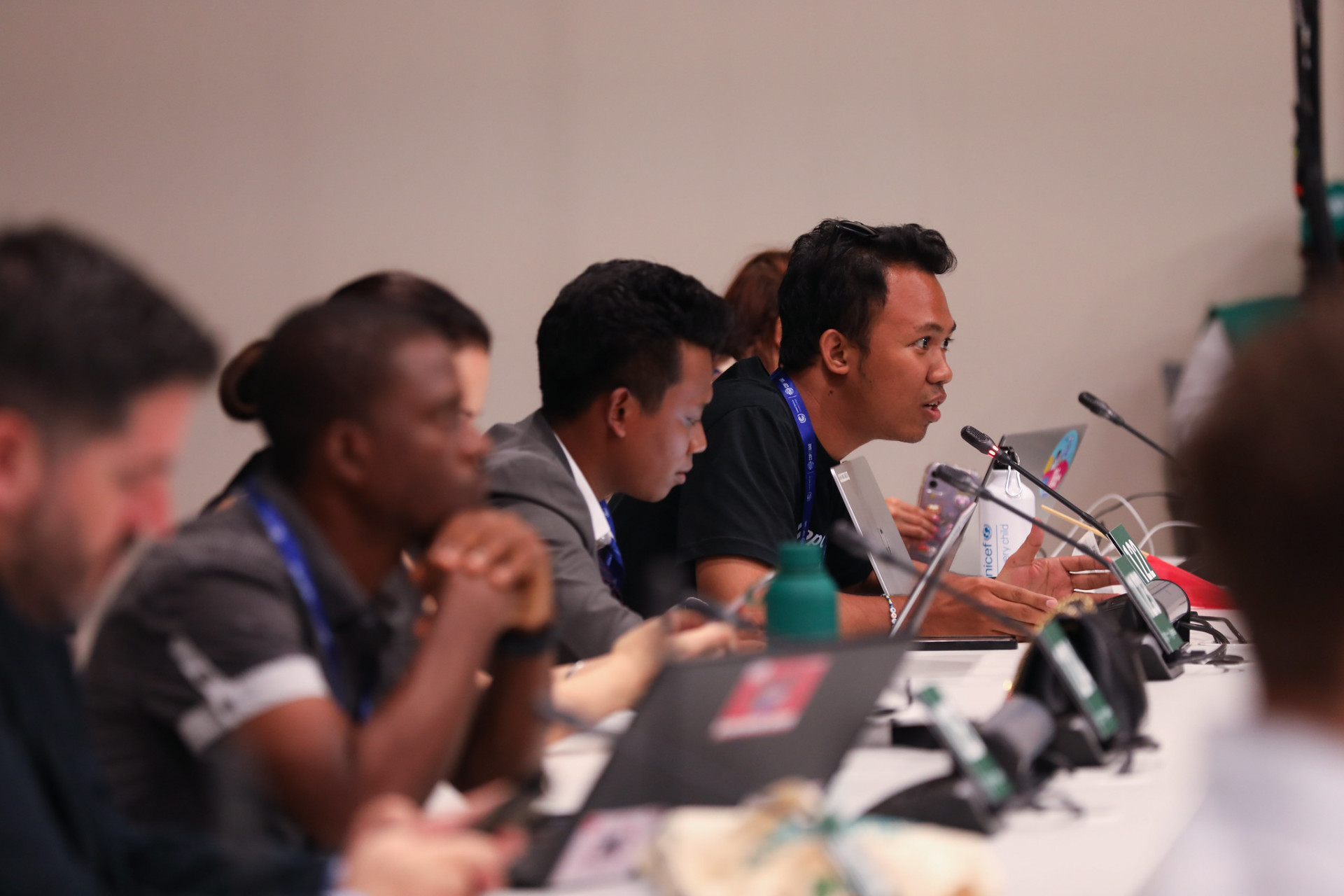
From classrooms to communities, the voices of young people are rising, demanding urgent and ambitious climate action for a sustainable future.
Youth Day at COP28 will amplify the voices of young people to ensure their demands are heard, and call for increased investment in education to equip children and youth with the skills and tools to tackle the climate crisis.
YOUNGO, UNFCCC’s youth constituency, empowers youth to have a voice in international climate policies.
A series of youth-led side events, workshops and interactive sessions geared specifically towards youth take place during COP28.
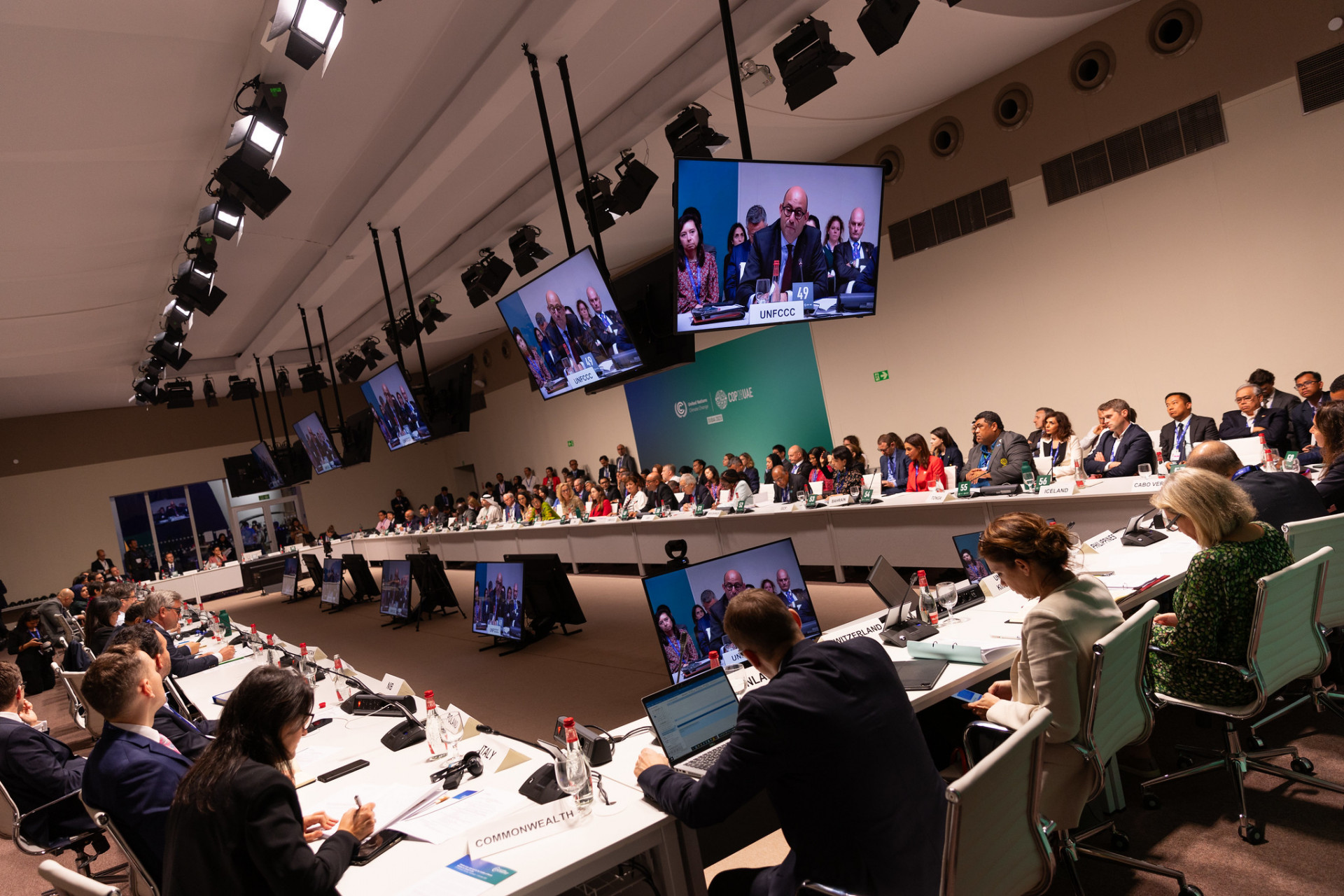
Governments will take a decision on the global stocktake at COP28, which can be leveraged to accelerate ambition in their next round of climate action plans (known as "nationally determined contributions") due in 2025.
An event organized by UN Climate Change and its Regional Collaboration Centres at COP28 will share the results of a new report that unpacks the state of play, challenges and opportunities for developing climate action plans in Africa, Asia and the Pacific.
It will also share practices and experiences on benefits, gaps, and constraints in developing and implementing these plans in the lead-up to 2025.
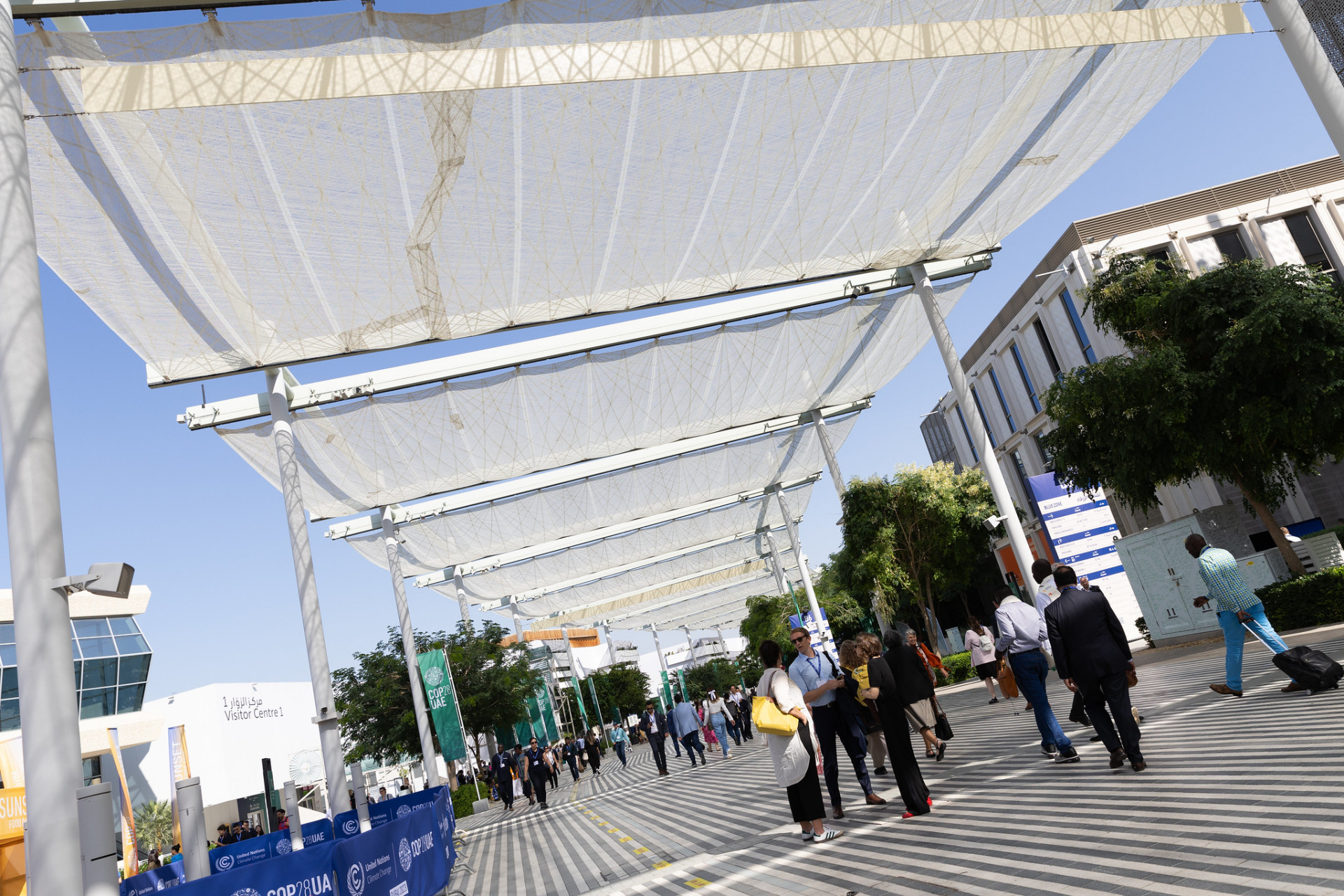
The COP28 venue will be closed on Thursday, 7 December. No official meetings will take place, no services will be available, and no deliveries will be permitted.
Participants who have offices and/or pavilions will be granted access to their offices and pavilions; however, no events can take place. Participants with offices and/or pavilions receiving accredited guests must pick them up at the security screening facility at the only open gate (Metro Plaza).
Members of the media with assigned workplaces will be given access to their facilities.
We'll be back in action on Friday, 8 December!
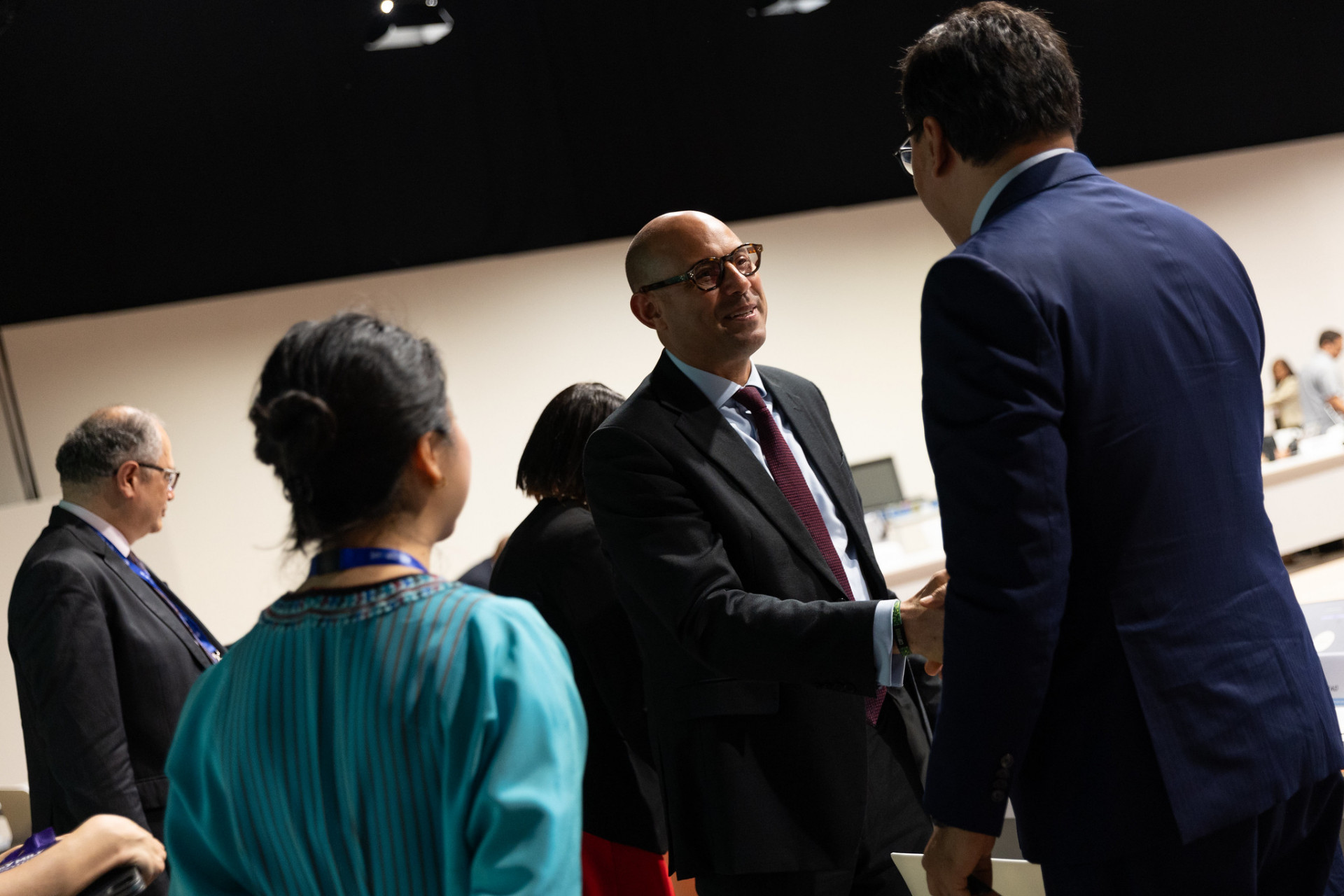
UN Climate Change drives global climate action and we're looking for fresh talent to be a force for positive change – come help shape the future with us!
Senior staff from UN Climate Change and UN Environment Programme are hosting an event at COP28 this evening to talk about career opportunities at both organizations and within the wider UN system.
Join us in the Blue Zone, SE Room 9, from 18:30 to 20:00 tonight or watch live on YouTube.
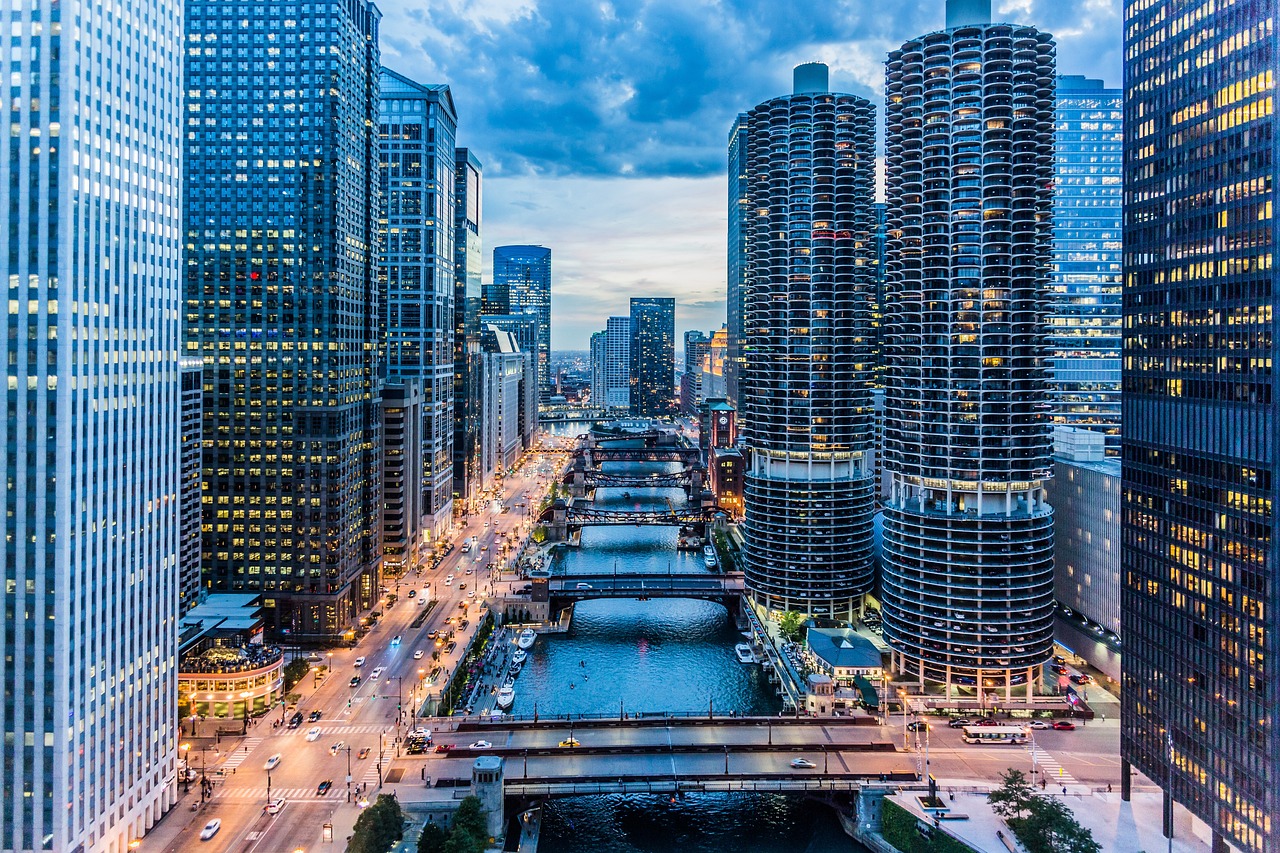
Urban areas are major contributors to climate change, accounting for 71-76% of CO2 emissions from global final energy use. And in 2050, there may be three to four times as many passenger-kilometers travelled as in the year 2000. (UN Habitat)
Today is Urbanization and Transport Day at COP28, focusing on sustainable solutions for healthier, more vibrant and less polluted cities for all.
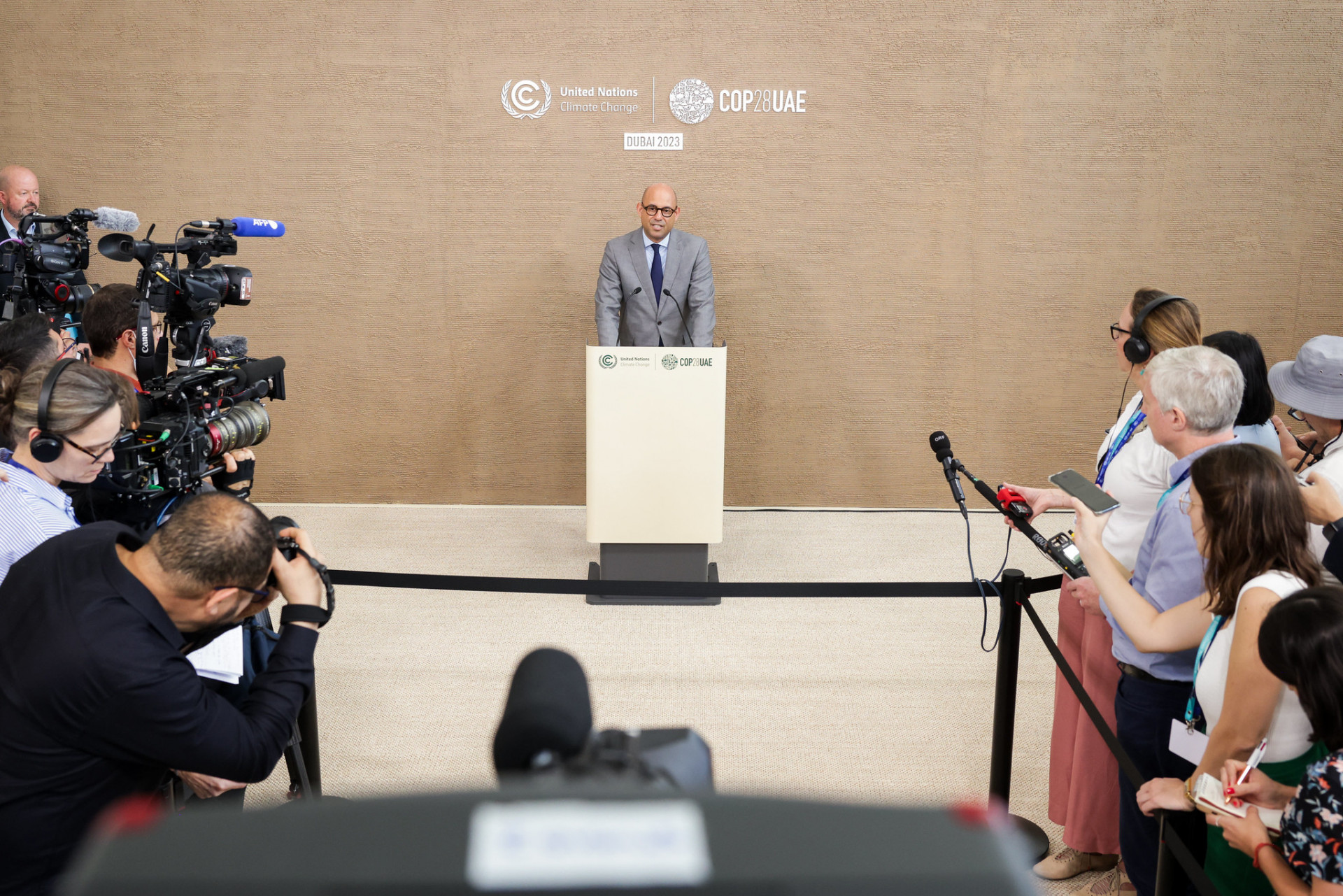
UN Climate Change Executive Secretary Simon Stiell spoke to journalists at COP28 today, calling on governments to start delivering serious climate solutions. Here are a few excerpts from his statement:
"The Global Stocktake is the vehicle to get climate action back on track. Finance is the great enabler of climate action. The negotiations must put it front and center. Loss and damage was a win. But we’re kidding ourselves if we think it's a tick in the box for finance and support at this COP; more is required."
"At the end of next week, we need COP to deliver a bullet train to speed up climate action. We currently have an old caboose chugging over rickety tracks."

Transparency in climate action is key to building trust and confidence among party and non-party stakeholders. It paves the way for mutual understanding and builds the foundation for the global conversation on where progress can be made towards meeting the goals of the Paris Agreement.
During COP28, UN Climate Change is hosting a series of Transparency Roundtables under the banner of the #Together4Transparency initiative, to discuss how to better engage non-party stakeholders in transparency-related matters, especially under the Enhanced Transparency Framework (ETF).
All events are open, and registration is recommended – register here.
Join us on a trip down memory lane through our UNFCCC archive collection on display at COP28. Watch video clips of historic moments at COP sessions and browse photographs of delegates at various sessions throughout the years.
Dating back to the early 1990s, the UNFCCC archive collections is now a world-leading resource on climate change negotiation processes. The archives consist of a plethora of paper files, audio-visual recordings, photographs, and digital materials.
Visit us to learn more! We look forward to welcoming you in the UNFCCC Pavillion located in Building 24 in Zone B2.
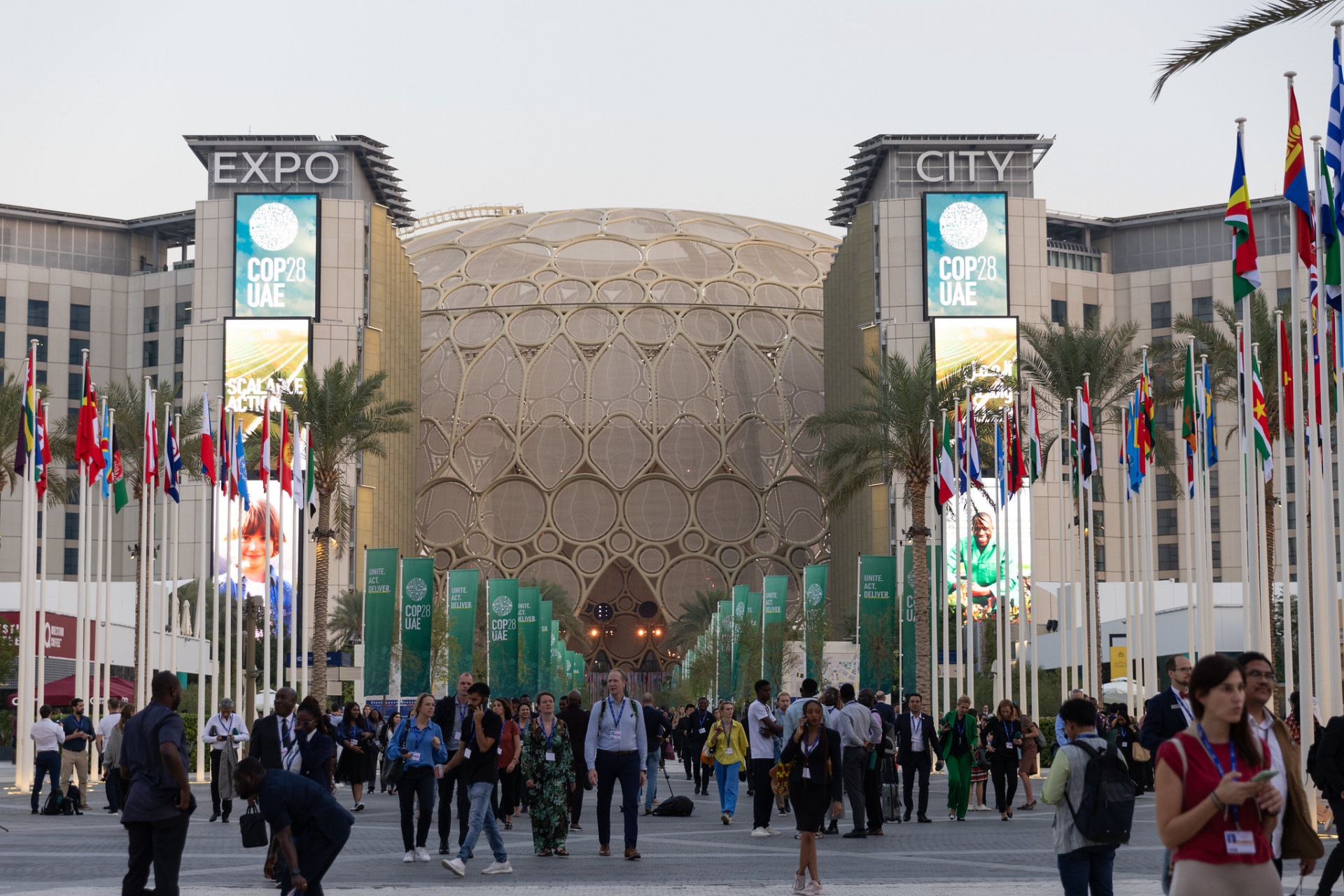
A series of high-level events at COP28 helped move the world’s first global stocktake closer to a conclusion that aims to increase ambition and accelerate action on climate change by informing the next round of climate action plans due in 2025.
During the conference’s first week, world leaders shared their views and expectations for the global stocktake’s outcome during a series of roundtables.
Governments will take a decision on the global stocktake at COP28, which can be leveraged to raise ambition and action in this decade.
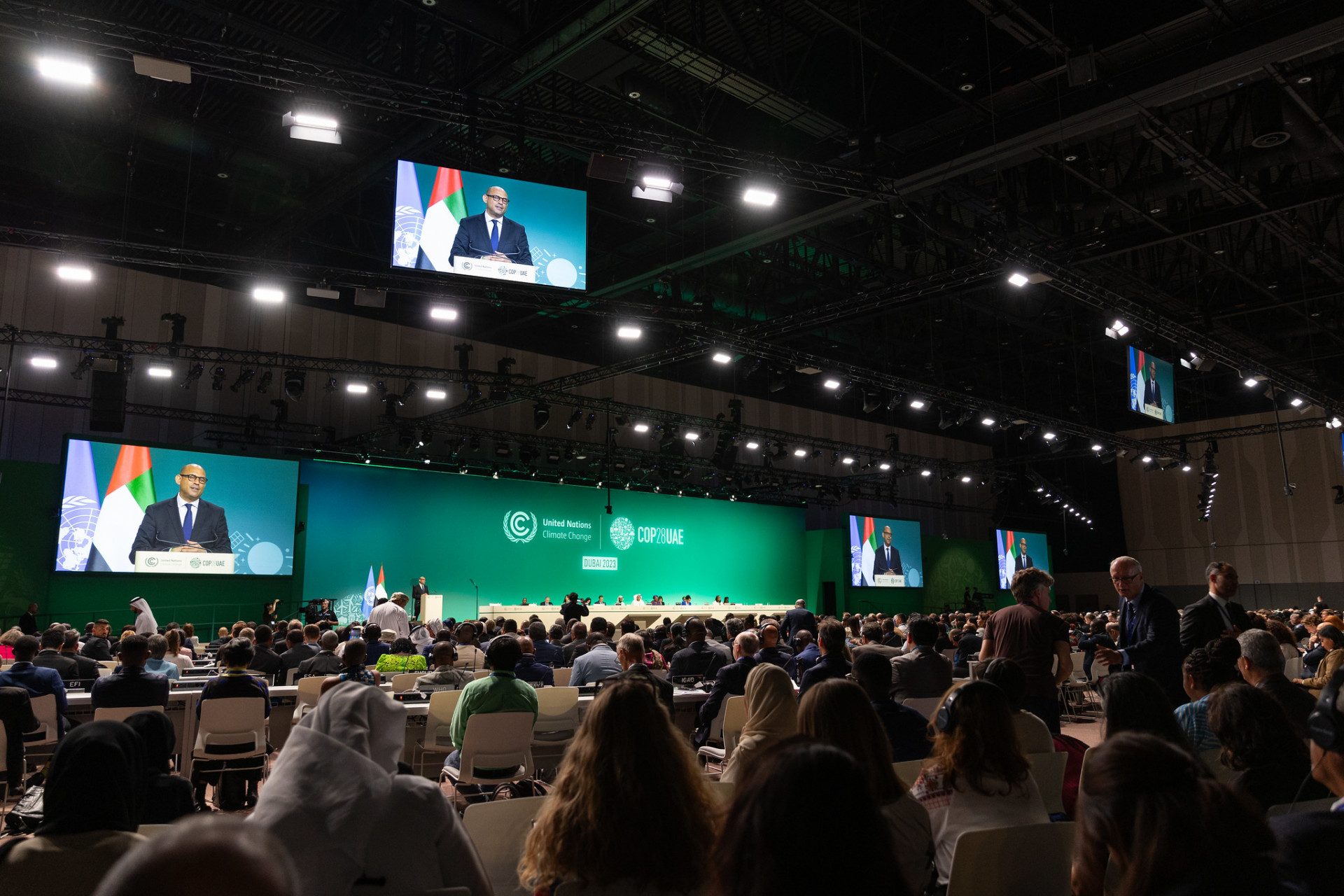
Climate finance is extremely important for developing countries, which are disproportionately affected by the impacts of climate change. A report released Monday estimated that emerging markets and developing countries will need $2.4 trillion a year in investment to cap emissions and adapt to climate change.
In a sign of positive momentum for climate change financing, several funding announcements have poured in during the first week of COP28. For example, eight donor governments announced new commitments to the Least Developed Countries Fund and Special Climate Change Fund totaling $174.2 million. The Adaptation Fund has also mobilized nearly $160 Million in new pledges at COP28 for the most climate-vulnerable. And more than $650 million has been pledged for the Loss and Damage Fund.
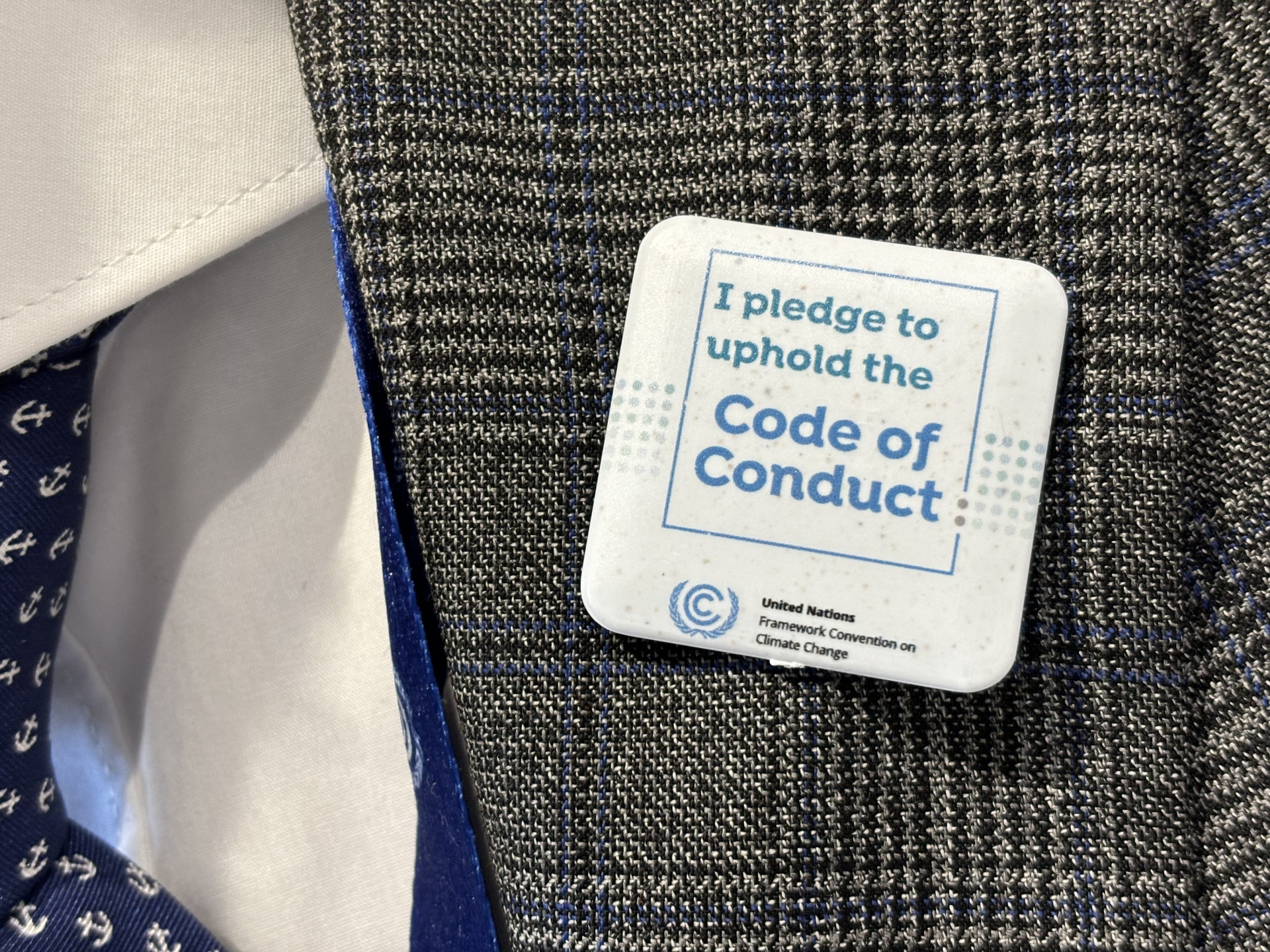
Get your UN Climate Change Code of Conduct pin at the Blue Zone Service Hub (Building 39, Zone B4) to promote a respectful and inclusive space for all at COP28. Follow the Code of Conduct and rally others to do the same:
Ensure a safe space: It's on all of us to maintain a respectful, harassment-free environment at COP28.
Report issues: Witness or experience a problem? Report it to UN security or here.
Follow rules: Respect event rules, protocols and UN procedures.
Show respect: Treat flags, name plates and UN symbols with respect.
Privacy matters: Follow UN guidelines for photos and recordings.

Fashion is everywhere we look. It transcends borders and has a huge political, economic and cultural impact. It is also an industry responsible for a significant amount of greenhouse gas emissions.
UN Climate Change is organizing a Fashion Charter event at COP28 today that will bring policy makers, brands, suppliers and NGOs together to take stock on key levers – like policy and regulation, finance and accountability – for a fashion industry makeover.
Representatives of brands like Puma, H&M, Ellen McCarthur, and suppliers like TAL Apparel and Crystal Group will be on hand to discuss opportunities and challenges that the industry is facing in decarbonizing supply chains.
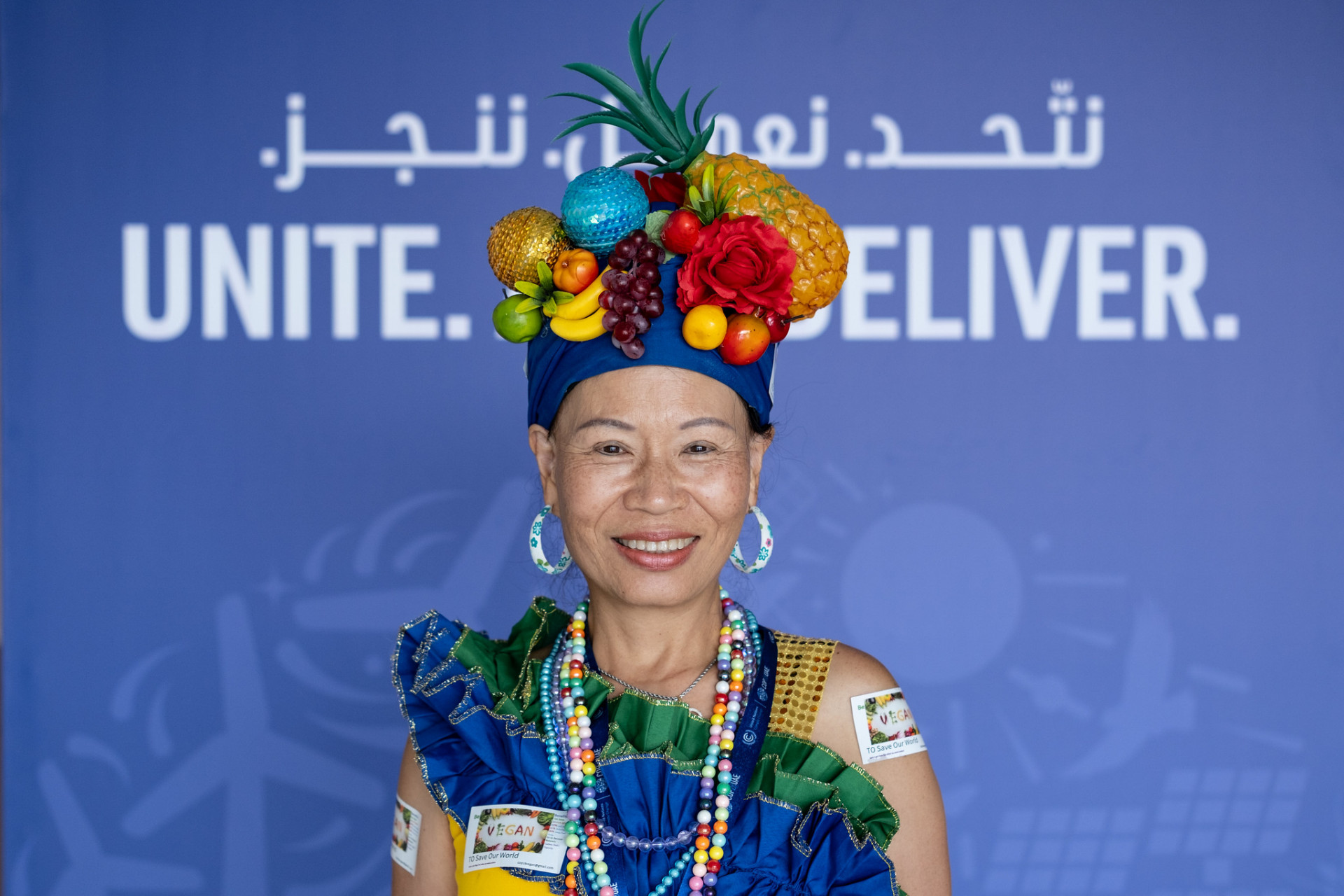
Indigenous Peoples play a key role in finding climate solutions. Faced with adaptation challenges for centuries, they have developed strategies for resilience in changing environments that can strengthen current and future adaptation efforts.
“Indigenous Peoples are on the frontlines of the climate crisis. They are well placed to lead just transitions based on their time-honoured values, knowledge and world-views,” said UN Climate Change Executive Secretary Simon Stiell.
Today’s roundtable with indigenous youth and youth from local communities will present recommendations on the meaningful participation of Indigenous Peoples in climate policies and action.
Learn more about the UN Climate Change Local Communities and Indigenous Peoples Platform
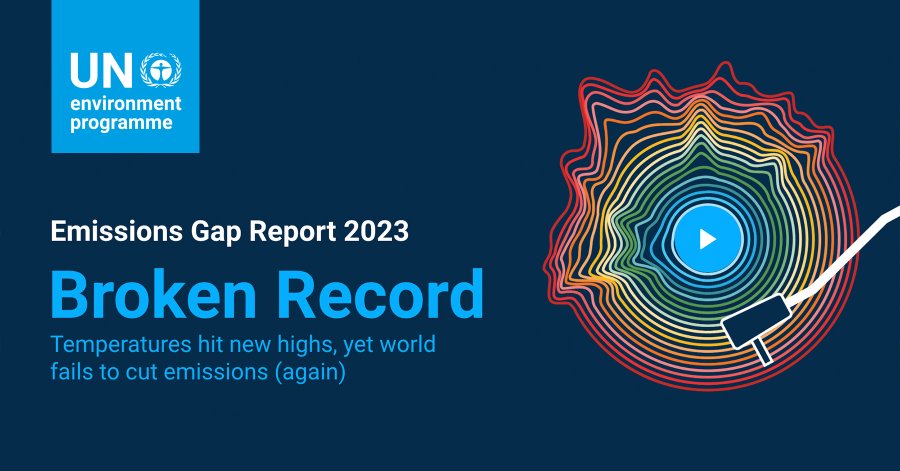
UN Environment Programme is hosting two back-to-back events at COP28 today to talk about their recently released flagship reports: the Adaptation Gap Report and the Emissions Gap report.
The Adaptation Gap Report finds that progress on climate adaptation is slowing when it should be accelerating to catch up with these rising climate change impacts.
The Emissions Gap Report finds that the world is heading for a temperature rise far above the Paris Agreement goals unless countries deliver more than they have promised.
Watch the Adaptation Gap Report event live at 9:00 here.
Watch the Emissions Gap Report event live at 10:00 here.
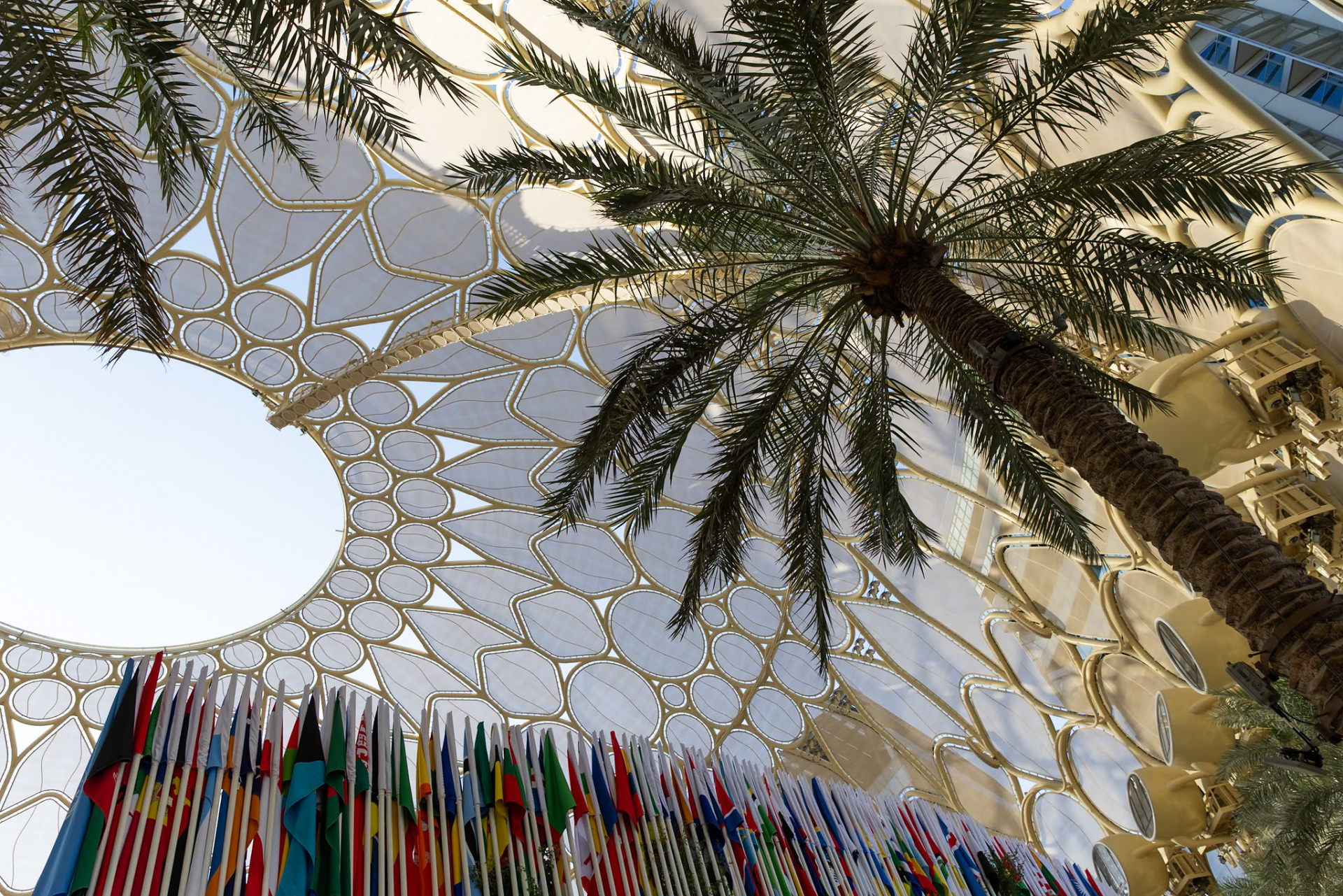
National adaptation plans are key for developing countries to identify their resilience-building needs and access the necessary funding to implement adaptation action.
Join a high-level event to discuss the transformation needed for an accelerated implementation of national adaptation plans and the urgent need to build up adaptation finance, capacity development and technology to help as many countries as possible meet their adaptation needs.
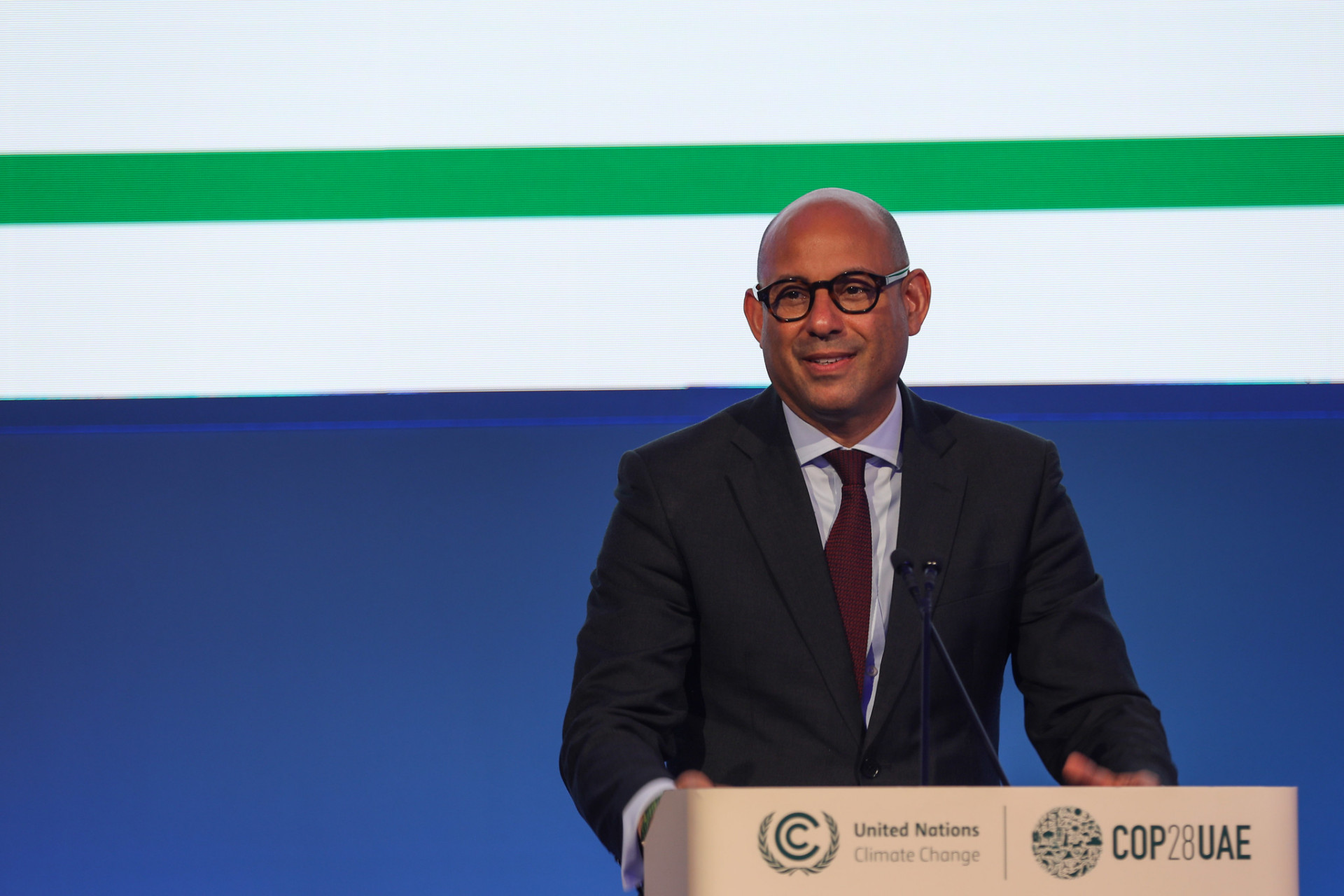
Interested in learning more about the Adaptation Fund? Today is Finance Day at COP28 with various finance-related events underway. One worth noting is the “Contributor Dialogue” where contributor governments will express their support for the Adaptation Fund and announce new pledges towards the US $300 million resource mobilization target.
They will also discuss scaling up financing for adaptation, including doubling adaptation finance. New pledges and contributions to the Adaptation Fund will help finance the Fund's growing pipeline of project proposals worth nearly US $500 million.
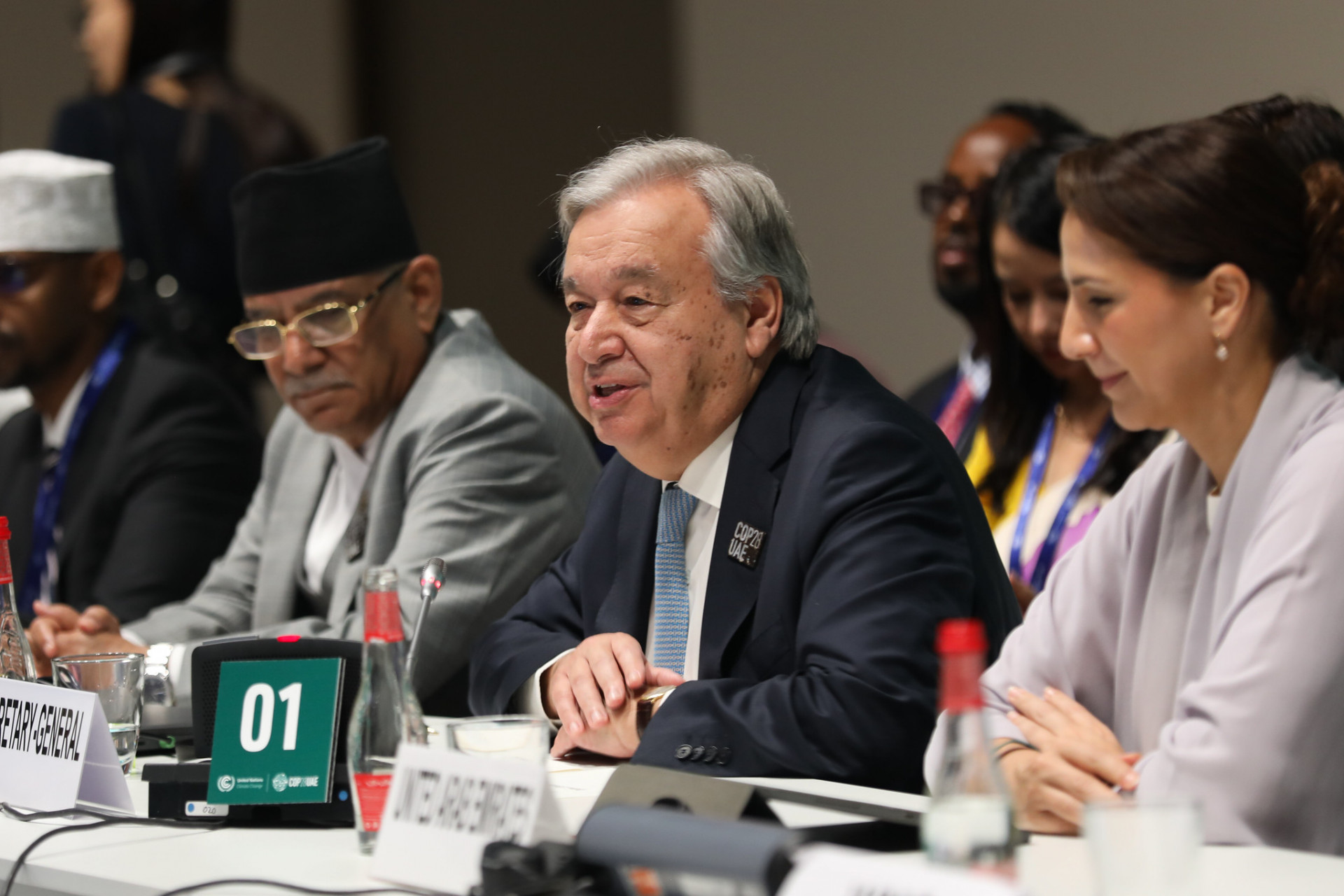
Get a closer look at how COP28 is unfolding and use UN Climate Change’s material for your reporting. Pictures are published on Flickr and can be used free of charge.
Credit details are given under each photo, please don’t forget to use them! Please see our licensing terms and conditions for more information.
We also invite you to register on the Expo City Dubai Content Portal for pictures from our host country colleagues. See and use the latest high-resolution photographs from these historic negotiations.
More information is available in our Media Bulletin Note.

Climate change disproportionately impacts vulnerable populations, especially women in poverty due to their reliance on natural resources and limited access to decision-making. Despite challenges, women are responding to climate change through their own expert knowledge and leadership on sustainability.
COP28’s Gender Day is focusing on ensuring inclusive policies for a just transition that recognizes women's crucial role in fostering resilient communities and effective climate action, emphasizing the need to improve the gender-responsiveness of climate resources and finance.
More information on Gender & Women at COP28
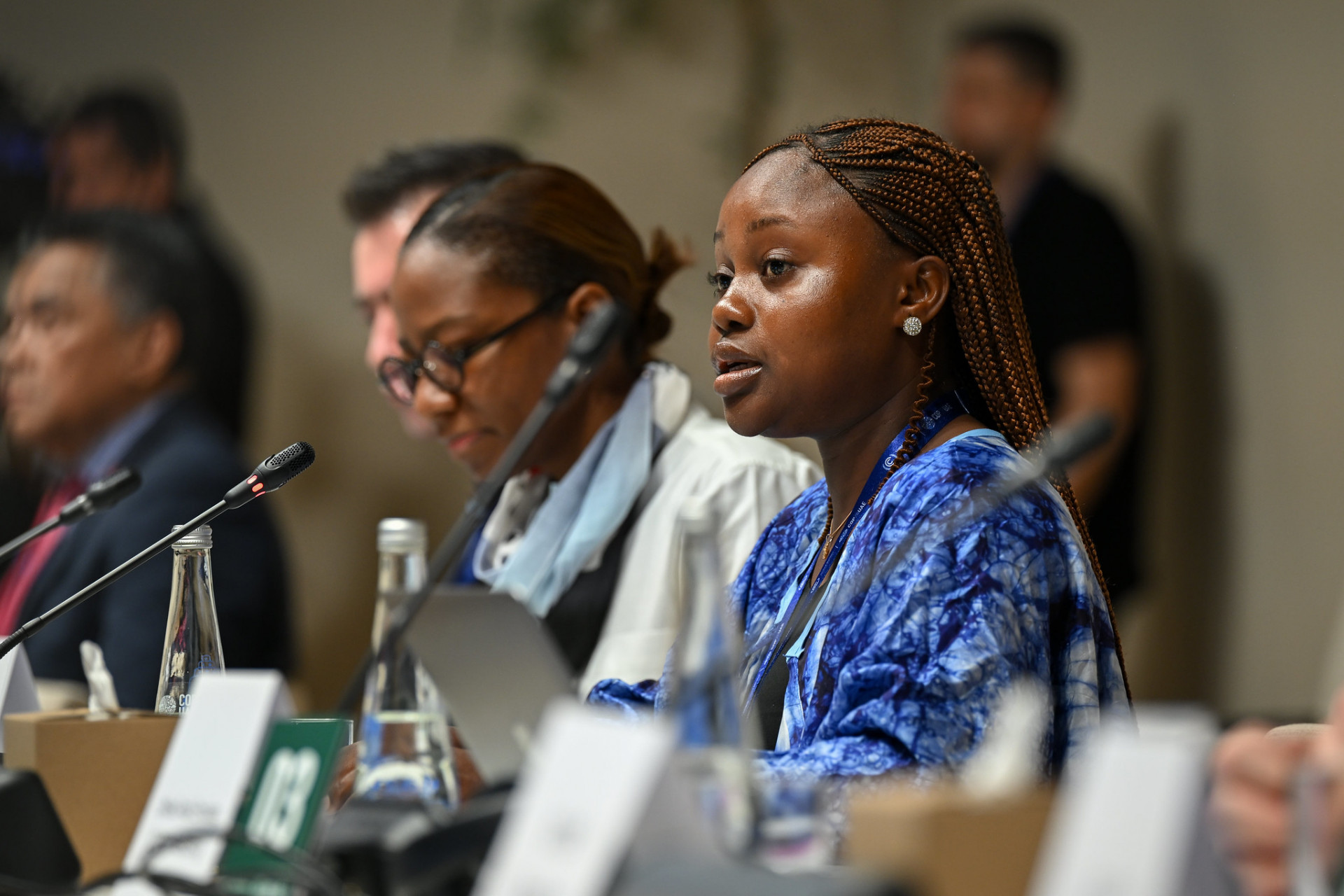
4 December: Gender Day & Finance/Trade/Accountability Day
5 December: Just Transition/Indigenous Peoples Day & Energy/Industry Day
6 December: Multilateral Action Day & Urbanization/Transport Day
7 December: COP28 Rest Day
8 December: Youth, Children, Education and Skills Day
9 December: Nature, Land Use and Oceans Day
10 December: Food and Agriculture Day & Water Day
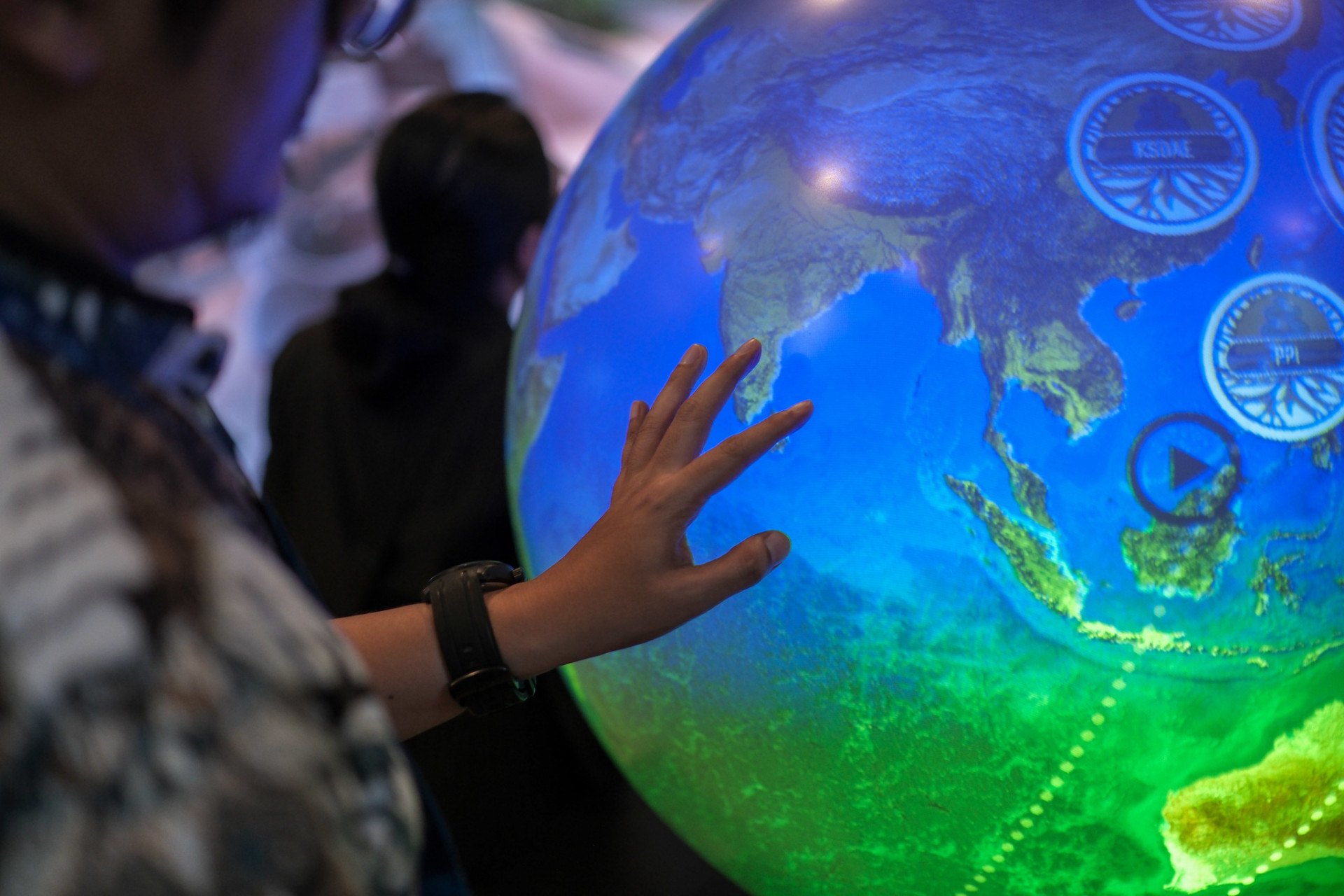
Two young people will be celebrated as winners of the UN Global Climate Action Awards at COP28 later this week.
Michelle Zarate Palomec of Mexico and Sebastian Mwaura of Kenya were selected from hundreds of applicants from 120 countries for their outstanding efforts to make their communities more sustainable, resilient and equitable places to live.
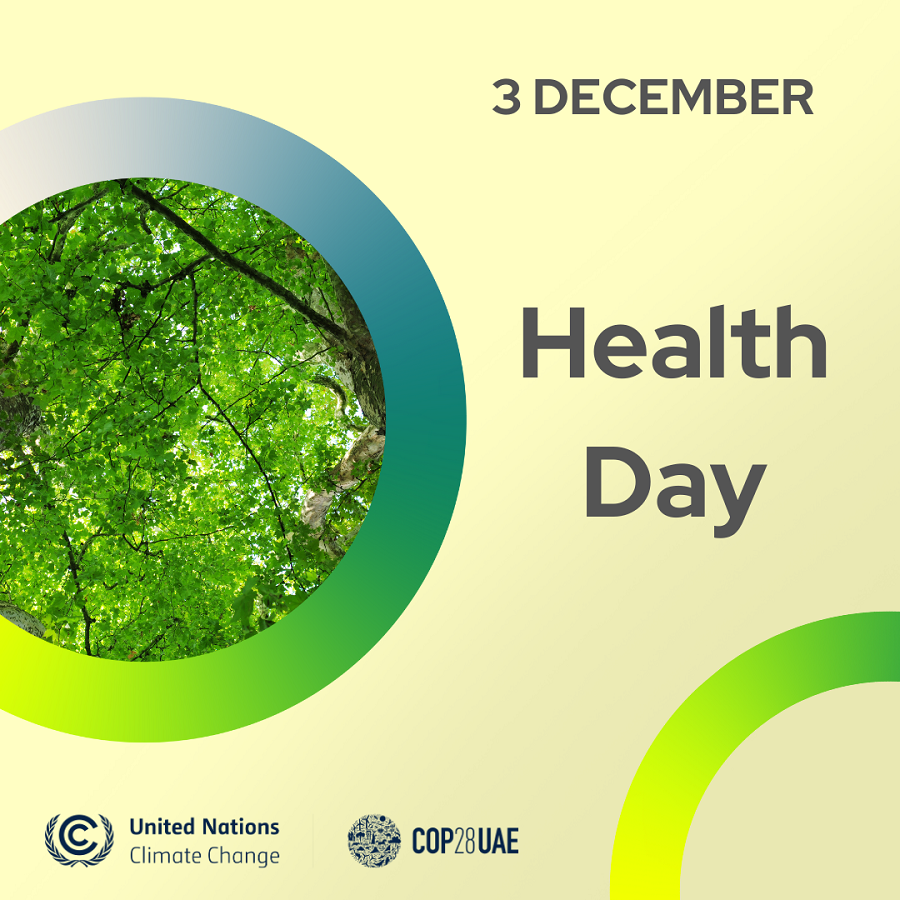
Elena Villalobos Prats from the World Health Organization (WHO) talks about the first climate-health ministerial at a COP.
Ministers of health, environment, finance and other related sectors will set out a roadmap and opportunities for actions to address the impact of climate change on human health.

Today’s high-level #Together4Transparency opening kicks off a series of events that crosscut COP28 themes: stakeholder engagement, limiting warming to 1.5 degrees Celsius, tracking and support, and the intended outcome of the Global Stocktake.
#Toghether4Transparency events will spread awareness about the key role of transparency for the effective implementation of the Paris Agreement.
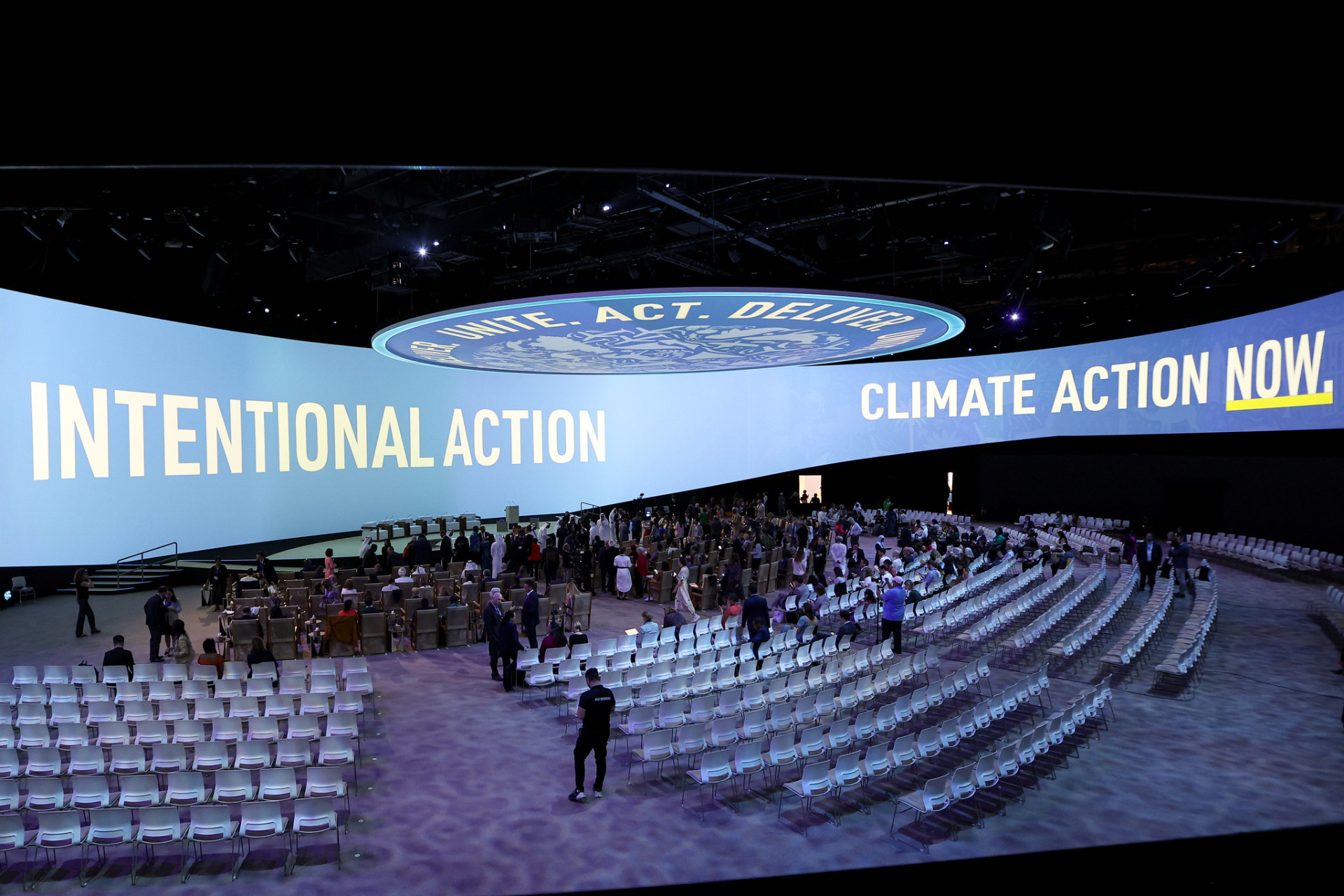
Transitioning away from the fossil fuel era is no small feat. We’re talking about one of the biggest transformations in human history. It will require massive changes to our economies, our infrastructure, and our workforce.
Getting this transition right means leaving no one behind.
Taking place at COP28 this afternoon, the first annual high-level ministerial roundtable on just transition will focus on implementing just transitions and on the scope and direction for the work programme on just transition.

Until 10 December, the 5th Capacity-Building Hub will host 56 events showcasing experiences and ideas to strengthen capacity-building for more ambitious climate action.
This year, the Hub brings together diverse partners, including the Organisation for Economic Co-operation and Development, the United Nations University Institute for Environment and Human Security, ICLEI-Local Government for Sustainability, onepoint5, the Climate Policy Initiative, Impulsouth, the Office of the United Nations High Commissioner for Human Rights and the Center for International Environmental Law.
All the Hub events will be livestreamed on the Paris Committee on Capacity-building YouTube channel.
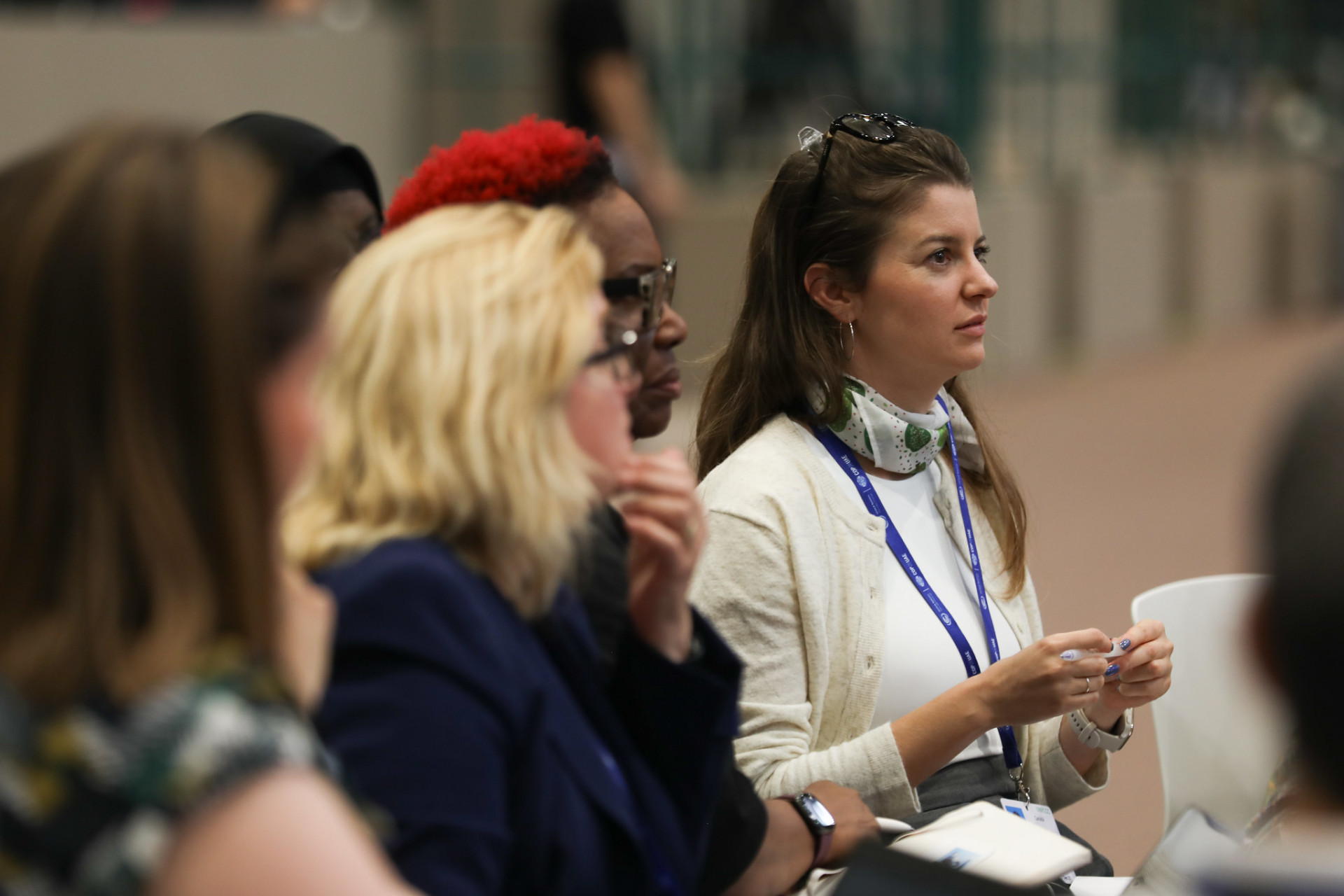
Delegates at COP28 are welcome to join the full-day session (from 10:00 to 17:00) to learn about the latest insights on systematic observation and its vital role in understanding climate change.
Understanding, monitoring and prediction of weather and climate ultimately relies on observations. Systematic observation is therefore the foundation of a climate services value chain that connects observations to decision-making to both understand climate change and support decisions on climate change action.
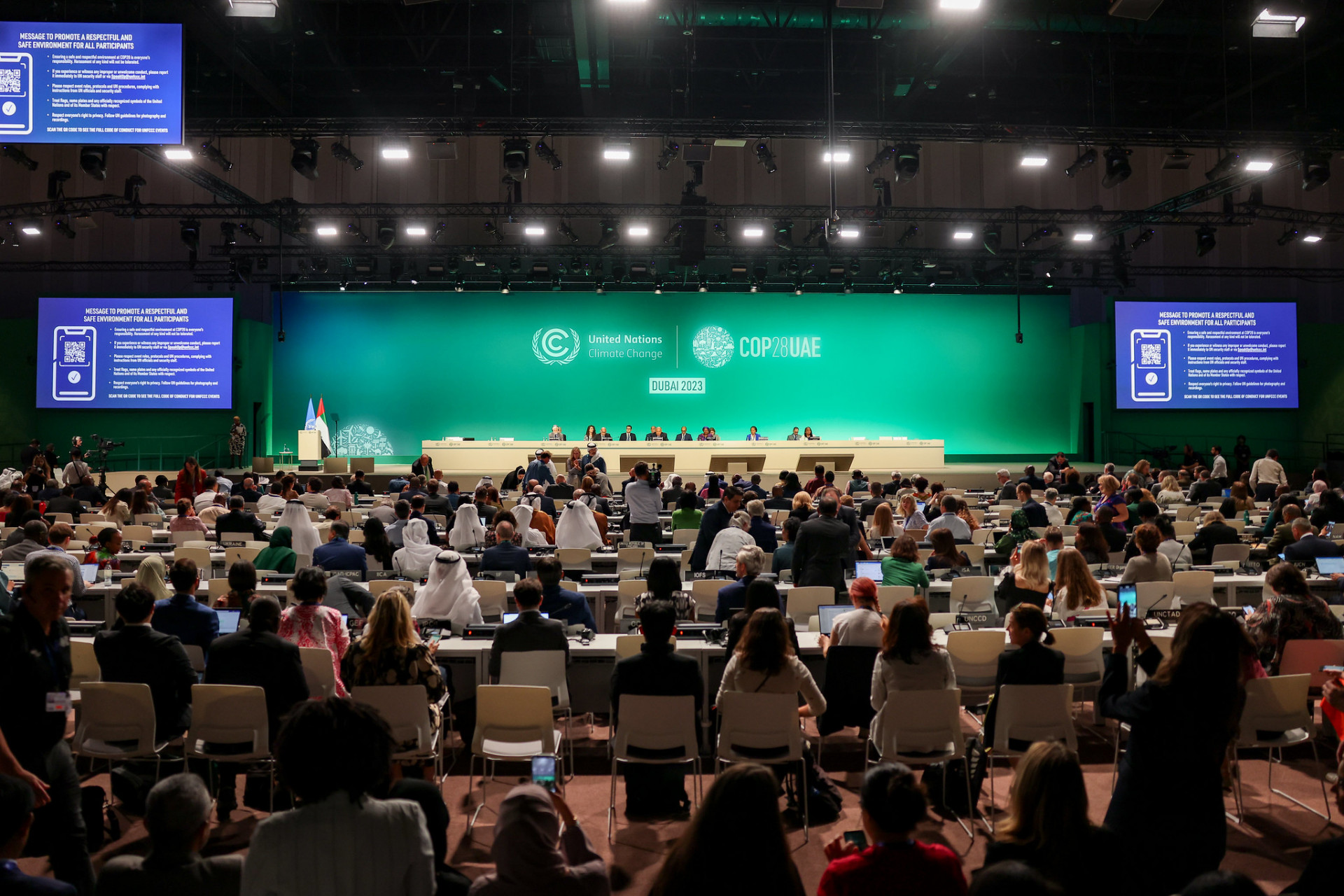
The new collective quantified goal on climate finance, or NCQG, is in the spotlight this morning.
Defining a new goal on climate finance by 2024 is one of the most pivotal opportunities to accelerate global climate action this decade. The new goal will supersede the USD $100 billion target agreed in 2009 and is meant to mobilize and deliver finance in a way that addresses the needs of developing countries.
Starting at 10 a.m., a high-level ministerial dialogue on the NCQG will provide guidance on the ad hoc work programme by focusing on the approach to the scale, the elements of the goal in relation to the scale and the mode of work for next year to reach an agreement in 2024.
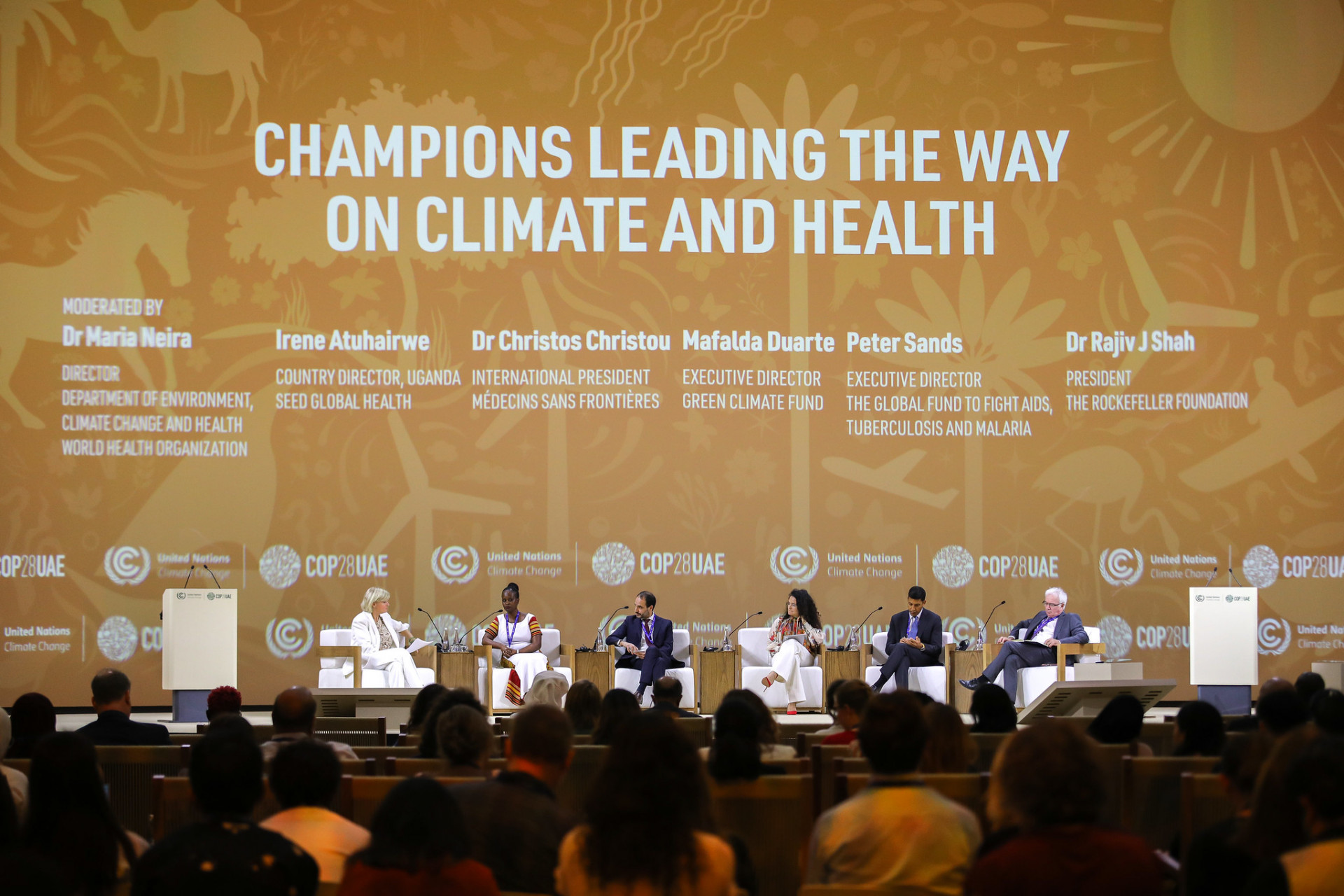
Climate change presents a fundamental threat to human health.
More frequent and intensifying weather and climate events affect health both directly and indirectly, increasing the risk of death, the emergence and spread of infectious diseases and health emergencies.
Health Day at COP28 will highlight the health benefits of climate action and promote adaptation measures to address the impacts of climate change on human health.

In case you missed it, we released one of our flagship publications: the Yearbook of Global Climate Action 2023 earlier this week.
The 2023 Yearbook, the seventh of the series, provides an overview of the progress, trends and challenges of real-world climate action taken by non-Party stakeholders.
It finds that businesses, investors, cities, states and regions are stepping up to take climate action in greater numbers than ever before – just not at the pace or scale needed to limit global temperature rise to 1.5 degrees Celsius.
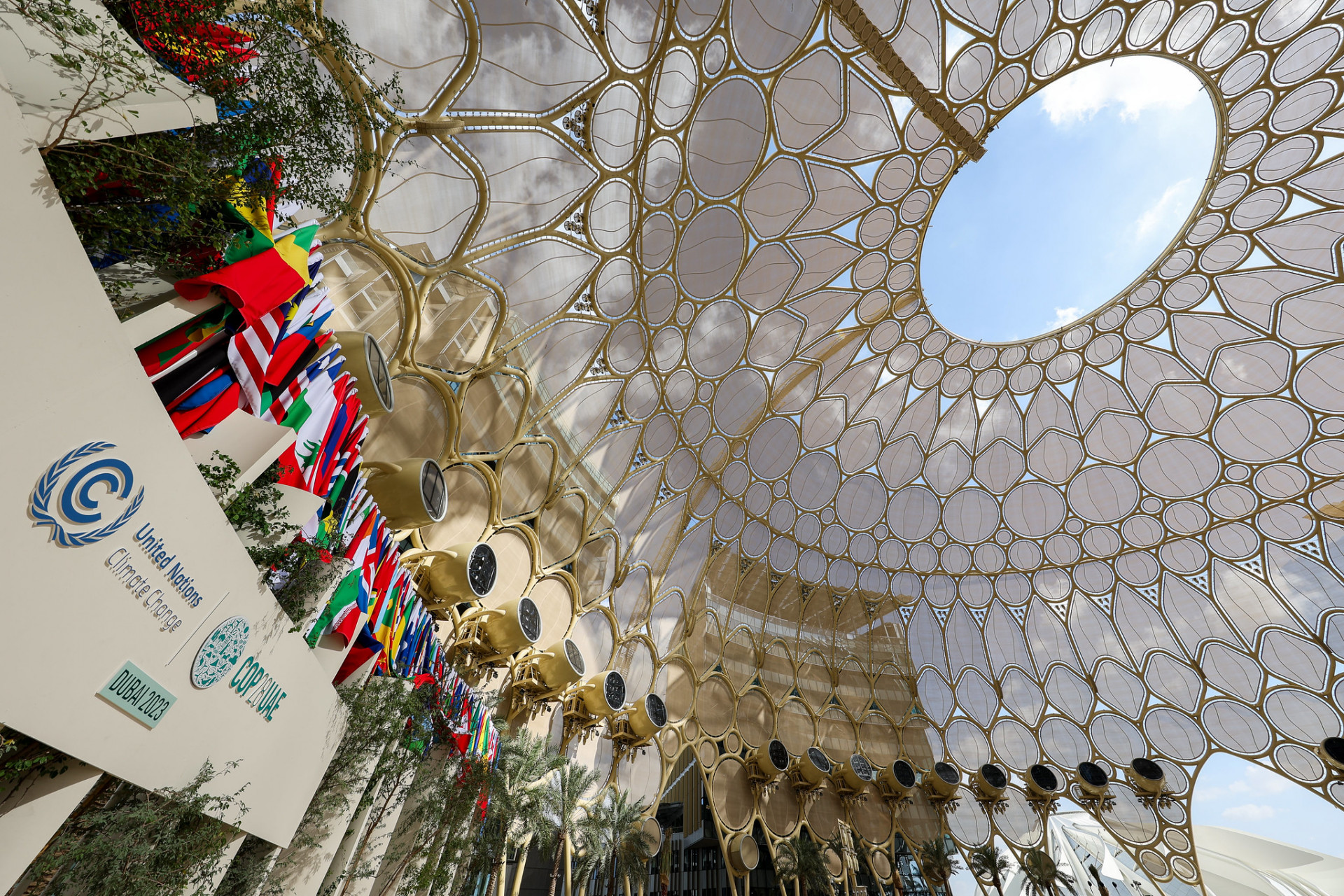
As world leaders convene at COP 28 to address collective gaps in global climate action as part of the Global Stocktake process, a groundswell of businesses, cities and regions, civil society organizations, youth and indigenous peoples offer real-economy solutions for a strong response to the Stocktake.
Tune in to the global climate action high-level opening ceremony to learn how governments are collaborating with the cities, regions, businesses and investors that are acting on climate change.
António Guterres, Secretary-General of the United Nations, will deliver the event’s keynote speech.
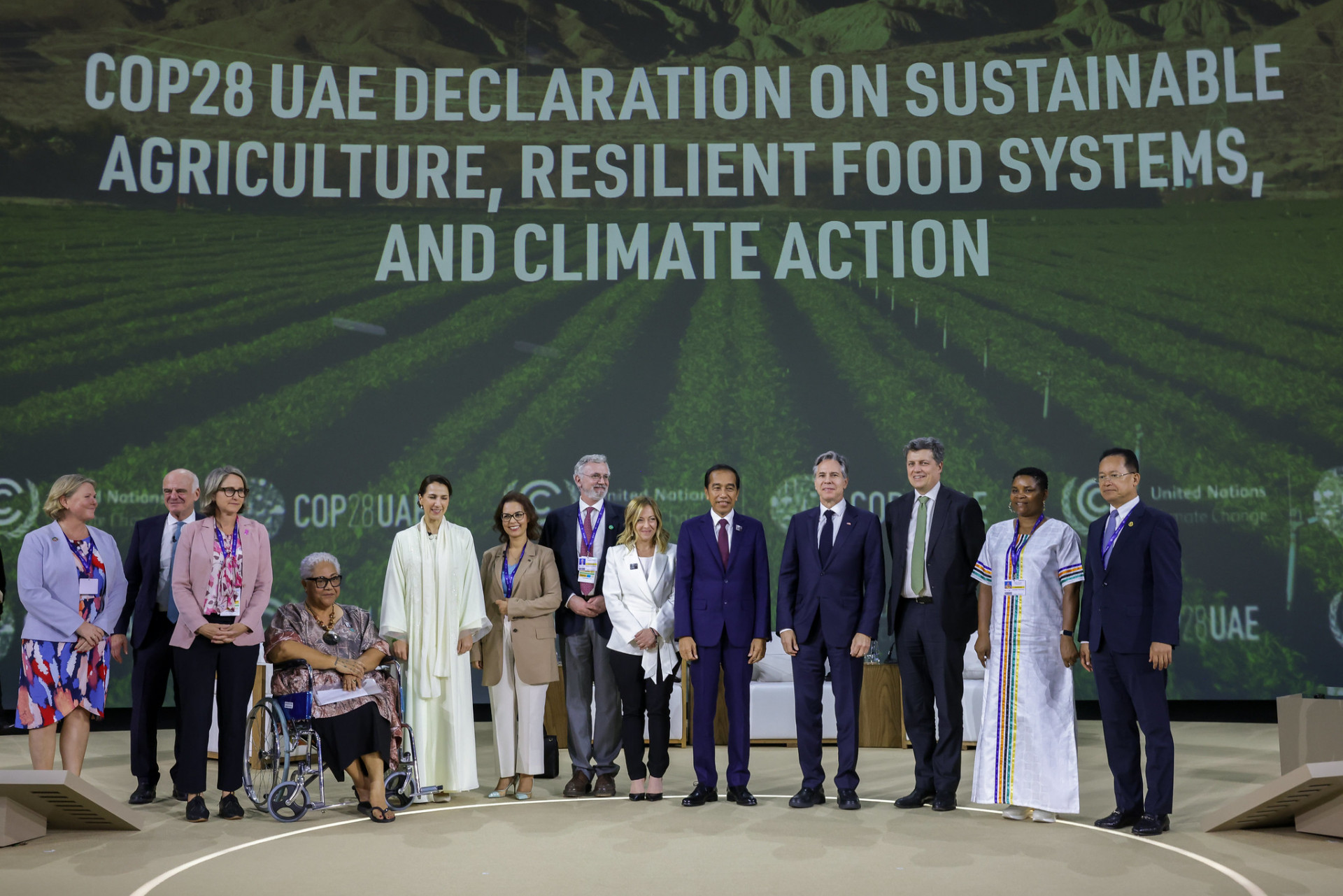
Food took center stage at COP28 yesterday, when 134 world leaders signed a historic declaration on agriculture, food, and climate action. More than $2.5 billion in funding to support food security while combating climate change will be mobilized.
The "UAE Declaration for COP28 on Sustainable Agriculture, Resilient Food Systems and Climate Action" – the first of its kind for the COP process – will help strengthen food systems, increase resilience to climate change, reduce global emissions and contribute to the global fight against hunger. The 134 signatory countries to are home to more than 5.7 billion people and almost 500 million farmers, produce 70% of the food we eat, and are responsible for 76% of all emissions from global food systems.
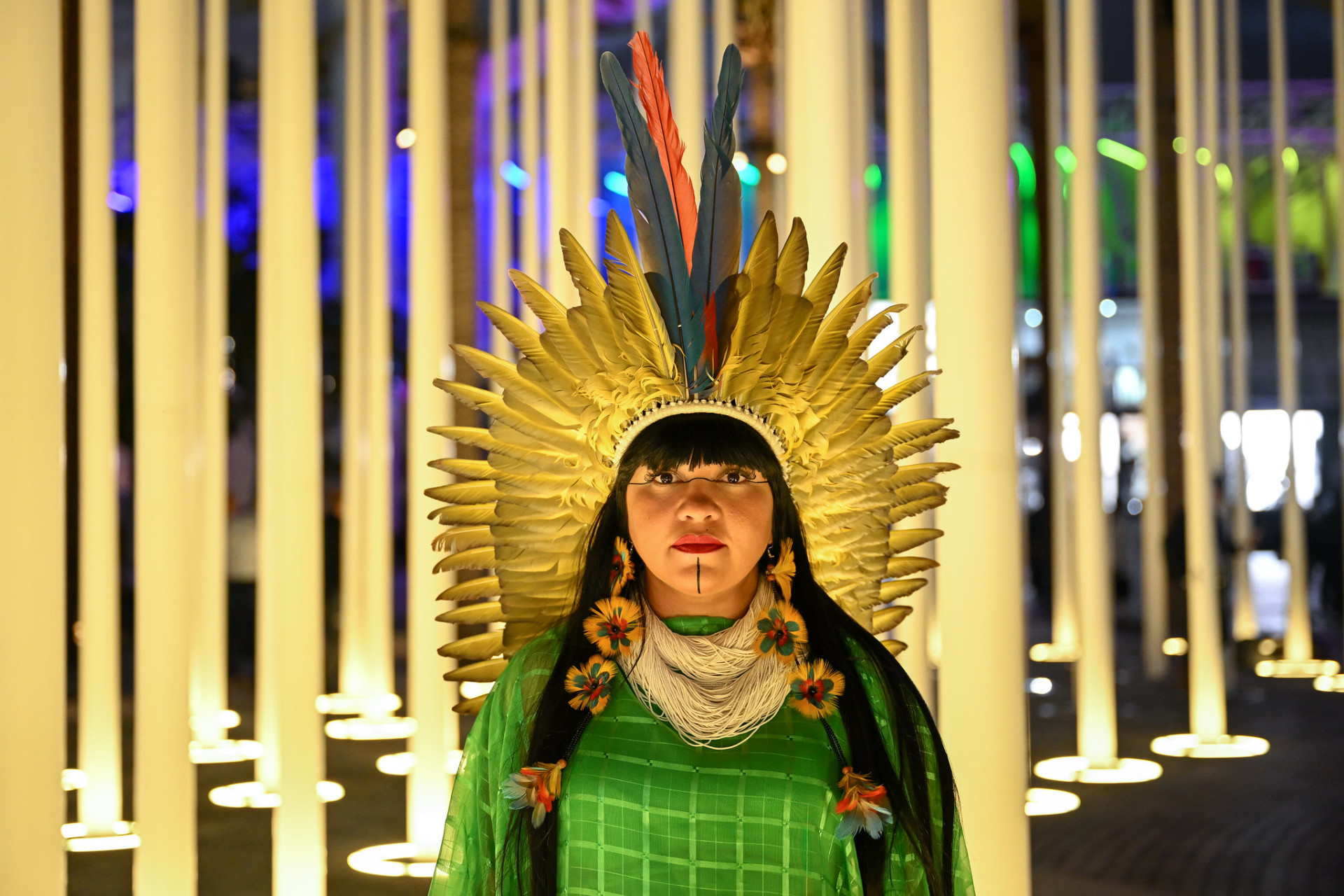
Whilst Indigenous Peoples represent around 6% percent of the world’s population, they safeguard an estimated 80% of the world’s remaining biodiversity.
"As future custodians of the planet, Indigenous youth have important insights into climate action and sustainable resource management that have been passed on from one generation to another,” said UN Climate Change Executive Secretary Simon Stiell. “These are invaluable and essential to help us deal with today's existential crisis.”
Today’s roundtable, from 13:00 to 18:00h in meeting room 9, zone B1, offers an opportunity for Indigenous youth and youth from local communities to exchange ideas and advocate for increased engagement in climate policy development and implementation.
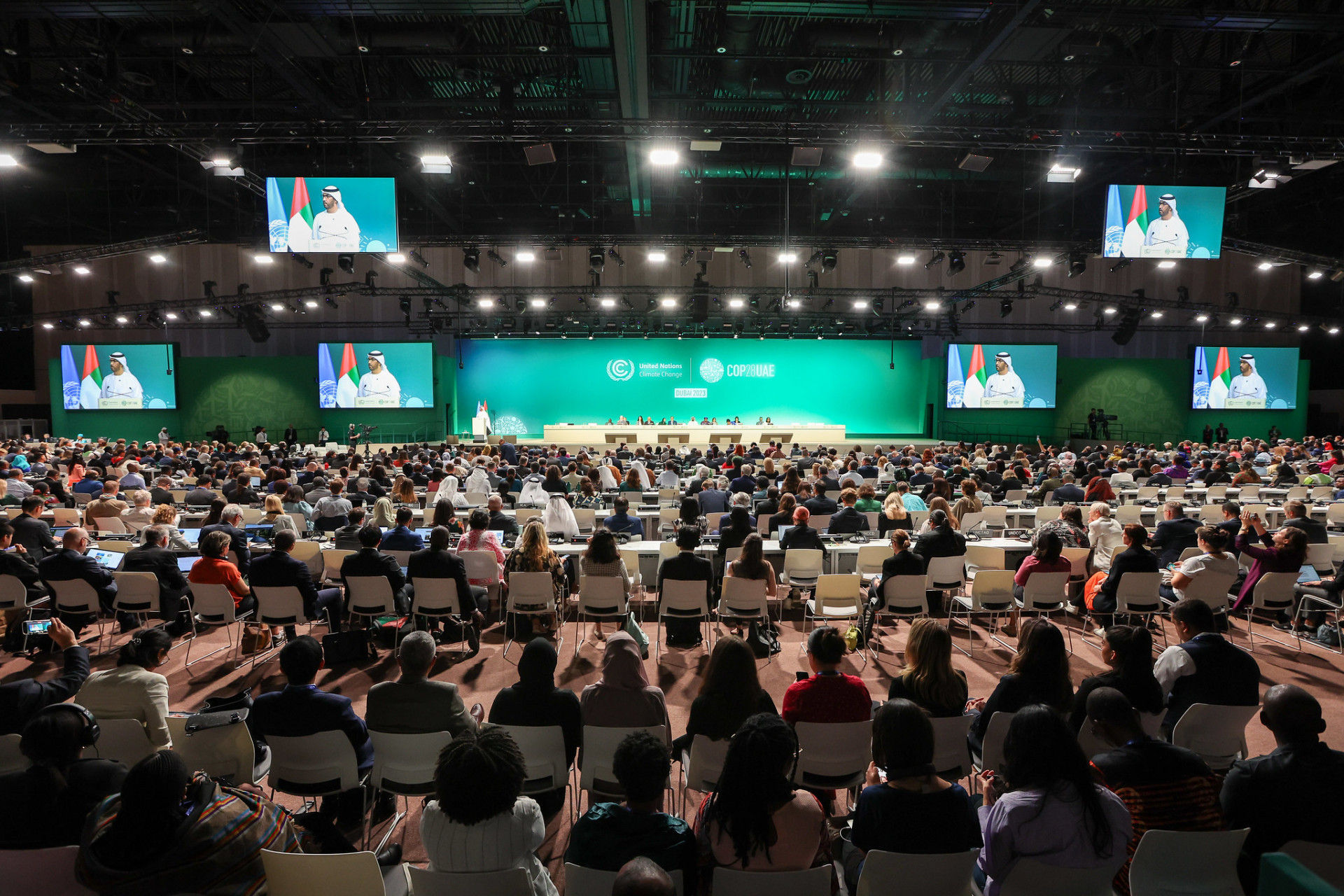
The world's first-ever 'global stocktake' will conclude at COP28 next week.
But what is the global stocktake and why is it important?
Think of it as taking inventory. It's about looking at everything related to where the world stands on climate action and support, identifying the gaps, and working together to chart a better course forward to accelerate climate action.
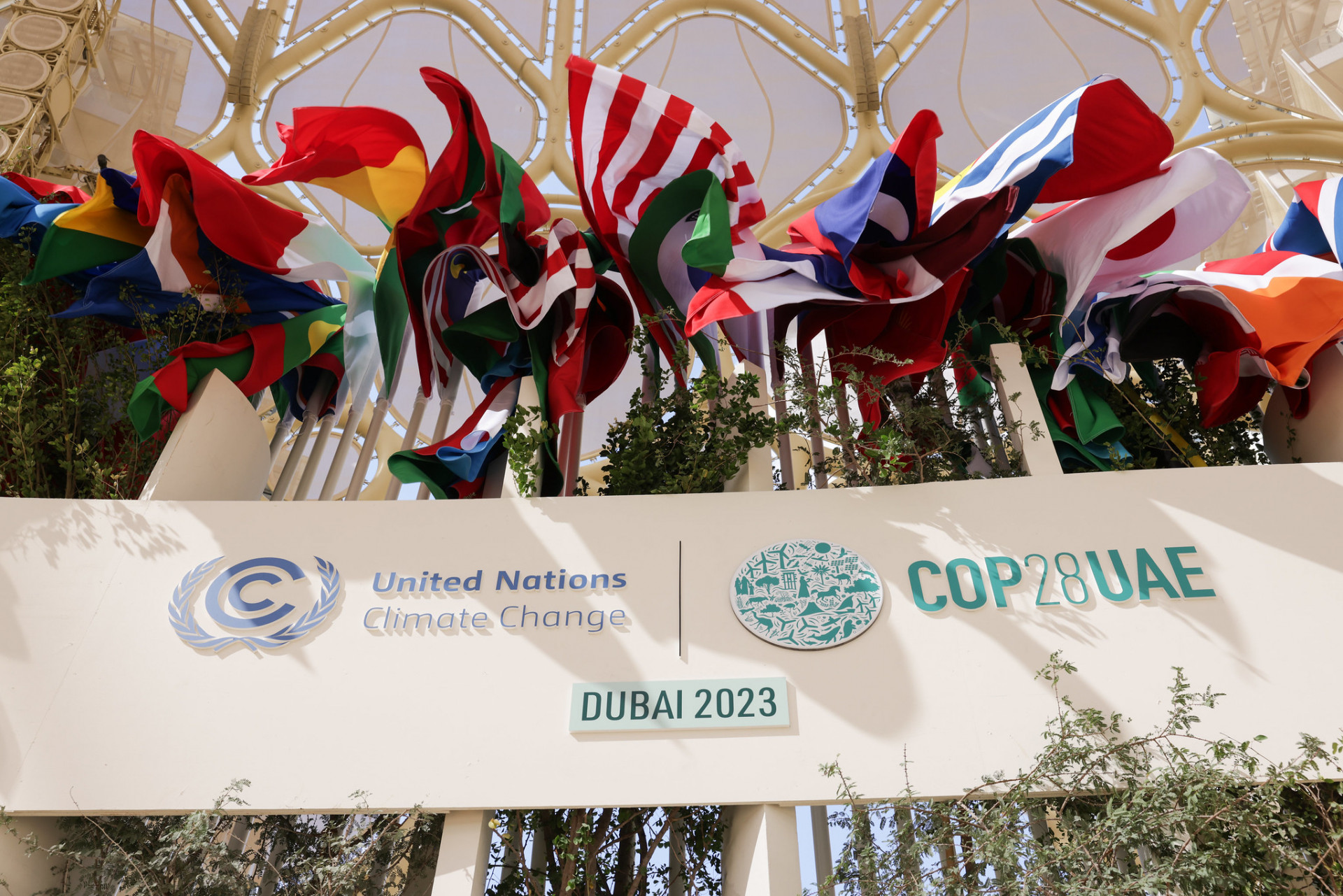
The final two high-level global stocktake events take place today.
Up first is the high-level event on means of implementation and support this morning. This is followed by the high-level event on mitigation this afternoon.
As space in the room is limited, registered delegates can watch live as discussions unfold on how the stocktake’s outcome can boost ambition and action on climate change.
- 9:00: High-level event on means of implementation and support
- 13:30: High-level event on mitigation
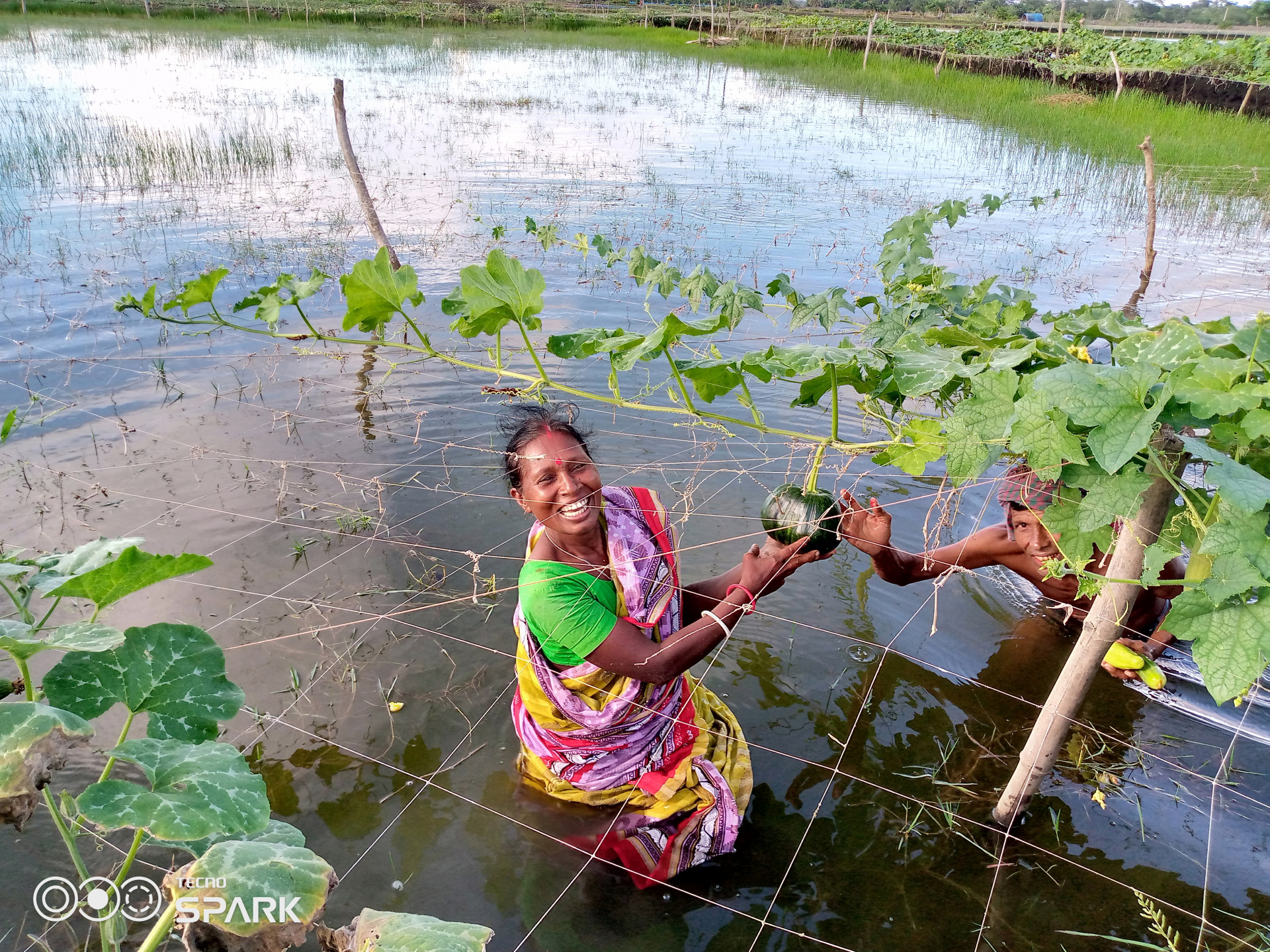
See how individuals and communities on the frontline of climate change are responding to loss and damage.
Join the launch of the photo exhibit today at 18:30 in side-event room 2 (Blue Zone).
After today, and for the duration of COP28, the “Loss and Damage in Focus: 10 years of the Warsaw International Mechanism” photo exhibit will be on display in meeting room 8.
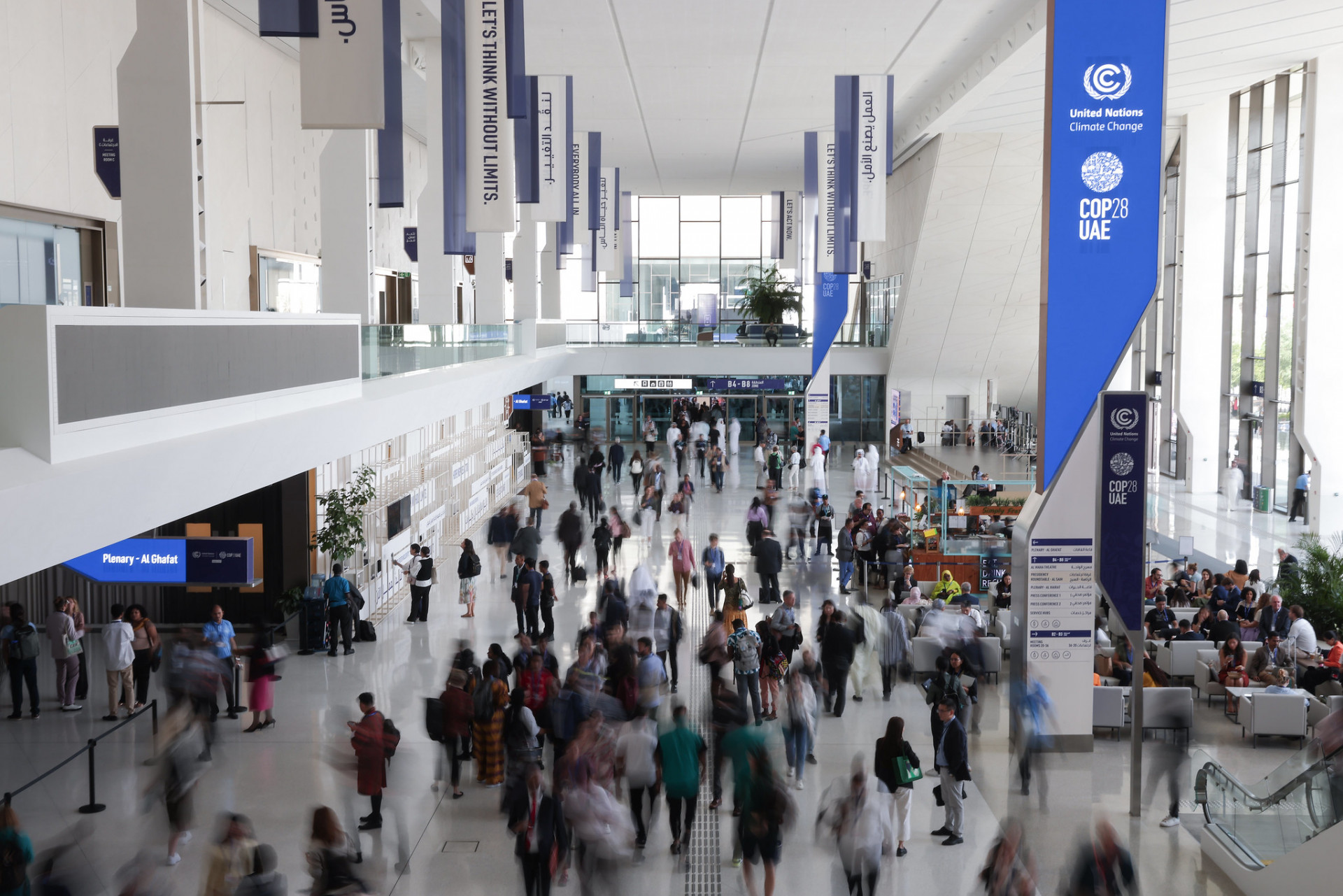
Climate finance is often cited as the ‘master key’ needed to unlock climate action.
Taking place this evening, the Needs-Based Finance High Level Side Event will showcase progress countries have made in facilitating access to and mobilization of long-term climate finance.
Government ministers and heads of agencies will share experiences, opportunities, and challenges in facilitating access to and mobilization of climate finance.
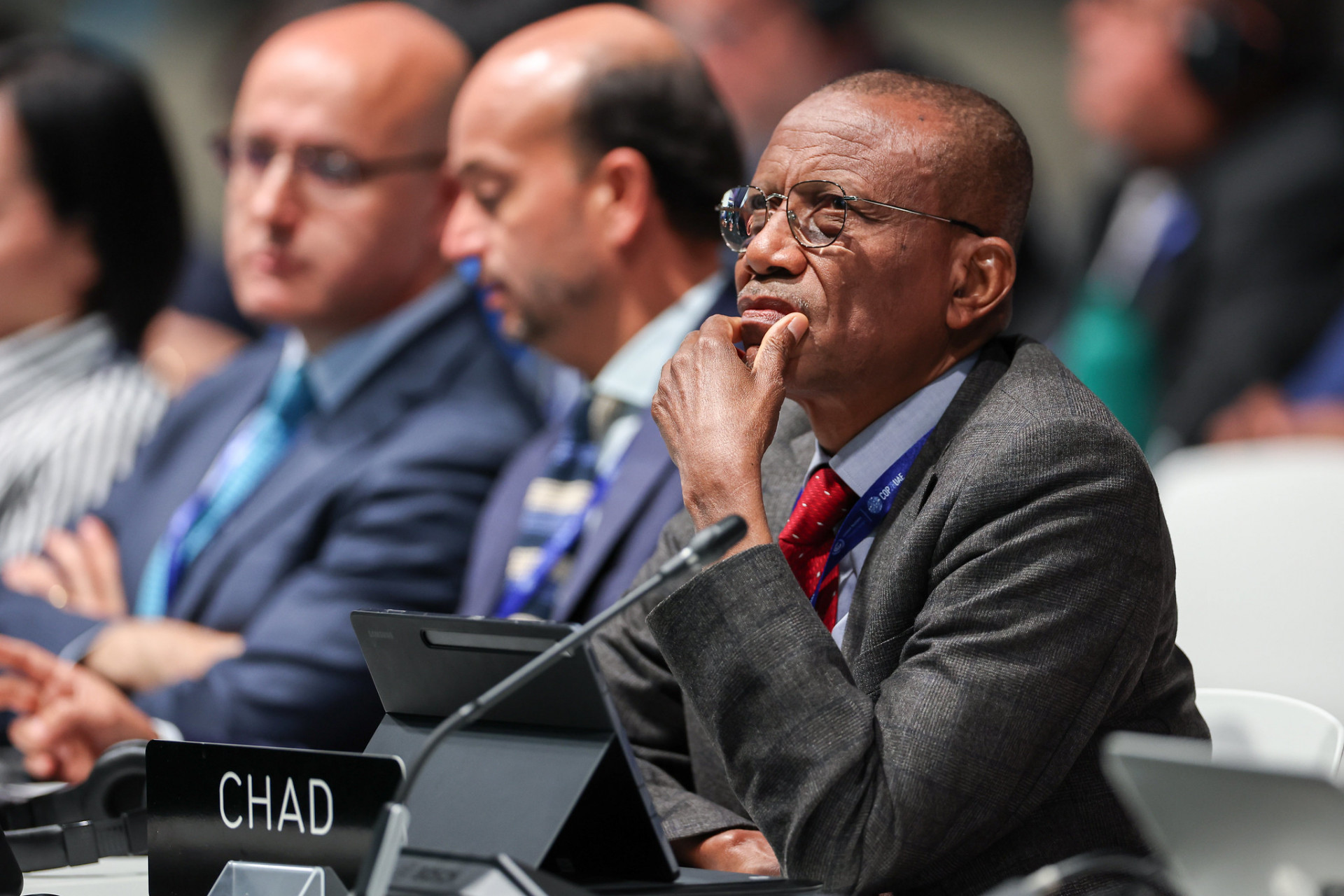
The first of three high-level events focusing on the global stocktake gets underway today. The first topic up for discussion? Adaptation.
As climate change threatens all countries around the world, increased adaptation action is urgently needed to reduce and respond to increasing impacts, particularly for those who are least prepared for change and least able to recover from disasters.
Delegates at the high-level event on adaptation will discuss how the stocktake’s outcome can bolster efforts for countries and communities to better adapt to the impacts of climate change.
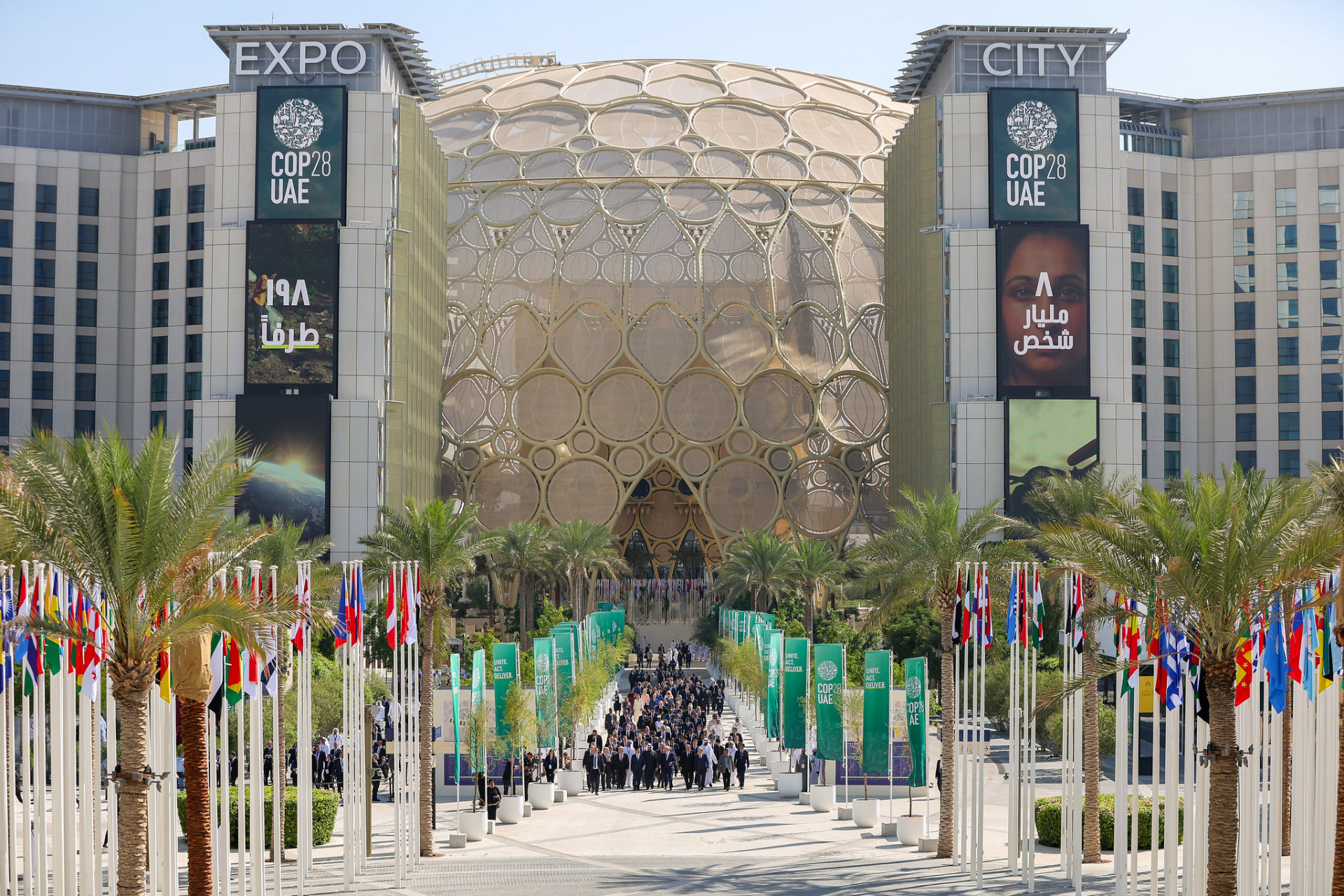
Blue zone: formal conference and negotiation space managed by UN Climate Change where official sessions, meetings, side events and press conferences are taking place. Zone only accessible to Party delegations, Heads of State, admitted observers and accredited press.
Green zone: managed by the COP28 host country, the United Arab Emirates, it’s a space for youth representatives, artists, businesses, regional and local decision-makers and many other civil society stakeholders to exchange ideas and solutions for a net-zero future in a more informal setting.
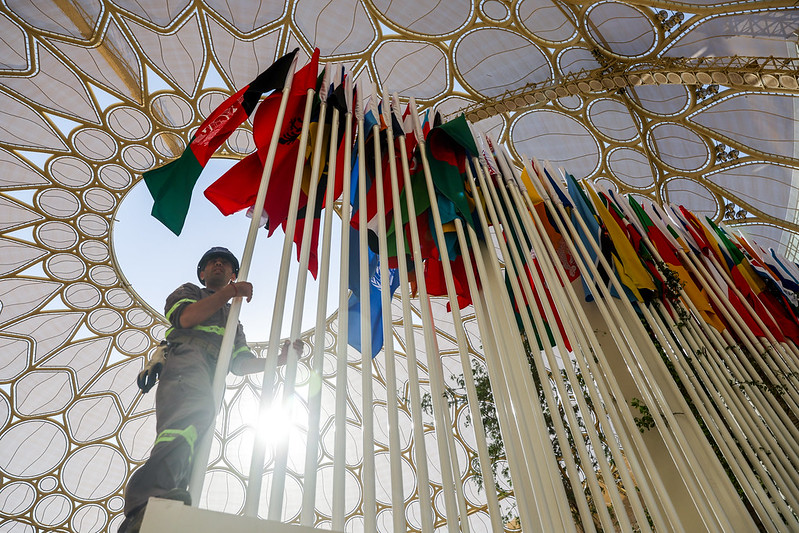
Today is a big day as world leaders start descending on the conference venue.
They’re here to take part in the World Climate Action Summit which gets underway today and tomorrow.
The Summit is an important moment for Heads of State and Government to signal their commitment to transform key climate related decisions into concrete actions and credible plans, and continue raising ambition to tackle climate change.
His Highness Sheikh Mohamed bin Zayed Al Nahyan, António Guterres, Secretary-General of the United Nations and His Majesty King Charles III will speak at the opening ceremony.
The Summit’s schedule of events can be found here.
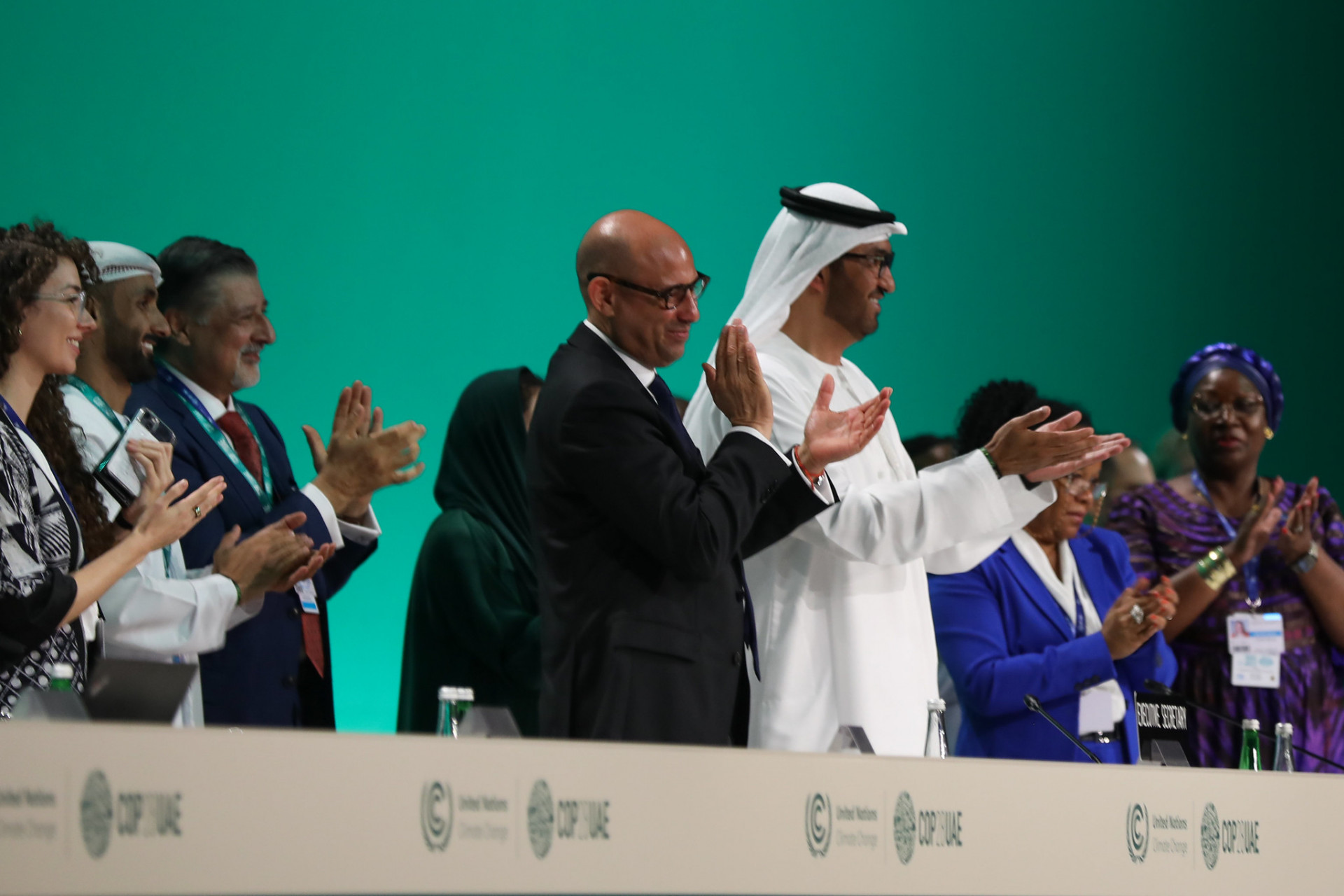
At the COP28 opening today all parties showed solidarity by agreeing to operationalize the loss and damage fund and funding arrangements.
Amid scenes of applause and jubilation in the Plenary Hall, several countries pledged money to the fund totaling some $300 million.
“Today's news on loss and damage gives this conference a running start,” said UN Climate Change Executive Secretary Simon Stiell. “Governments must use this momentum to deliver a truly ambitious outcome in Dubai.”
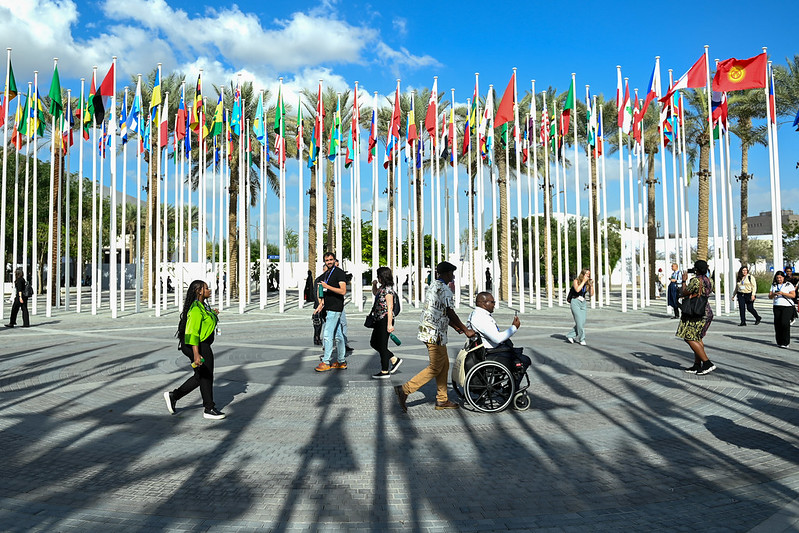
Looking for photos of COP28? We’ve got you covered.
Check out our COP28 photo gallery to download high-resolution images of the conference. We’re constantly updating our flickr with new photos throughout the day, every day.
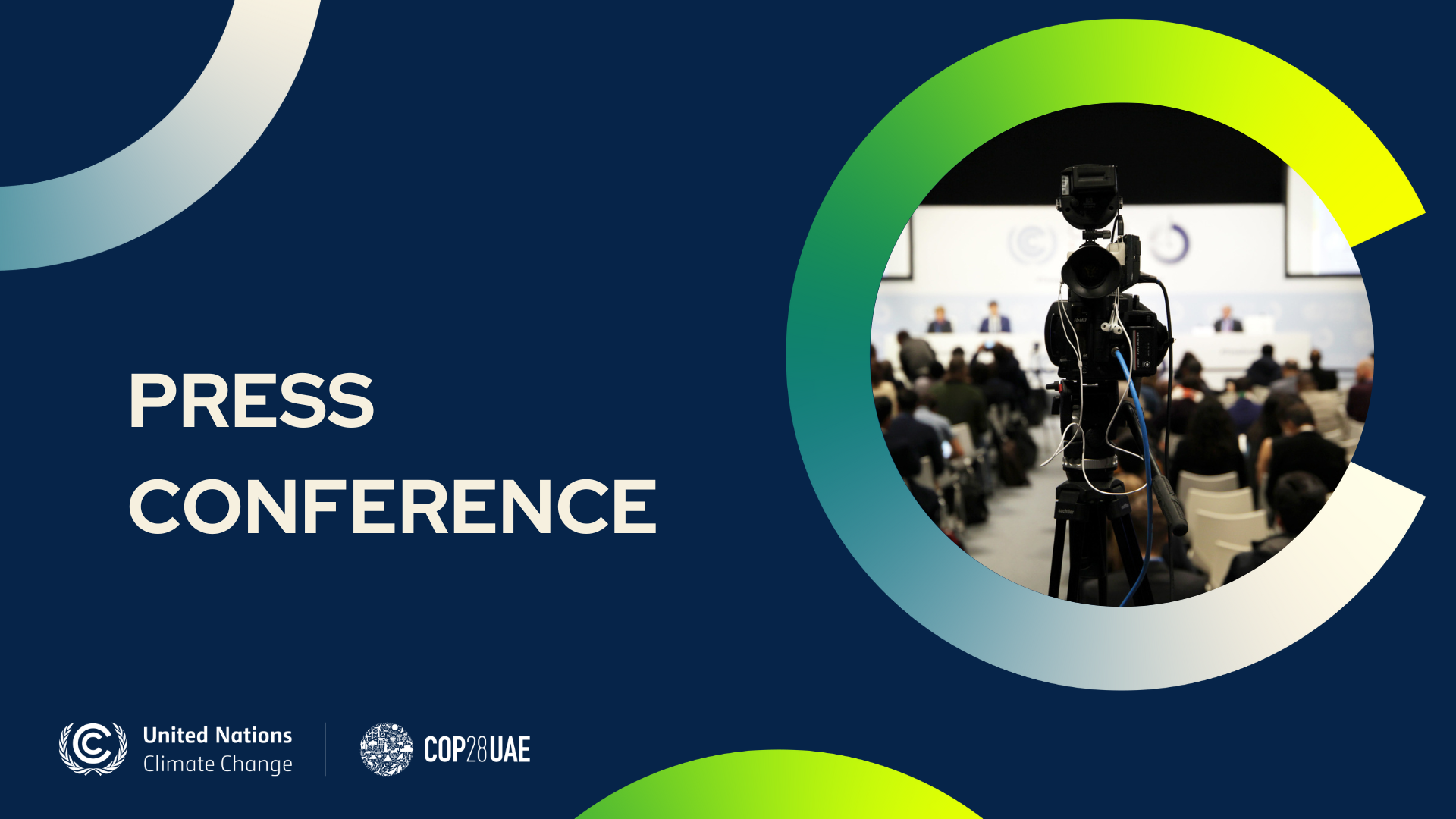
COP28 opened today with an urgent call to speed up climate action.
UN Climate Change Executive Secretary Simon Stiell and COP28 President-Designate Dr. Sultan Al Jaber are giving a press conference to answer questions from journalists.
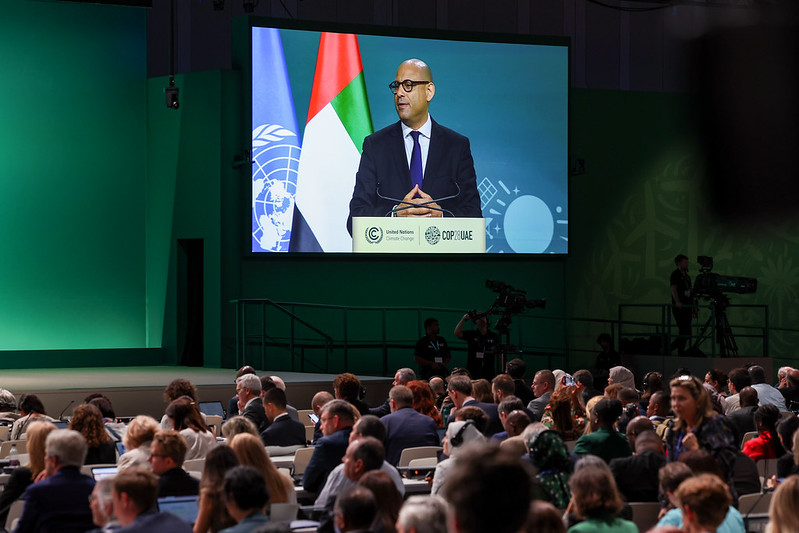
UN Climate Change Executive Secretary Simon Stiell urged delegates at COP28 to accelerate climate action in a powerful speech at the opening of COP28 this afternoon.
“If we do not signal the terminal decline of the fossil fuel era as we know it, we welcome our own terminal decline. And we choose to pay with people’s lives,” he said.

2023 has shattered climate records, accompanied by extreme weather which has left a trail of devastation and despair, according to the World Meteorological Organization (WMO).
Released at COP28 this afternoon, the WMO provisional State of the Global Climate report confirms that 2023 is set to be the warmest year on record. Data until the end of October shows that the year was about 1.40 degrees Celsius above the pre-industrial levels.
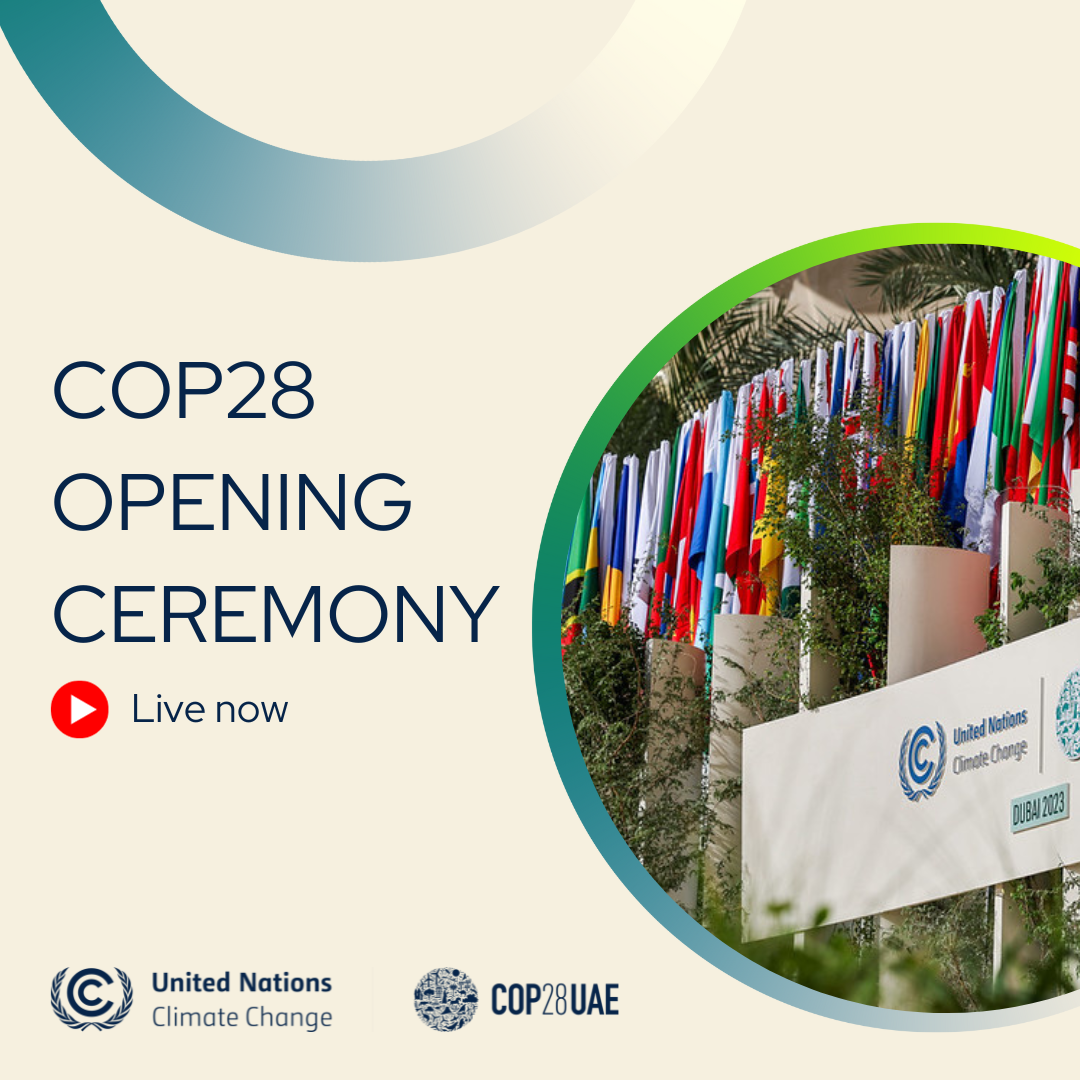
Tune in NOW to watch the opening ceremony of COP28.
Join us as we embark on two weeks of crucial discussions and negotiations to address the global climate crisis.
Starting today and until 12 December, the world comes together to agree on ways to tackle climate change.
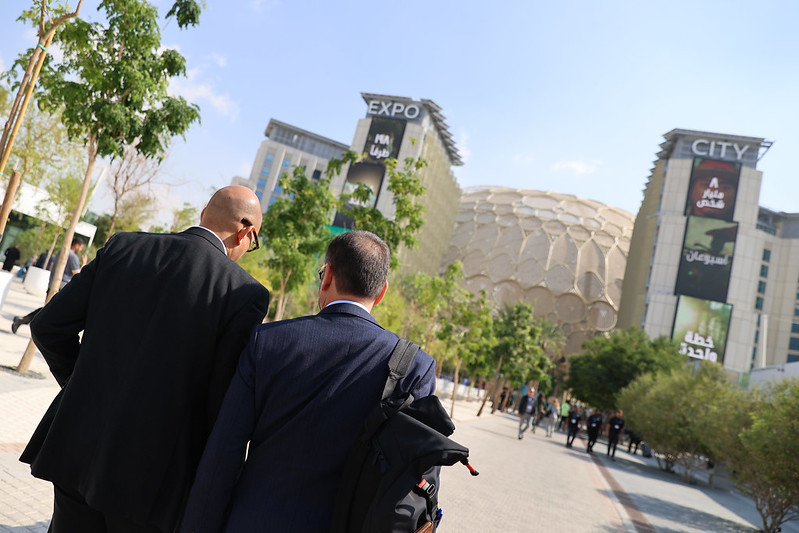
Officially, COP28 stands for the 28th meeting of the Conference of the Parties (COP) to the United Nations Framework Convention on Climate Change (UNFCCC).
COPs take place every year, and are the world’s only multilateral decision-making forum on climate change with almost complete membership of every country in the world.
To put it simply, the COP is where the world comes together to agree on ways to address the climate crisis, such as limiting global temperature rise to 1.5 degrees Celsius, helping vulnerable communities adapt to the effects of climate change, and achieving net-zero emissions by 2050.
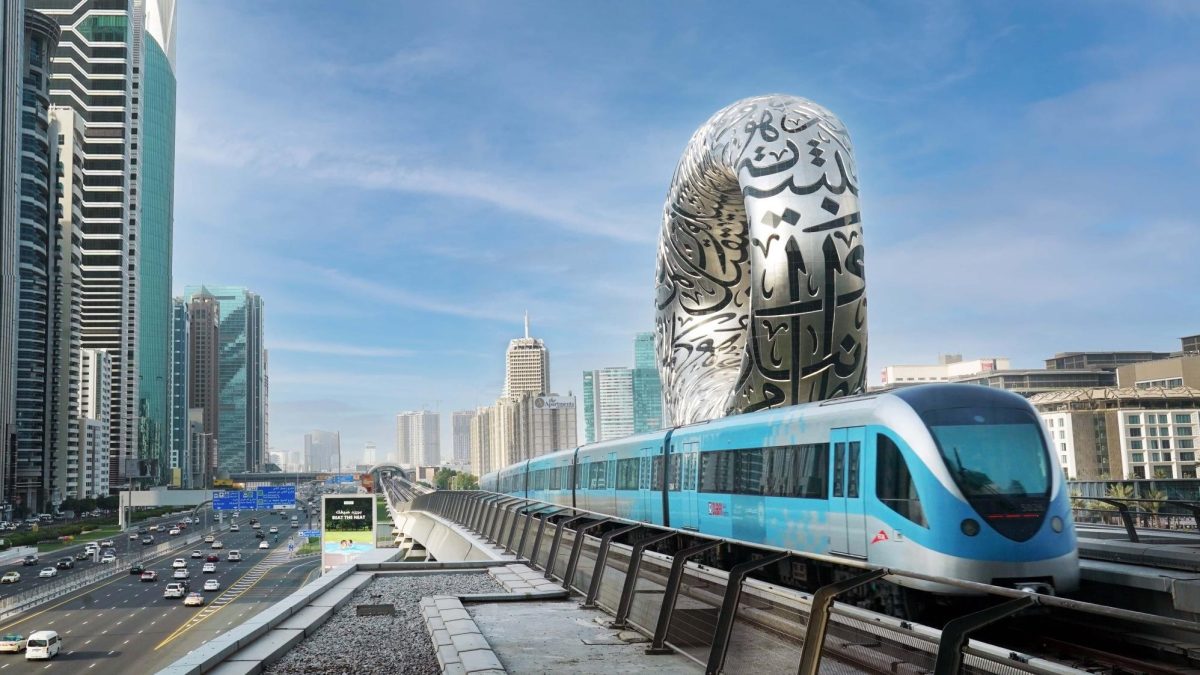
For those coming to COP28 by vehicle, please be aware that we expect road closures and deviations for the next few days. We encourage you to plan your travel with this in mind and use public transportation whenever possible.
Visitors to the Blue Zone and Green Zone can use various transit modes, such as the Dubai Metro and Dubai Bus to travel to the COP28 site. For Blue Zone delegates, free public transportation is available through special edition Nol cards.
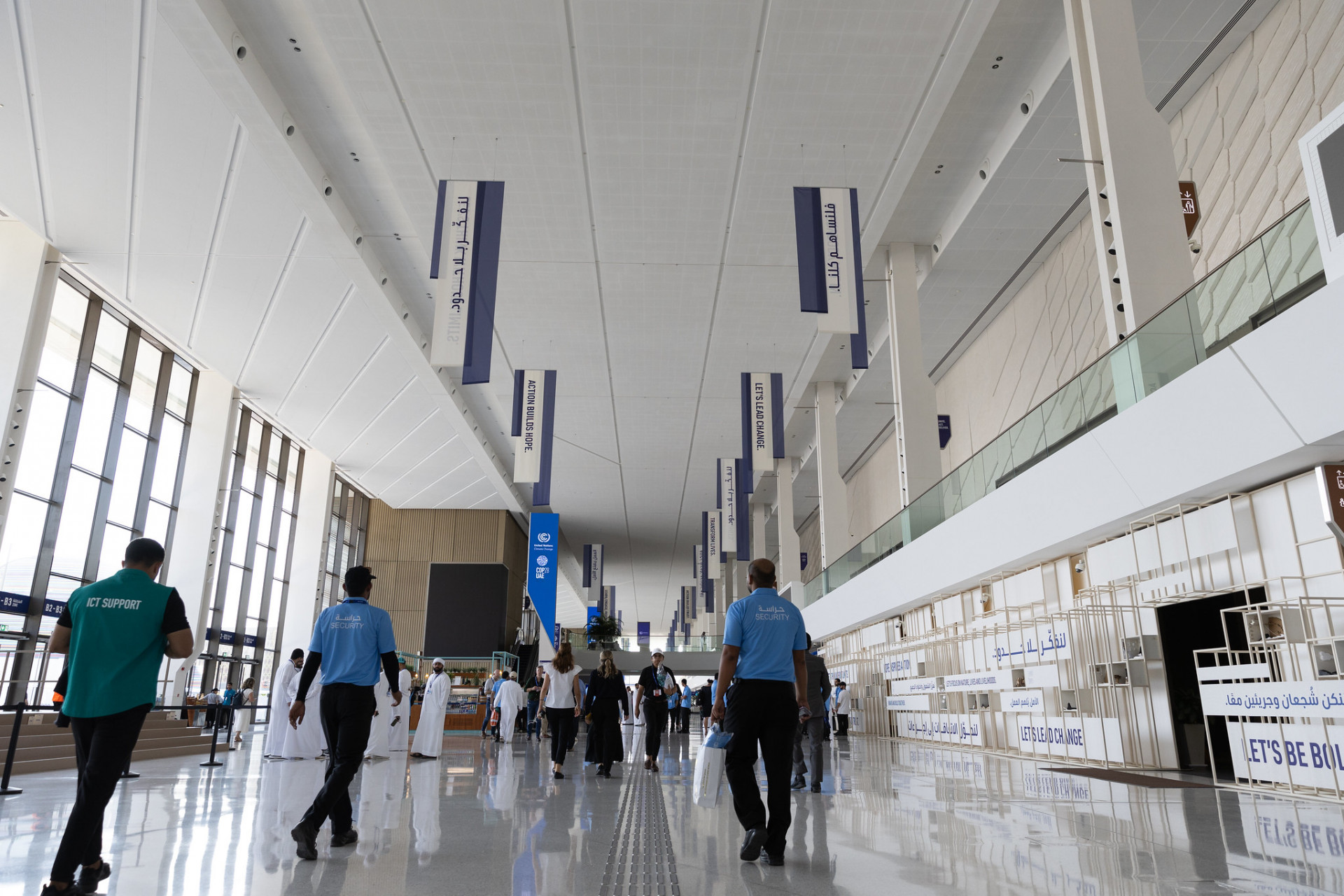
Delegates and participants are arriving at the COP28 venue for the start of this year’s UN Climate Change Conference.
Check the calendar for today: COP28 calendar | UNFCCC
Follow the COP28 opening live this afternoon: Ceremonial opening of COP 28 | UNFCCC
For physical participation, please check the CCTV screens at the conference venue or the virtual platform schedule.
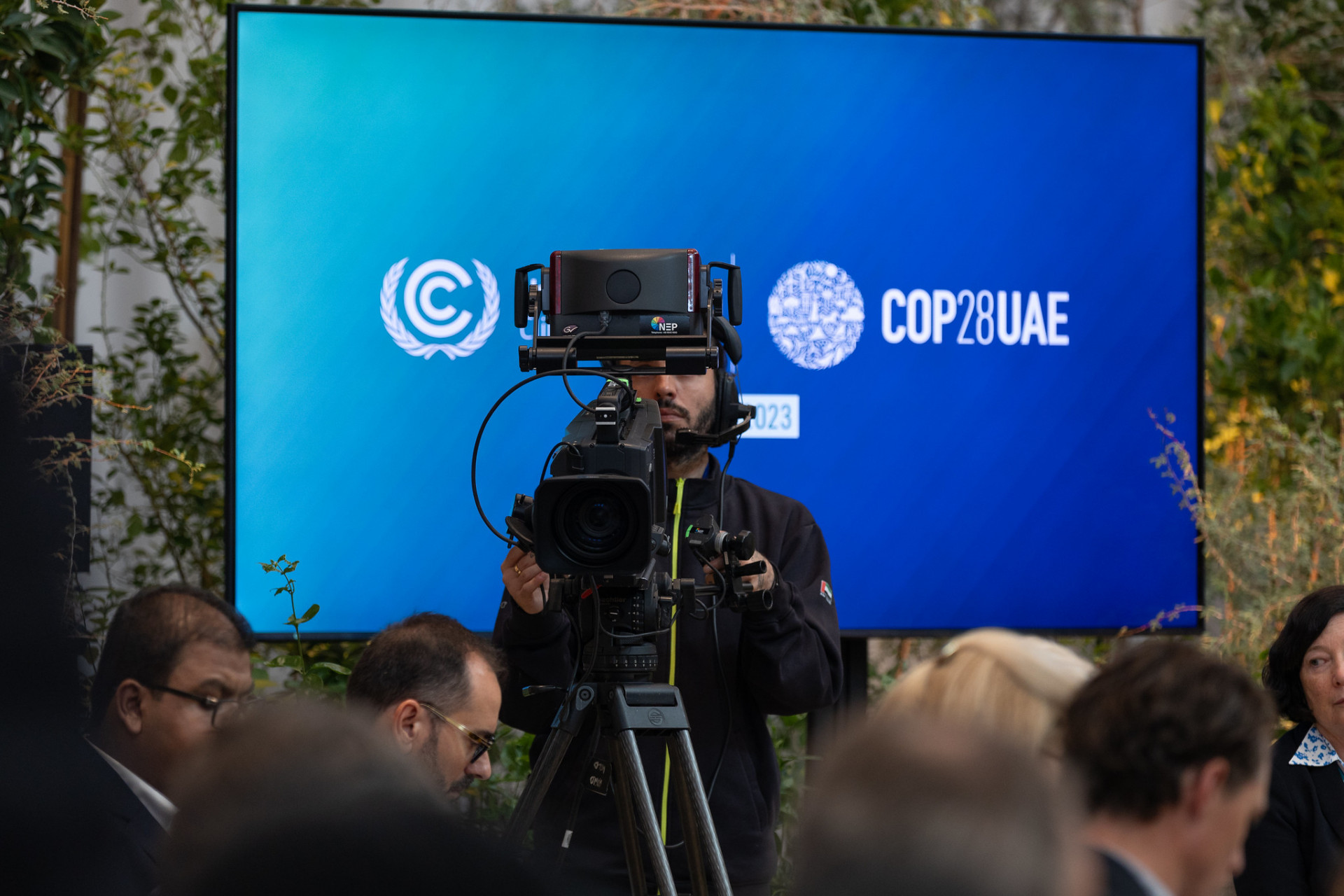
COP28 opens tomorrow with a resounding call to accelerate global climate action.
As the climate crisis worsens around the world, COP28 must be a decisive moment to act on climate commitments and limit global warming to 1.5°C.
Stay tuned for updates, insights and exclusive behind-the-scenes content.
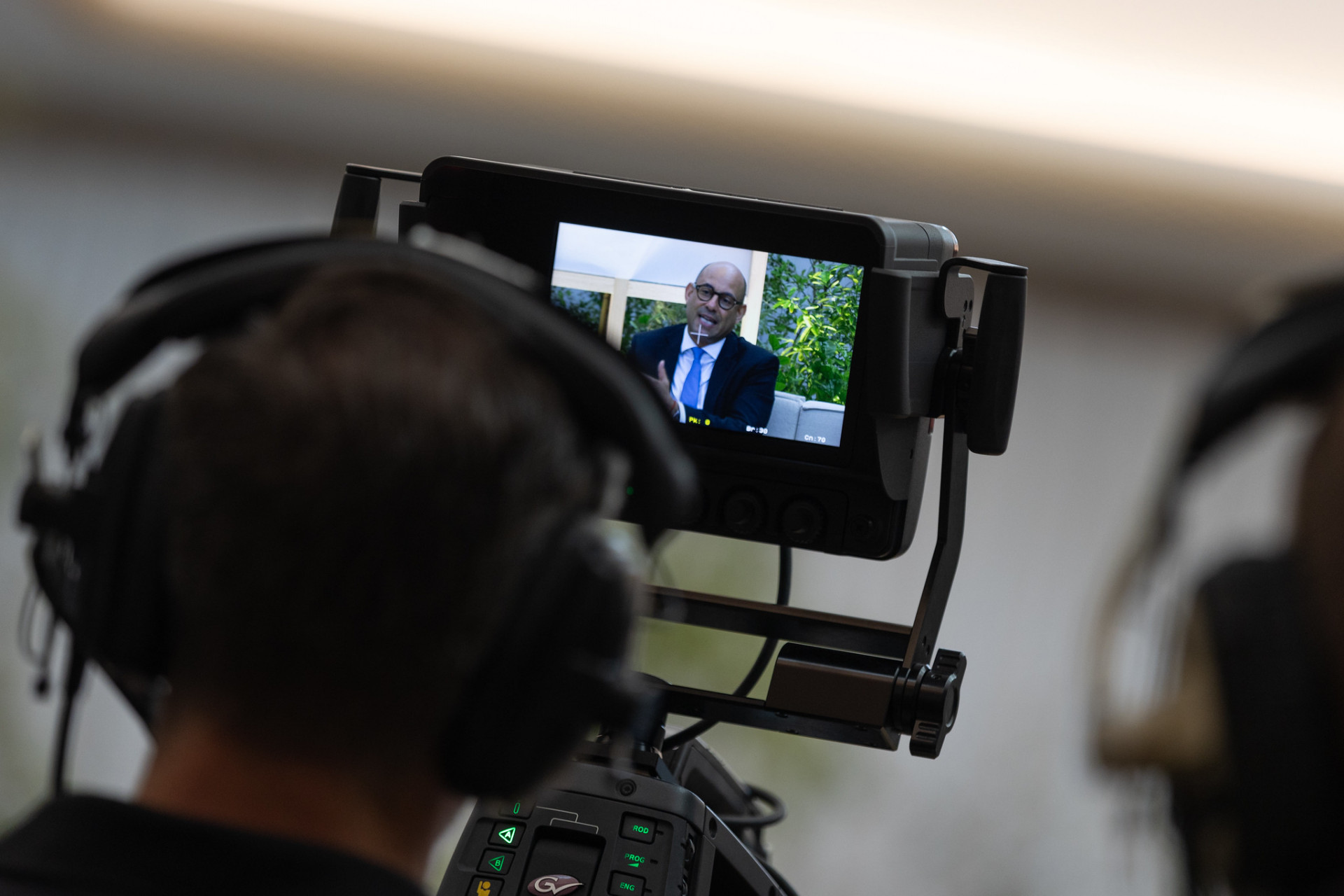
In a message released just now, UN Climate Change Executive Secretary Simon Stiell outlined some of the key priorities for COP28. Here’s a short excerpt:
“It’s great that over 160 world leaders are coming, but COP28 cannot be just a photo-op. Leaders must deliver in Dubai – the message is clear. And as leaders leave Dubai after the opening Summit, their message to their negotiators must be equally clear: don’t come home without a deal that will make a real difference.”

Businesses, investors, cities, states and regions are stepping up to take climate action in greater numbers than ever before – just not at the pace or scale needed to limit global temperature rise to 1.5 degrees Celsius.
This is just one of the key findings of the 2023 edition of the Yearbook of Global Climate Action released at COP28 today.

Don't miss the second day of the Gender and Environment Data Conference!
You can join in person at the COP28 venue (B1, room 1) or online through this link.
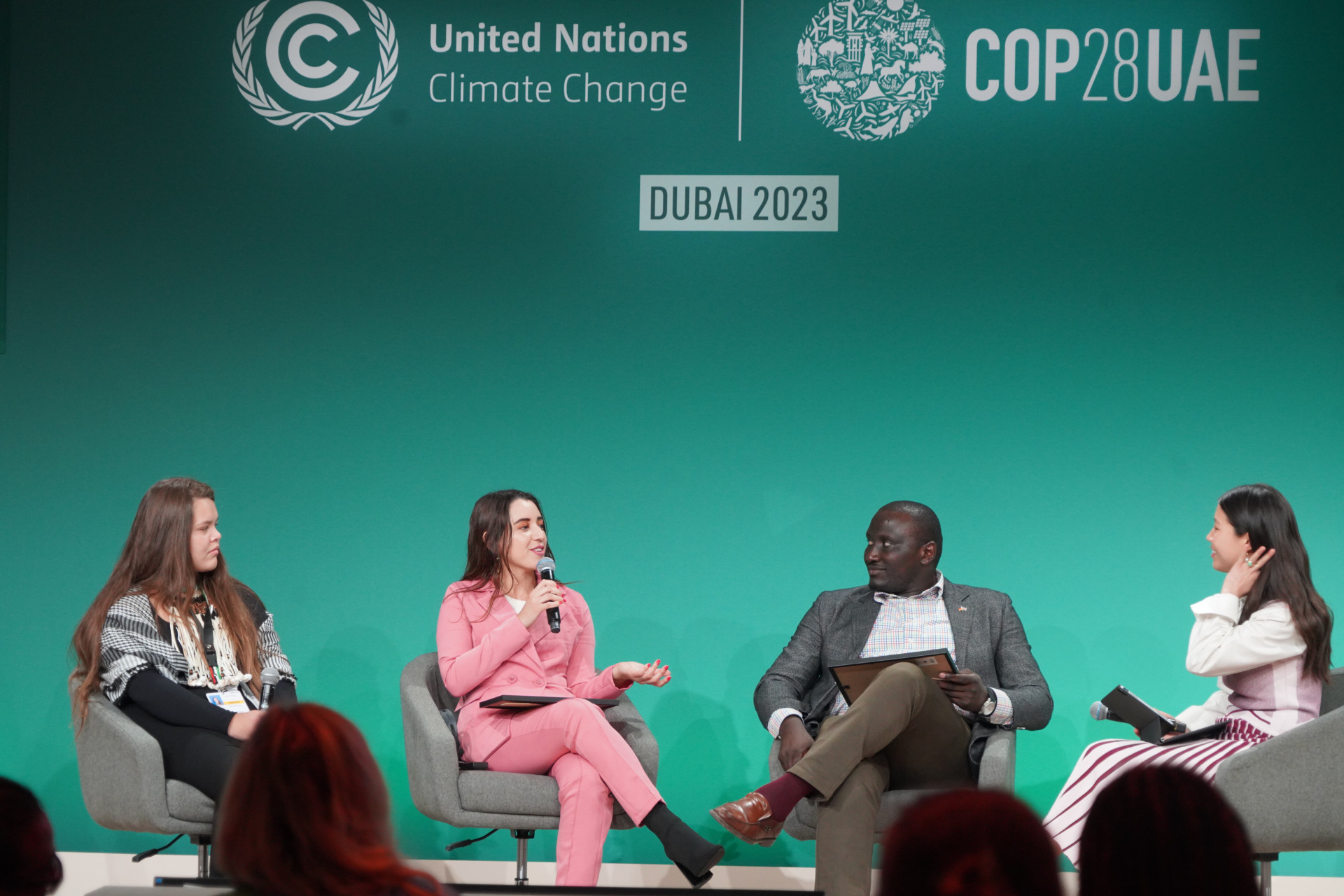
In just two days, delegates from around the world will convene in Dubai, United Arab Emirates, for the UN Climate Change Conference COP28. Get ready for two weeks of crucial negotiations, lively discussions and global collaboration to boost climate action and ambition.